
Project Gutenberg's The Mary Frances Cook Book, by Jane Earye Fryer
This eBook is for the use of anyone anywhere at no cost and with
almost no restrictions whatsoever. You may copy it, give it away or
re-use it under the terms of the Project Gutenberg License included
with this eBook or online at www.gutenberg.org
Title: The Mary Frances Cook Book
Adventures Among the Kitchen People
Author: Jane Earye Fryer
Illustrator: Margaret G. Hays
Jane Allen Boyer
Release Date: December 4, 2011 [EBook #38215]
Language: English
Character set encoding: ISO-8859-1
*** START OF THIS PROJECT GUTENBERG EBOOK THE MARY FRANCES COOK BOOK ***
Produced by Jason Isbell, Emmy and the Online Distributed
Proofreading Team at https://www.pgdp.net

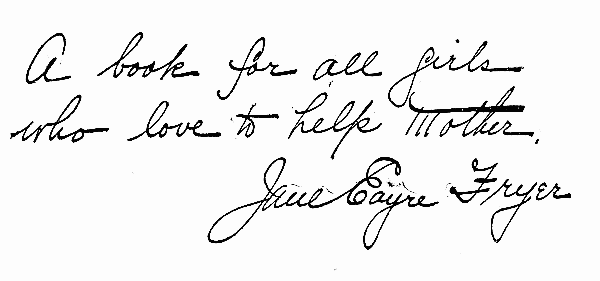
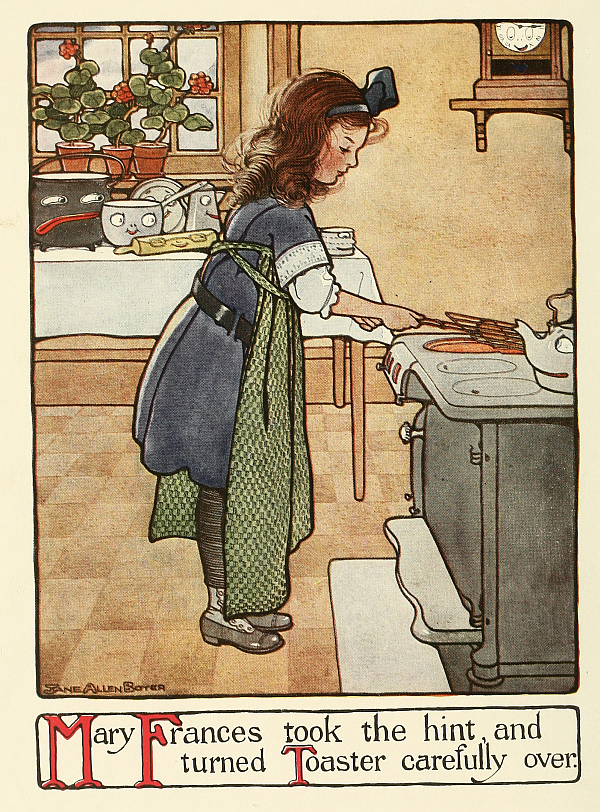
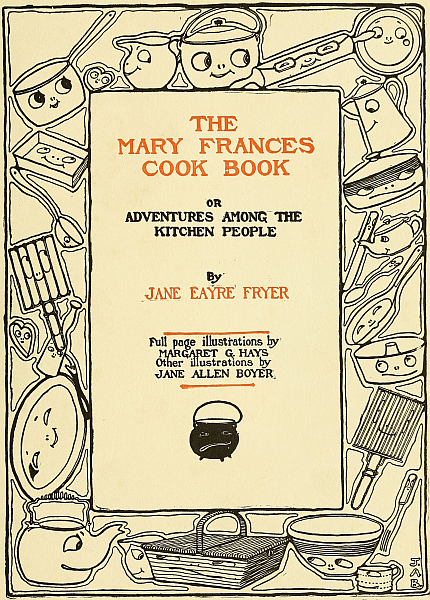

This book tells the story of Mary Frances, a little girl whose great ambition was to help her mother. So anxious was she to do this that even the humble Kitchen People became her teachers and instructors. They talked to her, a thing never heard of before; helped her over the hard places, and explained mysterious secrets she could never otherwise have understood. They wove around a simple little book of recipes her mother had made for her the spell of Fairyland; they led her through a series of delightful adventures such as never happened to any girl before, in which she lived for three whole happy weeks, and out of which she emerged no longer a little girl, but a real little woman.
Some very wise people would call this a story book, some a manual training book, and others a cookery book, but Mary Frances knows better; she[iv] knows that it is a Book within a Book that introduced her to Aunty Rolling Pin and a lot of other dear, dear friends, such as no little girl ever had before, and whom she now wishes to introduce for the first time to all other little girls. (I know that she gained their consent to do this because she told me so.)
In the hope that Mary Frances' wish may be realized, this record of her adventures is sent out to the girls of America with the best wishes of
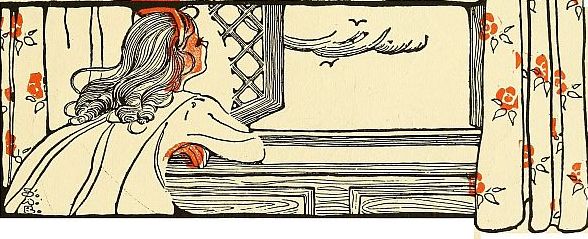
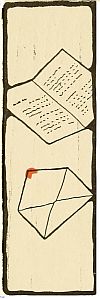
| 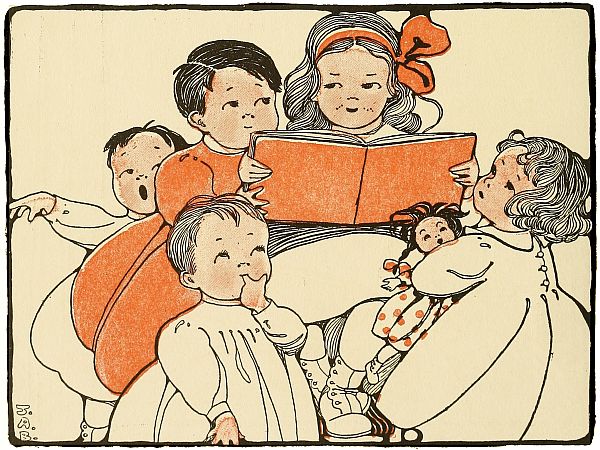
|

| CHAPTER | PAGE | |
| I. | The Kitchen People | 11 |
| II. | Toaster Man | 14 |
| III. | Mary Frances' Mother | 24 |
| IV. | Mary Frances Warns the Kitchen Folks | 27 |
| V. | Aunt Maria | 30 |
| VI. | Jacket-boiled Potatoes | 33 |
| VII. | The Pot-and-Kettle Fight | 40 |
| VIII. | The Potato Lunch | 46 |
| IX. | Mary Frances Gets Breakfast | 56 |
| X. | The Breakfast Burns Up | 65 |
| XI. | A Joke on Aunt Maria | 70 |
| XII. | The Tramp | 75 |
| XIII. | Company to Lunch | 83 |
| XIV. | A Patent Dish-washing | 91 |
| XV. | Thimble Biscuits | 94 |
| XVI. | The Dolls' Kitchen Party | 104 |
| XVII. | The Sick Neighbor | 110 |

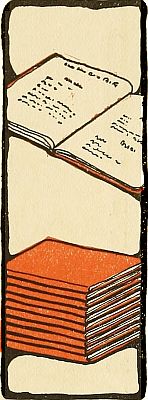 |
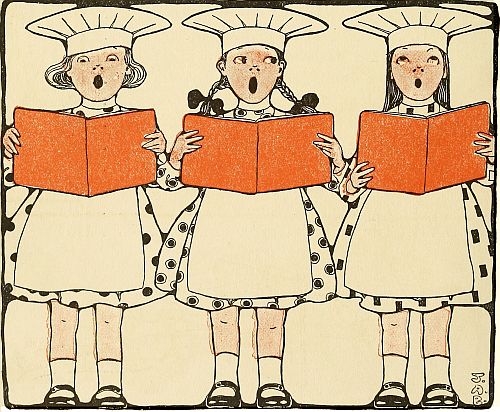
| 
| ||||||||||||||||||||||||||||||||||||||||||
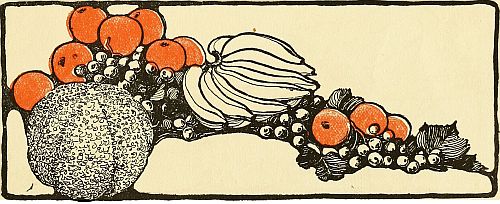
| |||||||||||||||||||||||||||||||||||||||||||
| 
| ||||||||||||||||||||||||||||||||||||||||||
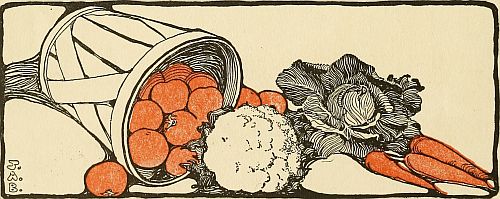
| |||||||||||||||||||||||||||||||||||||||||||
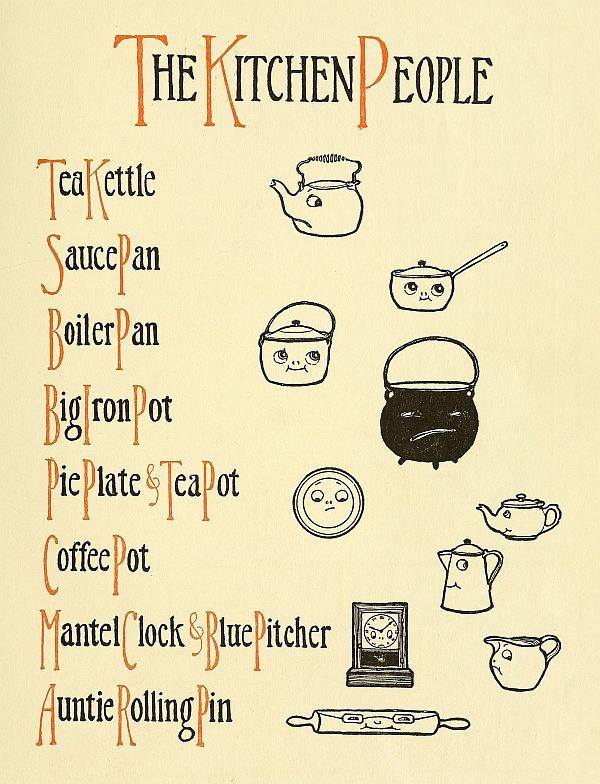
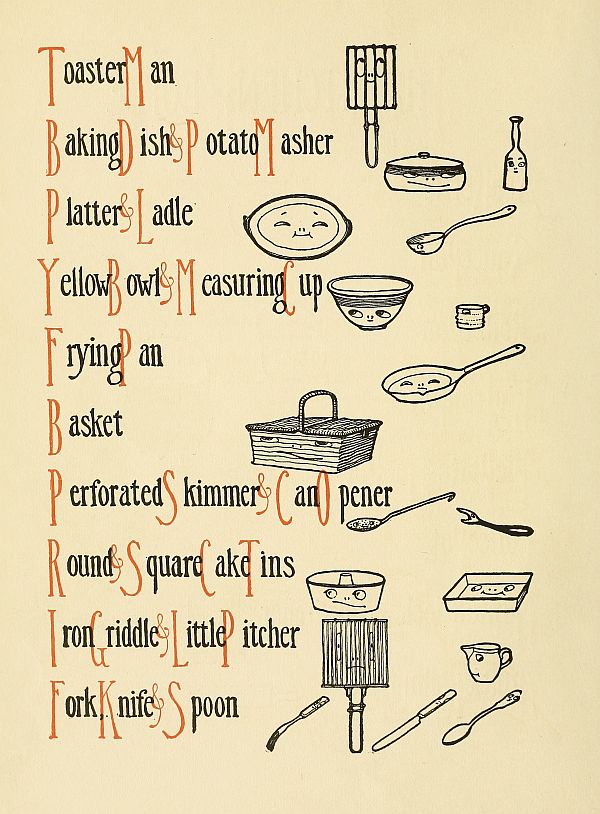

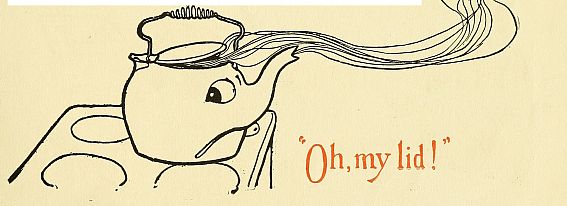
"I see my finish!" puffed Tea Kettle from his perch on the stove.
"That's slang!" snapped Sauce Pan, who sat near by.
"Slang or no slang," said Tea Kettle, "I'll melt if somebody doesn't come fill me soon."
"Where's the cook? Where's the mistress?" asked Boiler Pan.
"Why, the cook's left—left this morning and the mistress's sick. What's that I smell burning?"
"That's the potatoes in the oven," said Toaster.
"Oh, my lid!" cried Tea Kettle holding his nose. "Pour on water! Quick!"
"Whew!" exclaimed Coffee Pot.
"Whew!" cried Pie Plate.
"Whew!" clanged Big Iron Pot.

"Whew!" mimicked Sauce Pan. "Whew!—That[12] won't help! If you say Whew! to an oven door, will it open?—Somebody open the door!"
"Good idea, Saucy!" exclaimed Tea Kettle. "You might try it yourself!"
"Owoooh! O-w-o-o-o-h!" strained little Sauce Pan at the heavy door. "O-w-o-o-o-h! I can't-t budge it! Cauch! Cawc! Ochee!" he coughed. "What smoke! Somebody else come try!"
"Get out of the way, then," said Big Iron Pot, making heavily toward the stove.
"Knew your arms were too short," laughed Tea Kettle, seeing Iron Pot couldn't reach the knob.
"Well, they're as long as yours," said Iron Pot angrily.
"Kick it open!" sug-gest-ed Sauce Pan. "Everybody allowed one kick!"
"First go!" exclaimed Iron Pot.
Whack! came a muffled sound. Then, "Oh, my poor feet! Oh! Oh!"
"What's the matter?" asked Sauce Pan.
"Nothing," said Big Iron Pot, hopping around on one little leg, and holding the other with his hands. "Only I wish you'd had 'First go!'"
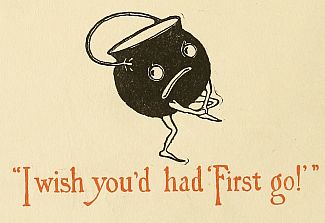

"Well," declared Tea Kettle, "unless help comes soon, we may as well give up all hope of rescue. This is dreadful!"
"Listen, then," ticked Mantel Clock, who didn't mind the smoke. "I know a secret: the dear little girl——"
"Oh, yes, we know!" cried the Kitchen People.
"Well!" asked Mantel Clock, "what do you know?"
"The little girl—that there is a little girl——"
"Is that all you know?" demanded Mantel Clock. "Now, when people interrupt——"
"Just dying to tell," said Sauce Pan in a loud whisper.
"Please, please, tell us the secret," begged the Kitchen People.
"Well," Mantel Clock ran on, "the dear little girl that lives in our house is going to learn to cook. What d'you say if we all turn in and help her?"
"Goody-goody!" Aunty Rolling Pin laughed so she nearly rolled off the table.
Just then the kitchen door-knob turned, and every one of the Kitchen People was as quiet as a
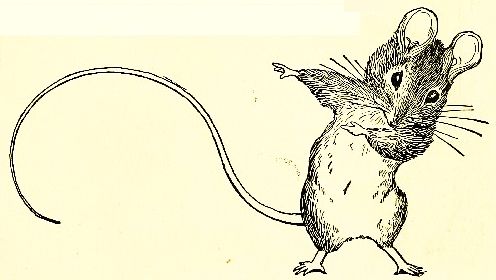

"Oh, you poor Tea Kettle!" she cried. "You'll boil to death!" and she pulled it over to the cooler part of the stove.
Tea Kettle simmered his thanks.
"What can be burning?" she asked. "What can it be?" and she looked all over the stove.
"I do believe it's something in the oven!"
As she pulled open the oven door, out rolled the burnt potatoes.
"Now," she said, "now, for the toast," and she caught up her mother's apron from a hook, and tied it just under her arms, crossing the strings in front.
The Kitchen People held their breath to see what would happen next.
Suddenly she clapped her hands.
"The very thing!" she cried, and ran out of the room. In a minute she was back, with a little book in her hands.
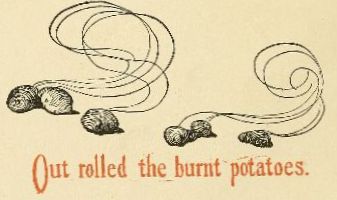
"Mother was asleep," she whispered as though her mother was still in danger of being wakened by any sound—"but I just tip-toed up to the table, and got the book she's been making for my cooking lessons. This must be it—it's Mother's writing:
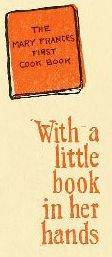
I believe—I just believe it tells about toast. Yes, here it is, right on the first page:
1. Cut stale bread into slices, about ½ inch thick.
2. Remove crusts.
3. Put into wire toaster.
4. Hold over a fire, moving to and fro until a golden brown color.
5. Turn, and brown the other side.
"Let's see if there is any stale bread. I should think so! a whole loaf! Now, I'll cut two slices, and since I want it to be very nice, I'll cut off the crusts. I guess that will be enough; oh, how I wish somebody was here to help me."
"There is somebody—I'll help!"
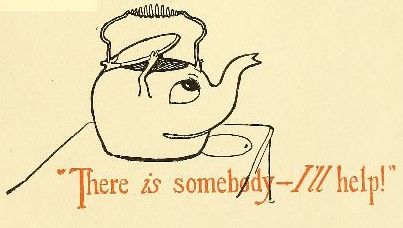
Mary Frances looked round in amazement. Seeing no one, "Why,—where? Why,—who are you?" she asked.
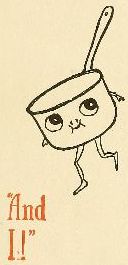
"I'm Tea Kettle, Miss," said Tea Kettle, lifting his lid very politely. "I'm gladly at your service, if you please."
"And I!" It was Sauce Pan.
"And I!" cried Boiler Pan.
Mary Frances could scarcely believe her ears.
"My," she said, "can you all talk? and will you help me? Isn't that grand!—But how you did s'prise me! Won't we have a lovely time!"
"Look at the fire! Look at the fire!"
"What a tiny voice!" thought the little girl,—but she quickly took the lids off the stove. Some very bright coals stared up at her.
"The fire is fine," she said aloud, and she looked all about to find where the voice came from, but she saw no one.
"Look down, please!" said the same tiny voice, this time very distinctly.
There stood the funniest little wire man, no higher than the little girl's elbow.
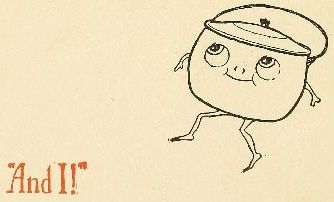
"You didn't see me," laughed the little man, "but I know how to make toast."

"Of course!" said the little girl, "you're—why, you're the Toaster!"
"Yes, ma'am," said the little man, with a bow, "at your service, Miss Mary Frances."
"Try me, and see what I can do," went on Toaster Man. "Just put a slice of that bread into my head, and hold me over the fire."
Mary Frances leaned over and gravely put a slice of bread in Toaster. He looked so funny standing there that she wanted to smile, but thought it wouldn't be exactly polite to so helpful a friend. But when he said, "Slide up my collar," in a thick, smothery sort of voice, she laughed aloud before she could stop, but turned the sound into a cough so quickly that Toaster Man looked up at her queerly only a moment; and she pulled the ring up until it held the bread tightly in place.
"Now, lift me up over the fire!" he demanded.
Mary Frances hesitated—she couldn't tell where to take hold of him.
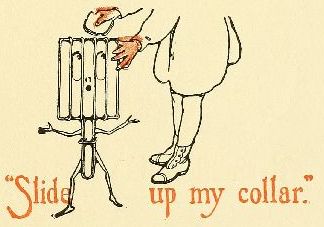
"Never mind my legs," he said, as though he read[18] her thoughts, "I'll see to them," and he folded them up so close that when Mary Frances lifted him up, she could find no sign of them.
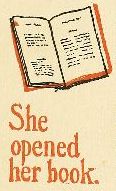
"Oh, you'll be burnt!" she cried, as she held what Toaster Man had called his head over the bright fire.
"Not I," he laughed, "not I. I like it. It's the toast that'll be burnt, if I'm not turned over soon."
Mary Frances took the hint, and turned Toaster carefully over.
"Not too close to the coals at first, Little Miss," said the little fellow. "Now,—closer! That's it!"
"How is it?" he asked, as Mary Frances took him from the fire.
"What a beautiful piece of toast!" she cried.
"Grand-if-i-cent!" exclaimed Toaster. "Now, you do the next piece without my saying a word—but first spread that with butter, and put it in the oven. Now, you read in your book, and see if that's not the way to make Buttered Toast."
Mary Frances opened her book.
"Read it out!" said the little man.
"When I speak that way, Mother tells me to say 'Please,'" said she.
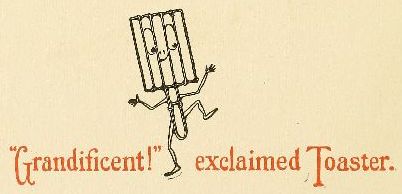
"Beg pardon," said the little man, "Please."
So Mary Frances read:
No. 2.—Buttered Toast.
1. Spread toasted bread evenly with butter.
2. Pile one slice on top of the other, and cover with a bowl.
3. Place in oven.
"That's it! that's what I told you," cried the little fellow. "I'm always right about toast. Can you make the next slice without a word more?"
"I think so," said Mary Frances; and she didn't utter a sound until she had taken the second piece out of Toaster.
"What a beautiful piece of toast!" exclaimed Toaster. "It's better than the first."
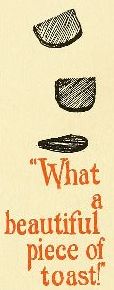
"Oh, I don't think——" Mary Frances started.
"I know!" snapped the little man. "Don't contradict me about toast! By the way," he asked, "why don't you make it into Milk Toast for your mother? it would be softer, and more palat—palat—"
"Pal-a-table," said Mary Frances.
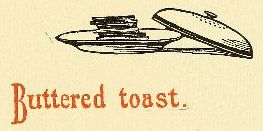
"Yes," said he, "you know a good deal for a little[20] girl,"—and he began to choke. Mary Frances patted him hard.
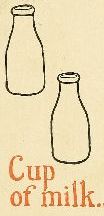
"A piece of toast?" she asked.
"No," he exclaimed in-dig-nant-ly, "a long word always makes me choke. That's why I seldom use them. Now, please read about Milk Toast."
"If you know——" sug-gest-ed Mary Frances.
"Well, it's more like real grown-up people to have it out of a book," said the little man. "Go on!"
And Mary Frances read from her little Cook Book.
| 1 tablespoon butter |
| 1 tablespoon flour |
| 1 cup milk |
| ¼ teaspoon salt |
| 3 slices toast |
1. Make ready the toast.
2. Heat the milk until smoking hot.
3. Melt the butter in a small saucepan.
4. Throw the flour into the butter. Cook until it bubbles a little, stirring all the time. Take from the fire.
5. Pour 1/3 the milk upon the butter and flour, a little at a time, stirring with the back of a spoon to press out the lumps.
6. Place over fire, and gradually stir in the remaining milk.
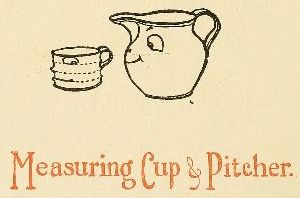
7. Add the salt. Let boil a minute.
8. Put slices of toast in a heated dish; pour the sauce over and serve hot.
All measures are made level with the top of cup or spoon. To measure level spoonful:
Fill spoon heaping full, and level it off with the back of a knife.
For half spoonful, cut through lengthwise.
For quarter spoonful, divide a half spoonful across.
A saltspoon is 1/8 teaspoon.
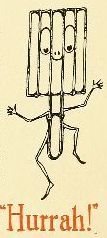
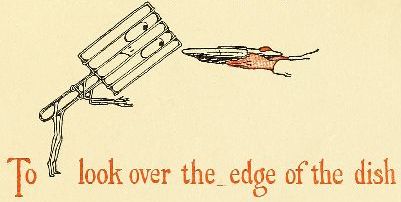
"That's right!" said Toaster Man. "That's the way my grandmother made it. If I were you, I'd make only half of that sauce for only two slices of toast. You did so well with the Plain Toast; you go right ahead with the Milk Toast, and see if you can make it all yourself, and if you need any help, I'll be on the spot in a twinkle. Follow carefully what your little Cook Book says. You know you must measure everything even with the top of the spoon, or cup."
So Mary Frances did exactly what the recipe told her.
As she poured the last of the sauce over the toast, which she had put in a pretty dish, the little man, who had been running here and there, watching everything[22] she did, shouted, "Hurrah!" At least, he tried to shout, but his voice would scarcely reach to a grown-up person's ear. "You are the best pupil I ever had!"
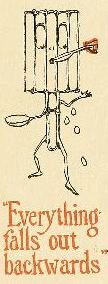
"Have you had many?" asked Mary Frances.
"You are the only one," said Toaster. "Why?"
"Nothing," said Mary Frances.
"I should think," said the little man, standing on his toes, to look over the edge of the dish, "that that Milk Toast would taste awful good!"
"Won't you try it?" asked Mary Frances. She was very much afraid he would, but she wanted to show her gratitude for his kindness.
"Oh, no," sighed the little man, "I never eat."
"You never eat!" exclaimed Mary Frances.
"It may seem strange to you," said the little man, "but everything that is put into my head falls out backwards, and I simply can't eat."
"It must be dreadful!" said Mary Frances.
"It keeps me very thin," complained Toaster, "but if I'm not mistaken, your mother will eat all that toast,—if she gets it while it's hot."
"Oh, I hope so," said Mary Frances; "and I thank you so very very much."
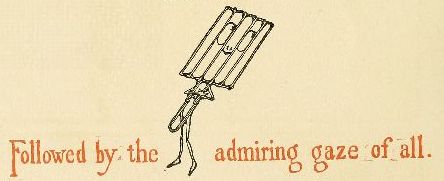
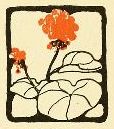
"Good-bye!" added the little girl, as she went out of the kitchen, followed by the admiring gaze of all the Kitchen People.
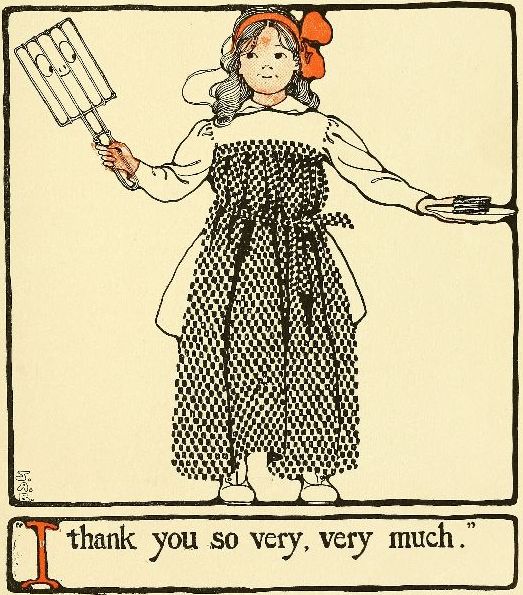
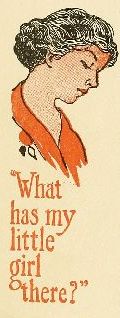
"What has my little girl there?" asked her mother.
"Oh, are you awake, Mother? It's a s'prise for you," and she carried the tray over to the bed.
Her mother carefully lifted the lid of the dish.
"Milk Toast! the only thing I could eat! why—who made it?"
"If it hadn't been for Toaster, it couldn't have been made," said Mary Frances.
Her mother looked at the little girl in surprise.
"I mean," she added, "that Toaster really did it—he showed me how——"
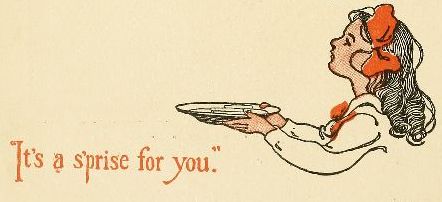
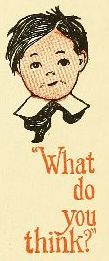
"Oh!" laughed her mother, as she lifted a slice of toast out on a saucer. "Well, dear, anyway I want you to have some toast with Mother"—and she handed the saucer to Mary Frances, who said she would much rather watch her mother eat it than to have some[25] herself; but, after her first taste, she found how hungry she was.
"It's the best toast I ever ate," said her mother, "and Mary Frances, dear, I feel much better already."
She would have said more had not Mary Frances' brother bounded up the stairs two steps at a time with,——
"What do you think! I met Father downtown, and he says Aunt Maria's coming over to keep house for us. In the daytime, she must be at home; but she'll come over to get breakfast for us, and we'll go there for our dinners—and Father says Mother is going to the seashore to have a 'perfect rest' until she's well. Anyhow, I'm glad we won't starve. I wish Sis knew how to cook!" and he teasingly pulled one of Mary Frances' curls.
"Hush, Brother!" said the mother, "you should have been here to see the lovely Milk Toast Sister just brought me. It was the best I ever ate—and she made it all herself."
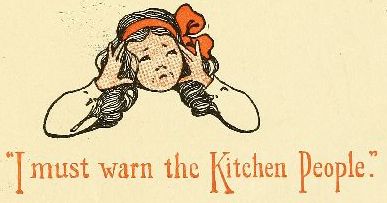
"Almost!" said Mary Frances.
"Oh, yes," said her mother, "the dear little girlie wants Toaster to get part of the praise."
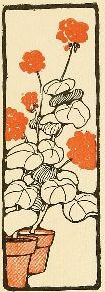
"Ha, ha!" laughed Brother, and Mary Frances, somehow, couldn't explain about the Kitchen Folks.
Instead, "When does Aunt Maria come?" she asked. "Does she come to-night?"
"She's coming right over," answered her brother.
"Oh, oh!" thought Mary Frances, "I must warn the Kitchen People."
"Brother," she began, nervously, "you stay with Mother—I want to take these things down."
But Brother was already sitting quietly near Mother, and Mary Frances hurried softly downstairs.
"The poor dears! The poor dears!" she kept whispering all the way down.
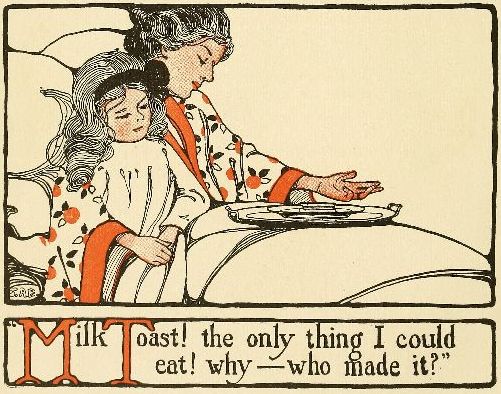

Toaster Man, all tired out, was leaning back in a chair, snoring softly; but all the other Kitchen People were wide awake. It was Tea Kettle that was speaking:
"So, he put the eight feathers in a pan, and cooked them——"
"Who did?" asked Sauce Pan.
"The Jack Rabbit—and then he ate their fringe all off, and gave the bones to the cat. Then he bragged—he bragged that he'd eaten eight whole chickens at once."
"Is that all?" asked Sauce Pan.
"Yes," said Tea Kettle.
"Humph!" said Sauce Pan. "Was that his recipe for Fried Chicken?"
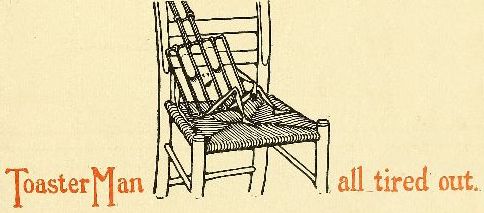
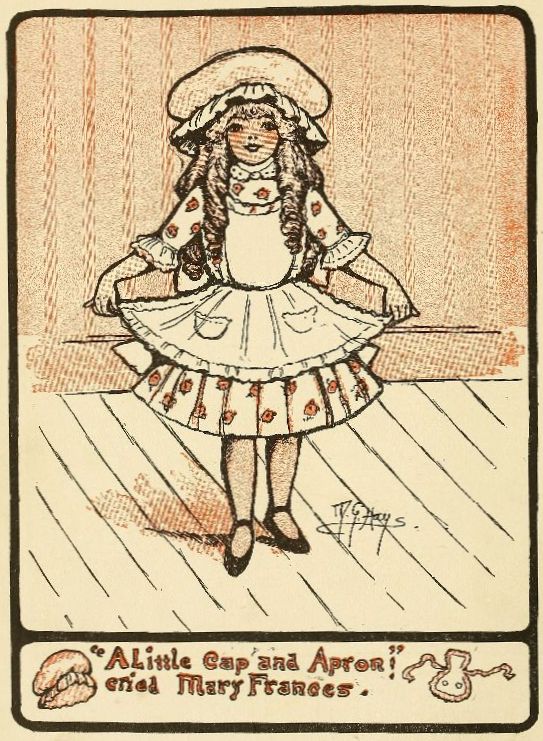

"My, I'd love to hear more about the Jack Rabbit,"[29] thought Mary Frances, "but I must warn them about Aunt Maria"; and she hurried out into the kitchen.
"Listen!" she whispered, with upraised finger. "Listen!—Mother is going away, and Aunt Maria's coming over to keep house. Don't ever say a word—she'll never understand you, and she'll scrub and scour you till you ache, poor things!—she'll do that anyway, but don't talk before her. I hurried down to warn you—I was so afraid you might."
"Never fear," spoke up Tea Kettle; "we never, never talk before 'grown-ups'—we can't help them. I forgot to tell you—if you speak about us to anyone, we can never, never speak again."
"Oh," said Mary Frances, "it's a secret! I'm so glad you told me—I came so near telling Mother about Toaster Man—I might have, only——"
Then the door-bell rang.
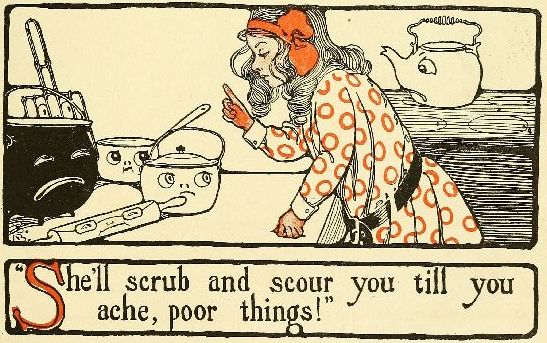

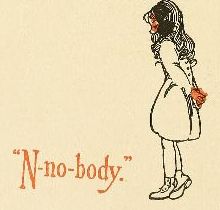
"I put coal on the fire," said Mary Frances.
"I guess I'll take a look at that fire, myself," Aunt Maria continued, as she started toward the kitchen.
Just then, she caught sight of the tray which Mary Frances had brought downstairs.
"Milk Toast," she sniffed. "Who sent that in?"
"I—I made it," Mary Frances began.
There was one tiny piece left. Aunt Maria looked at it hard.
"It's wonderful," she said, "wonderful; who showed you how?"
"Who showed you how?" she demanded, as Mary Frances stood silent.
"N-no-body,—at least, no real person. I read about how to make it in my cook book."

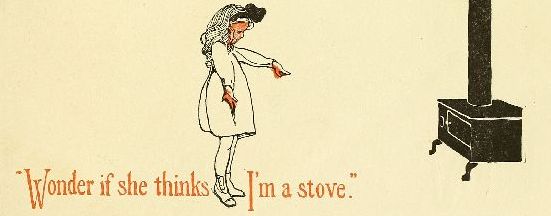
"Your cook book—you mean your mother's cook book."

"No," said Mary Frances, "I mean my cook book Mother's been making for me. I'll show it to you," and she ran to get it. "See!—in Mother's writing—'Mary Frances' First Cook Book!'"
"Well," said Aunt Maria, "you may turn out of some account, after all. It's about time to call for a ref-or-ma-tion."
"Yes, ma'am," said Mary Frances, not un-der-stand-ing the big word—"do you want me to call for it now?"
"Don't be saucy!" snapped the old lady.
Then she set about washing the little girl's hands and face, rubbing so hard that it made the tears come, finishing off with the towel until Mary Frances felt her face shine.
"Wonder if she thinks I'm a stove," she thought. "Maybe she'll black me some day by mistake! I don't believe she knows how old I am—she treats me like a baby, for all the world sometimes, yet she thinks I ought to know more. Queer!"
While Aunt Maria was busy getting dinner, she ran up to her mother's room.
"Mother," she asked, "Aunt Maria will be gone home most of the day time, while you're away, won't she?"
"Yes, dear," said Mother; "you and Brother are to go to her house to lunch."
"Mother, dear," begged Mary Frances, "can't I get lunch for Brother and me? I was going to tell you I read—I found the recipe for the Milk Toast in my little cook book you've been making for me. I came up and found it while you were asleep—I just know I can get our lunches. Please, Mother, can't I try?"
"Well, dear," said Mother, smiling, "I really believe you may. I've just been thinking about the toast, and what a woman my dear little girl is."
Just then Aunt Maria called:
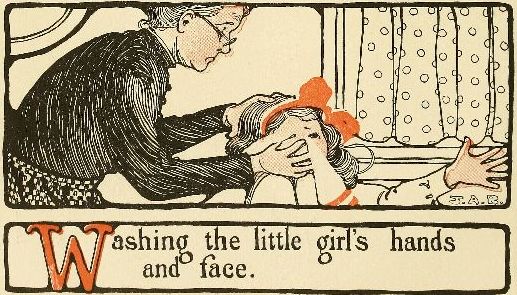

"I'm off to the mill-race, with the boys, Sister,—catch!" cried Billy, tossing Mary Frances the key.
"All right," she called, "be sure to come home to lunch—twelve o'clock."
Mary Frances suddenly felt very lonesome.
"But I'll go home to my Kitchen Folks—they'll be good company," she thought.
When she let herself into the house, how big and empty it seemed! She was almost afraid to go in, but she bravely locked the door behind her.
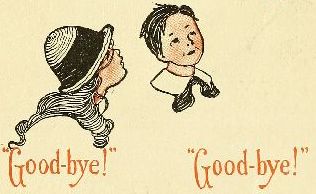
She thought she heard a noise. Surely the curtain moved! Her heart went pit-a-pat! The curtain moved again. Out sprang Jubey, and scampered off into the kitchen.[34]
"Oh, you darling kitten!" she cried, running after her. "How you scared me, Jubey!"

Everything was as neat as a pin. All the Kitchen Folks were in their places, prim, and quiet, and scared, just as Aunt Maria had left them, but when they saw her they brightened up, and smiled a welcome.
"How do you do, Kitchen Folks?" she said.
"How do, little Miss?" merrily sang Tea Kettle.
"H-o-w d-o?" ticked Mantel Clock.
"What in the world shall I have for lunch?" mused the little girl. "That boy will be as hungry as two bears,—and I don't know many things to cook yet. Toast is all right for a sick person, but it isn't much for a hungry boy,—and I ought to make something new. Let me see what my little book says," and she fetched it out of its hiding place.
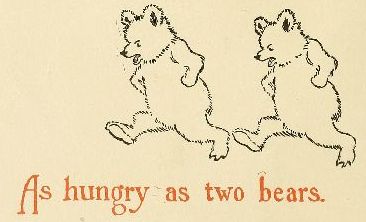
"Oh, I know! I'll make everything! I do hope I get through the book before Mother comes back! Let's see,—here's 'How to Cook Potatoes,' and 'Eggs'; here are 'Biscuits,' and even how to make 'Tarts' and 'Cakes,'—and Goody! Candy! Oh, how I'd love to make candy right away, but Mother said I must make[35] the things in the order they come in the book. So to-day I make
1. Scrub rather small potatoes well.
2. Pare a ring around each the long way; drop into cold water.
3. Drain; cover with boiling water; add 1 tablespoon salt.
4. Let boil about 35 minutes, or until a fork will easily pierce the largest.
5. Drain off all the water, and set pan at back of stove to dry off the potatoes.
6. Serve in their jackets.
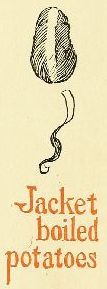
"I wonder how many Billy will eat," she thought, as she brought the basket. "I guess about—about—I don't know. He has an e-nor-mous appetite. I guess I'll cook a hundred."
"He'll never eat a hundred!"
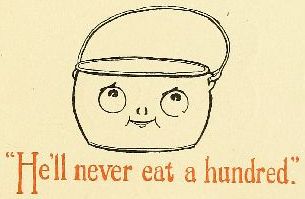
Mary Frances looked around. Boiler Pan was climbing down from the closet shelf.
"Hello! How do you know?" asked Mary Frances. "You never saw him eat."
"Hear that! Hear that!" cried Boiler Pan. "As though I hadn't cooked potatoes before you were born.[36] Eat a hundred? Why, I can't hold a hundred—so there!"
"Ho, ho!" said Mary Frances, "that must be so. How many can you hold?"
"Oh, about thirty, I guess," swelling with pride.
"Well," said Mary Frances, "you've no notion how many that boy can eat, and there isn't much else for lunch. I guess I'll cook about twelve,"—and counting them out, she began to wash them.
"Be sure to get all the sand out of their eyes," laughed Boiler Pan. "But first, will you help me jump up on the stove, and fill me?—then I can boil while you're 'ringing' the potatoes."
This done, he was very quiet, while she finished the potatoes.
Just then the clock struck eleven.
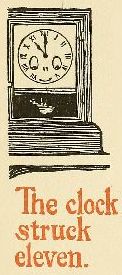
"Why, I must hurry," exclaimed Mary Frances.
"I'm ready," bubbled Boiler Pan.
"Oh, yes, I'm coming," and she dropped the potatoes in one by one.
"Now, put on my hat," said Boiler Pan, and Mary Frances put on the lid.
"Are they all right?" asked the little girl.
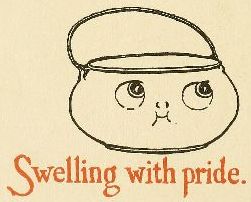
"All right!" he answered in a muffled voice.
Mary Frances then went in the dining-room, and busied herself about setting the table.
Soon, she heard a "rumpus" in the kitchen. She ran out. Bubbles were sputtering over the sides of Boiler Pan, and the lid was dancing a jig.
"What shall I do? What shall I do?" cried Mary Frances, jumping up and down.
"This hat's crazy! Take it off, quick!" Boiler Pan besought her.
Without thinking, she seized the lid with her fingers, but dropped it with a cry of pain.
"I'm scalded, I'm scalded," she sobbed. "What will I do for it?" and she ran for some cold water.
"Don't do that, child," said Aunty Rolling Pin. "Butter it and then powder it with baking soda the way your mother does."

"I'm so sorry," said Boiler Pan, "but I really couldn't get my old hat off. I should have told you to take a holder."
"Never mind, it's better now. Those potatoes must be done. Yes," as she tried them with a fork, "even[38] the biggest is done in the middle. I'm so glad, for I expect that boy any minute."
"So'm I," said Boiler Pan, "for I feel the effect of this stren-u-os-i-ty."
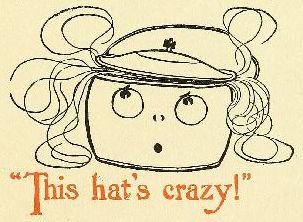
Mary Frances pretended not to notice this speech, but carefully drained the water from the potatoes, and shook Boiler Pan over the fire to dry them off.
"I—I—learned—that—that—wor—word—after year—years—of—stud—study," he said between the shakes, "and you—nev—never—notic—noticed——"
But Billy was knocking.
So Mary Frances, hastily putting Boiler Pan on the back of the stove, ran to let him in.
"Hello, Sister! Here we are! Lunch ready?"
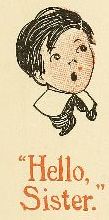
"Yes, all ready. I'll put it on. You sit in Father's place, and we'll play we're grown up."
"Scrumptious!" exclaimed Billy, as Mary Frances set the smoking dish of potatoes on the table.
"What an excellent cook you must have, Madam," he said, after his first taste. "Such good potatoes!"
"I have ten," said Mary Frances.
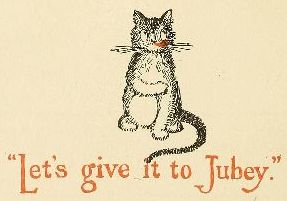
"Ten! You are fortunate, indeed, Madam," said[39] Billy, for all the world as though he were a grown-up young gentleman. "How quiet they keep."
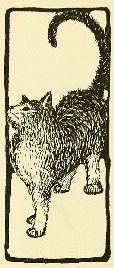
"Yes," laughed Mary Frances, "but they're 'most always busy," and she held up her ten pink little fingers.
"Oh, Billy," she added earnestly, "I'm so glad you like them—the potatoes, I mean. There is only one left—won't you have that?"
"Oh, let's give that to Jubey—Jubey might be hurt if you didn't let her try them. I would,—if I were Jubey."
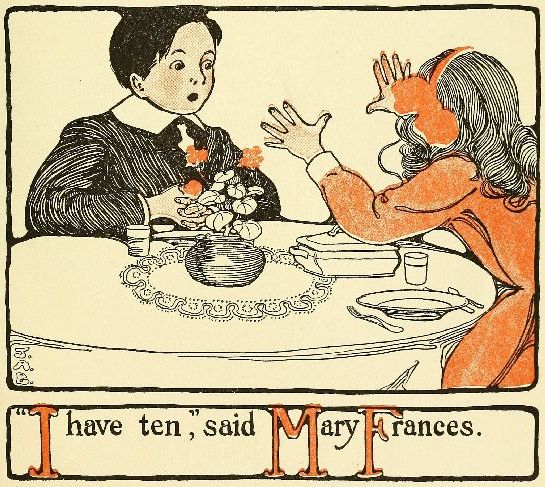
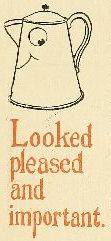
The Kitchen People looked pleased and important, too.
"You see, it's this way," she continued as she took her little book and sat in the rocking chair. "I am very anxious to get through every recipe in my cook book before Mother comes home, so I guess we'll just finish all the potato recipes to-day,—and give Billy a Potato Lunch! Won't that be fine?"
The Kitchen People all smiled in approval.
She went to the window.
"O—h, Billy! Billy!" she called; "you're invited to a Potato Lunch in our dining-room at twelve o'clock."
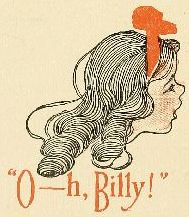
"All right, I'll be on time," answered Billy from the garden.
"Let's see," said Mary Frances to herself, "four[41] more recipes—about two potatoes each. Four times two,—eight."
She washed the potatoes carefully, and had no sooner set about paring them, than the kitchen door opened, and in walked Aunt Maria.
"What in the world is that child doing? Paring potatoes? Did I ever!—Such thin, close parings, too! How well she does it!—But you must drop them into cold water as soon as they are pared, child. I wish I could stay and show you how to cook, but duty calls me—I must be going!"

Mary Frances stepped to the door with her.
"When I was your age, child, I could cook 'most everything and piece patch-work for quilts,"—and she kept Mary Frances on the porch ten minutes, telling her that little girls weren't brought up any more to be useful the way they were when she was a little girl.
"Oh, my lid!" sang Tea Kettle, as Mary Frances stepped back into the kitchen. "Oh, my aunt!—has the old lady went?"
"Gone!" said Big Iron Pot from the back of the stove.
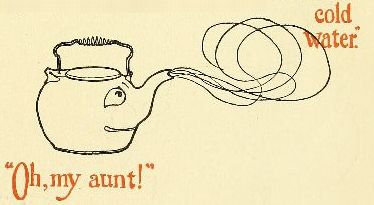
"Who dares correct me?" simmered Tea Kettle.
"I dare," sputtered Iron Pot. "I dare,—and I dare tell you other things, too!"

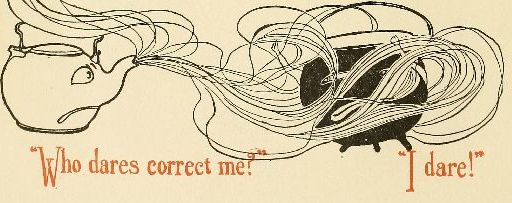
"You do, do you?" bubbled Tea Kettle. "You do! Well, what do you dare tell me?"
"I dare tell you, Mister," said Iron Pot, "that you've got a dirty face—yes, a black face."
Tea Kettle, it was plain to be seen, was boiling mad. Steam blew out of his nose in every direction.
Now, everybody who knows anything about a tea kettle can imagine how very angry Tea Kettle was.
As soon as he could get his breath, he blew steam all over Iron Pot.
"My face is black, is it? Well, yours is black,—and it will soon be black and blue!"
"You swallow them words!" and Iron Pot raised his queer little fists.
"Sput!" mocked Tea Kettle, getting ready to spout again. "Take that!"
Wang! came down the little fist,—but not on the lid of Tea Kettle. Oh, no; for just as that was going to happen, Mary Frances lifted him high in the air.[43]

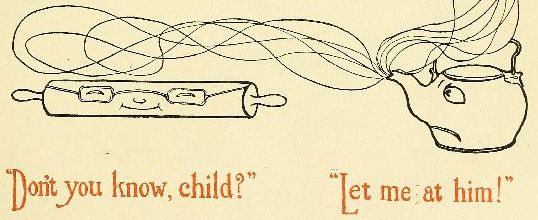
"Let go of me! Let me at Iron Pot!" He was at white heat.
"Be quiet!" said Mary Frances, shaking him quite hard. "What's all this about?"
"Iron Pot commenced it!" sullenly simmered Tea Kettle. "Iron Pot called me names!"
"Why," said Mary Frances, "this is disgraceful! Now, you sit there!" She put Tea Kettle on the front of the stove.
"And you, there!" She pulled Big Iron Pot as far back as she could.
"Now, behave yourselves!"
Then she sat down to rest.
"What makes them quarrel so, I wonder," Mary Frances said half to herself. "All the Kitchen People seem so kind and helpful."
"Why, don't you know, child?" asked Aunty Rolling Pin. "I thought everybody knew that story."
A story! Mary Frances was always ready to listen to a story.
"Won't you tell me, please?"
Aunty Rolling Pin cleared her voice, and rolled[44] back an inch or two to a more comfortable place on the table.
"You see, it's this way, child," she began.
"In the days of your great-grandmother there were no stoves, only open fireplaces were used for cooking,—and kettles were just as black then as that old black Pot there.
"So, when the Pot called the Kettle black, the Kettle said:
"'Black yourself!' and no harm was done.
"But when your mother got that fine new cook stove, she bought that bright, shiny Kettle, too.
"But that silly old Pot doesn't know that the new Kettle is bright and shiny, so it keeps on calling names. That Pot doesn't know it's fooling itself,—for all it sees is its own homely old black self in the shiny Kettle making faces.
"And that's what comes of calling names, child," chuckled Aunty Rolling Pin, as she ended her story.
Then Mr. Tea Kettle puffed steam importantly, and clapped his little lid.
Nothing more was said in the kitchen for several seconds.[45]
"Thank you!" at length said Mary Frances gratefully to Aunty Rolling Pin.
Then she added, very firmly and gently to Iron Pot and Tea Kettle:
"I want you to promise me never to call names again, either one of you, for it makes me feel so sad.
"Do you promise?" she asked.
"I promise," brightly answered Tea Kettle.
"I pro-promise," solemnly declared Big Iron Pot.
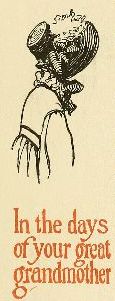
| 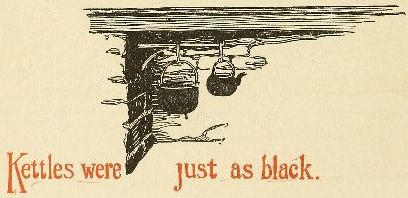
|
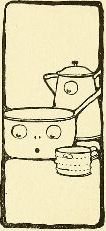
| 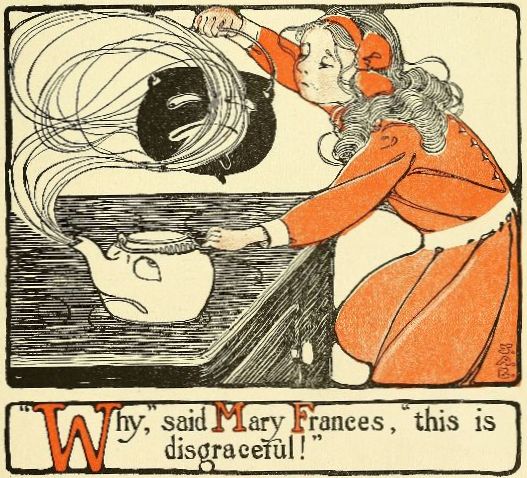
|
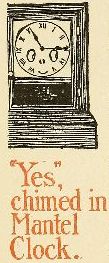
"Now, I can hurry along the Potato Lunch."
"Yes," chimed in Mantel Clock, "it's quarter past eleven. You have only three-quarters of an hour."
"That's so!" said Mary Frances. "The next recipe is:
1. Choose potatoes of the same size—rather large.
2. Scrub well, and wipe.
3. Bake in a hot oven from 30 to 45 minutes, or until soft when pressed between thumb and fingers.
4. Roll each between the fingers: this makes them mealy.
5. Serve on a napkin.
"Why, I won't need to pare those! I'll put two of these I've washed in the oven. The oven's grand and hot!
"Let me see,—will all the others need paring?
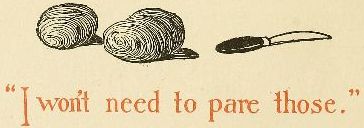
"Yes," she laughed, "I didn't notice the heading of the chapter before——
"'Potatoes Without Jackets,'"

1. Wash potatoes.
2. Pare, throwing into cold water.
3. Drain; cover with boiling water, allowing 1 tablespoon salt to every twelve potatoes.
4. Let boil ½ hour, or until the largest is soft when pierced with a fork.
5. Drain off all the water.
6. Shake over fire, or place on back of stove to dry off the potatoes.
1. Boil potatoes. Drain; dry off.
2. Mash in pan in which they were cooked.
3. For every cupful, add
| 1 dash pepper, |
| 1 saltspoon salt, |
| ½ tablespoon butter (scant). |
4. For every cupful, heat 2 tablespoons milk.
5. Throw the heated milk on potatoes.
6. Beat with a wire fork until creamy.
7. Pile lightly on a hot dish. Serve uncovered.
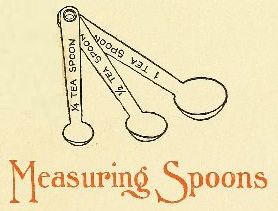
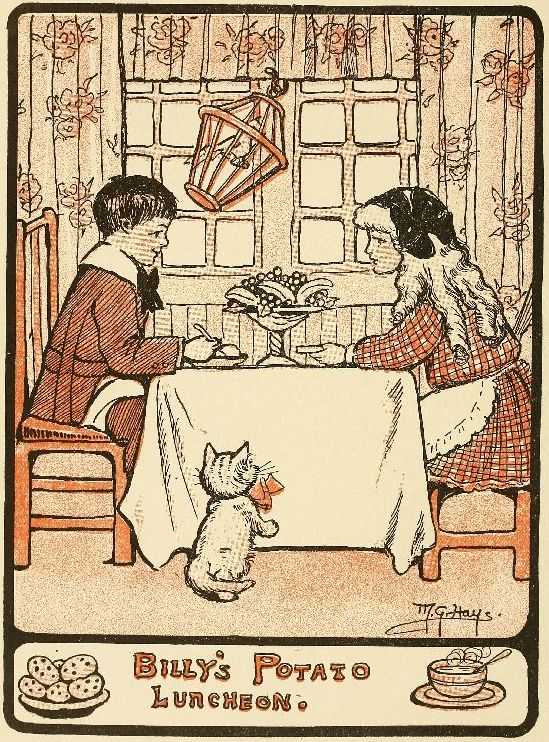
Note.—Remember that all measurements are level or even with the top. To divide a spoonful, cut it through the middle lengthwise, for a half; and across that, for one-quarter of a spoonful.
Place on the table:

| 3 freshly boiled potatoes |
| 1 onion |
| butter |
| parsley |
| flour dredger |
| pepper |
| salt |
| 1 pint milk (2 cups) |
1. Put the milk in the upper part of a double boiler, half filling the under part with boiling water.
2. Throw in 2 slices of onion, and put double boiler on the stove for 10 minutes.
3. Mash potatoes and add to the hot milk.
4. Add 1 teaspoon salt and a dash of pepper.
5. Put through a wire strainer, rubbing the potatoes through with a spoon.
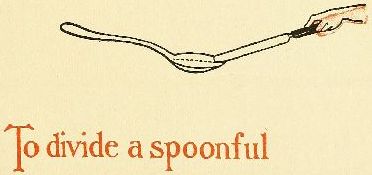
6. Put into double boiler and place on stove.
7. Melt 1 tablespoon butter in a little pan.
8. Throw into it ½ tablespoon flour. Stir well.
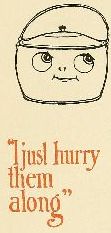
9. Dip a little of the hot milk on this, stirring well, then pour into the soup.
10. Let boil 10 minutes.
11. Add 1 tablespoon chopped parsley. If too thick, add hot water or milk.
12. Serve very hot.
"Oh, I know how to cook boiled potatoes! They're just like jacket-boiled, only they have their jackets off," she cried.
"Why, certainly," exclaimed Boiler Pan, which she had put on the stove half full of water, "I know my part—I just hurry them right along in a jiffy."
He looked so interested that Mary Frances laughed as she dropped the potatoes in.
"Are they all to be boi—boiled?" stuttered the bubbling Boiler Pan.
"Yes," said Mary Frances, "all except those I put in the oven. Listen! I'll tell you the menu for Billy's Potato Lunch. We'll begin, of course, with soup—Potato Soup."
"'Purée' is the word for thick soups," suggested Boiler Pan. "It seems more stylish, don't you think?"
"Yes, indeed!" said Mary Frances. "I do believe I'll write a card for each of us to have at our places at the table!" and she quickly brought her school pad from her desk.
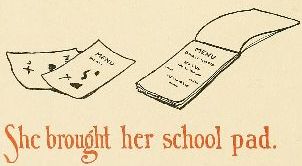
Then she wrote:
"That 'Potato-in-the-Shell' sounds 'swell,'" said Coffee Pot, "but it seems to me you ought to have something to drink, like coffee, or something of that kind."
"Oh, that's true," Mary Frances replied, "but I don't know how to make coffee, and Mother said I must make everything in the order it came in my book——"
"Won't you look to see if my turn doesn't come soon?" interrupted Coffee Pot.
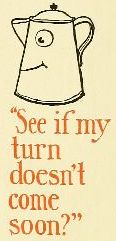
"Not to-day," Mary Frances shook her head. "To-day we have milk.
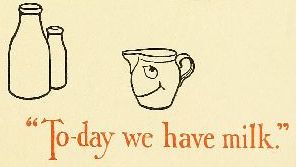
"Why, to-morrow!" as she looked in her book.[52] "Isn't that fine! But—those potatoes must be done. I should think so! A minute more, and they'd have been burned!" she said as she drained off the water.
"Now, ready for the masher!"
"Quite ready," said a little voice, and Mary Frances was not surprised to see Potato Masher tumble over the edge of Boiler Pan as she put him on the table.

"Push my head down hard!" said he in a thick, mushy voice, and Mary Frances did as he directed.
Suddenly Potato Masher stopped work.
"How will you know how much potato to put into the soup?" he asked.
"Why," said Mary Frances, "there were only six boiled ones altogether, so the three for the soup will be just half."
"Pretty good, pretty good for a little girl just learning to cook," Potato Masher said, and ducked his head into the potatoes again.
When they were finished Mary Frances said:
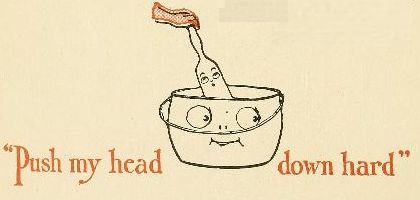
"You know so much about potatoes, perhaps you can sit right up on that box," pointing to the sugar box, "and tell me when I make a mistake. I'm going[53] to do 'xactly as my book says—you cry out, 'Stop!' when I do anything the wrong way."
"It—will—be—the—day—of—my—life—ever—to—be—remembered—"
Potato Masher ran his words together clumsily—"But I should be very much obliged to you if you would first wash my face."
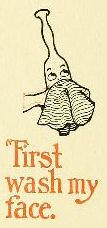
"Why, certainly," said Mary Frances. "I didn't like to suggest it."
"Thank you kindly, Miss. 'Tis a pleasure to serve you," said the little fellow, as he perched himself on the sugar box, when Mary Frances brought him back to the table.
"All ready?" asked the little girl.
"Class proceed!" said Potato Masher, with a school teacher air.
Only twice did he interrupt her as she followed every direction given in the recipes: once, to remind her of the potatoes in the oven; and again, to tell her to pour the soup very slowly, lest she burn herself.
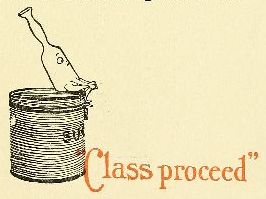
"It's mag-nif-i-cent!—this Potato Lunch," said he, as Mary Frances carried the last smoking dish to the[54] dining table. "'Tis a proud day for the 'Assistant Chef'—meaning myself."
He made a pompous little bow toward the Kitchen Folks.
"I little thought she'd be on time. I was afraid I'd have to strike before she was ready," declared Mantel Clock, beginning to strike twelve just as Billy came in.
"Menus!" exclaimed the boy.
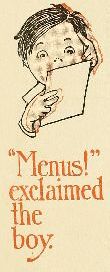
"Jimminy! 'Billy's Potato Lunch,'" he read. "Oh, I say—if I'd known I'd have dressed for the occasion!"
"Don't make fun, Billy," begged Mary Frances.
"'Make fun,'" cried Billy. "Just taste that soup—and see if anyone could make fun. It's fit for the President."
"Oh—Billy!" Mary Frances laughed.
"Maybe you think I don't mean it," said Billy, helping himself to mashed potatoes. "Why didn't you invite some company?"
"I didn't know that Potato Masher—I mean, I didn't know it would turn out so well," blushed Mary Frances.
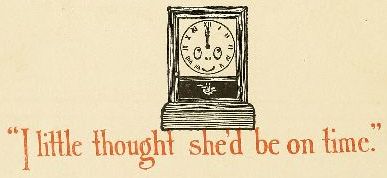
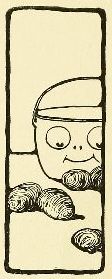
"Invite somebody—can't I bring Bob and Eleanor over some day soon to lunch?"
"Yes,'" said Mary Frances, "if Aunt Maria——"
"Oh, by the way," said Billy "I 'most forgot! Aunt Maria had word her brother is sick at Upland, and she went to see him this morning, and can't possibly be back in time for breakfast. I guessed we'd make out O. K. I told her—I was thinking of our lunches, you know."
"Billy—really?" asked Mary Frances, "but I'm sorry for Aunt Maria's brother."
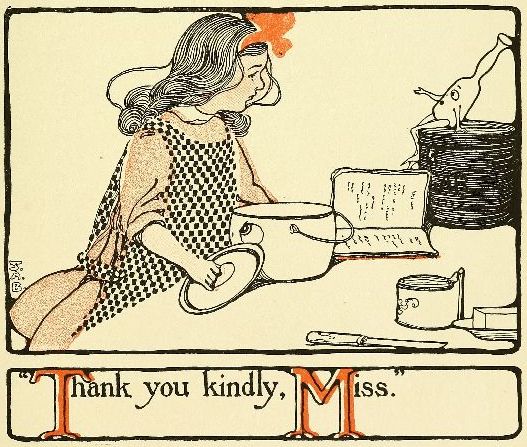
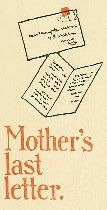
She had her little cook book, and Mother's last letter under her pillow.
"Billy writes your lunches are 'scrumptious,'" ran her mother's letter. "I cannot tell how much comfort my little girl is to me."
"I've 'most a mind to tell Mother about the cook book," thought Mary Frances, "but won't she open her eyes when I tell her I've made everything—if I can keep the secret! I do hope I wake up in time. Father said he'd call me to breakfast, when he said "Good-night," but I want to slip down, and have everything ready when he comes."
So she fell asleep, and dreamed she made an Angel Cake as big as a mountain, and that Jubey stole it, and fed all the hungry cats in the World.
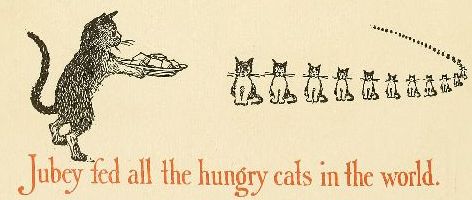
She had fixed the curtain so that the first sunlight[57] would fall on her face, and it seemed only a breath of time until she felt it call her.
How sleepy she was!
"I'll get down before the Kitchen Folks are awake," she whispered.
She carried her little shoes in her hand and stole softly downstairs, stopping in the dining-room to put them on.
"Nonsense, you!" she recognized the voice of Tea Kettle.
"Just wait till I read it out of my little book," mimicked a new voice.
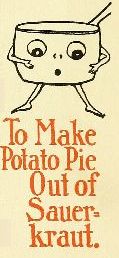
"For shame, you saucy Pan!" exclaimed Big Iron Pot.
"Just wait until I read it!"
Mary Frances peeped into the kitchen. In the middle of the floor stood little Sauce Pan, pretending to read out of a book:
"'How to Make Potato Pie Out of Sauer-kraut.'"
"Silly!" exclaimed Potato Masher.
Sauce Pan repeated:
"To Make Potato Pie Out of Sauer-kraut:
"1. Fill eight potatoes with Sauer-kraut, and peel them.
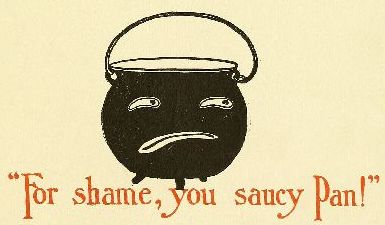
"2. Make a crust of the left-overs.
"3. Bake the parings well, and serve very hot on ice."
Just then Mary Frances sneezed.
How Sauce Pan ran, and jumped up to his place on the rack!
He looked so shamefaced when Mary Frances went in, that she hadn't the heart to scold him.
Instead, "Boiled Eggs," she called.
He pretended to be asleep. Then she took him by the arm and shook him.
"Boiled Eggs!" she shouted. "Doesn't that mean you?"
"Yes, ma'am," he said meekly; "I'm such a 'sleepy-head!' Do you know," con-fi-den-ti-al-ly, "I often talk in my sleep." At this the Kitchen People grinned.
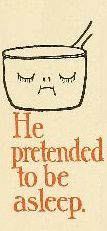
"Ahem!" said Mary Frances, "It's a dangerous habit. Sometimes people tell stories when they're awake, too," she added as she stepped out to get the milk.
"Is 'Old Puff-away' ready?" asked Sauce Pan of Coffee Pot.
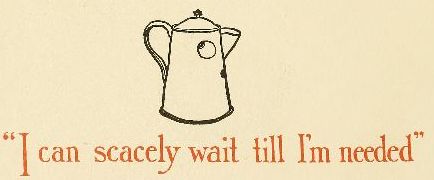
"If you mean Tea Kettle, Saucy," answered Coffee[59] Pot excitedly, "I hope so, for I can scarcely wait till I'm needed."
Tea Kettle gave two extra puffs of steam, but otherwise took no notice.
"How do you know you'll be used?" Sauce Pan asked of Coffee Pot, nudging Pie Plate who was near him.
"I come next in the book—and, besides, I'm always used for breakfast." Coffee Pot was beginning to get angry.
"Bet we have eggs,—eggs, and toast, and—tea! Yes, I bet it's tea for B. this morning."
Sauce Pan kept on saying, "Tea for B." so long that Coffee Pot began to cry:

"Tee-hee—Tee-hee—Tee-hee!" giggled Sauce Pan, pointing to Coffee Pot tan-ta-liz-ing-ly, who began to cry in earnest.
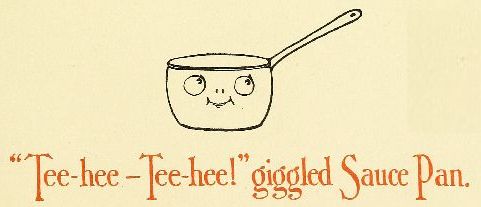
"Why, what's the matter with Coffee Pot?" Mary Frances asked when she came in. "Is it possible Aunt Maria forgot to dry you last night?"
Nobody said anything—and Sauce Pan hastily ran toward the stove.
"Wait," called Mary Frances, "wait a minute until I can look in my book——"
"Oh, I can say it without any book—we all know our own tricks," boasted Sauce Pan.
"All right," said Mary Frances, "say it—that will save time."
So he began.
"B'iled eggs—excuse me!—boiled eggs," he corrected, seeing Mary Frances' stern face.
1. Put eggs in sauce pan.
2. Cover with boiling Water.
3. Place where the water will keep hot 6 to 10 minutes. A quicker method is to boil eggs very gently 3 or 4 minutes.
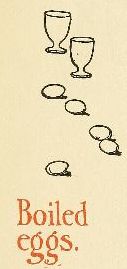
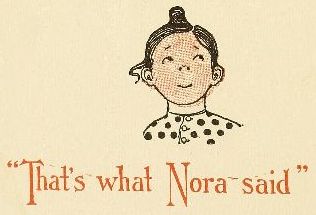
"Why!" exclaimed Mary Frances, "I thought you dropped the eggs into boiling water for three minutes or more, 'accordin'—that's what Nora said. I asked[61] her what 'accordin' meant, and she said 'accordin' to the tastes of them that eats them—soft or hard."
"I was speaking of the best way," declared Sauce Pan glancing loftily at Mary Frances. "There is no end of ways to do it, but this is the scientific way to cook eggs so that they will be soft, but cooked all the way through and easily digested—not liquid inside a hard, white coat. In other Words—Ahem! the al-bu-men (white of egg) cooks much better at a lower than a higher temperature."
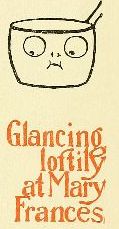
"Whew!" whistled Coffee Pot.
"I wonder how it is in my book." Mary Frances turned to the page. "Exactly as you said!" she exclaimed.
"Of course!" declared Sauce Pan.
"Bet he peeped into the book," whispered Coffee Pot to Toaster.
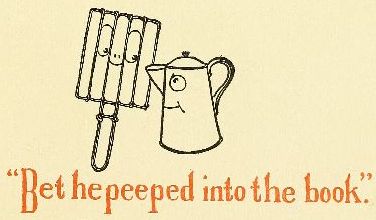
Sauce Pan continued: It is somewhat the same way with
1. Put eggs in sauce pan.
2. Cover them with boiling water.
3. Place on fire where the water will boil but very gently 20 minutes.
"Thinks he knows it all," grumbled Coffee Pot; "he'll be like the frog; he'll burst with pride if he keeps this up."
"Well, well, well!" said Mary Frances, "I certainly am surprised at what you know."
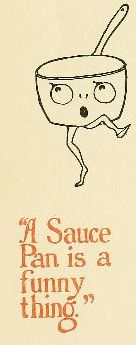
"Old Puff-away," he began.
"That will do!" said Mary Frances, and proceeded to pour out the hot water. "Tea Kettle is my right-hand man. Don't you dare say another word until I speak to you"—as she put in the eggs, and drew him to the back of the stove.
"And now, I'll make the coffee."
At her side stood Coffee Pot.
"Are you ready?" he asked.
"Quite ready," she said.
"Is it really my turn?" he asked again.
"Yes," smiled Mary Frances, "it is!"
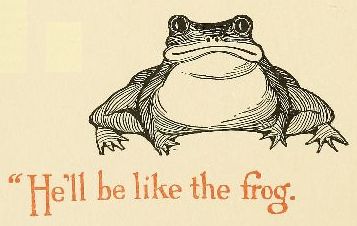
Then he began to recite ex-cit-ed-ly:
1. Put into coffee pot 1 rounded tablespoon ground coffee for each cup needed.
2. Pour on boiling water, allowing 1 cup to every tablespoon coffee used.
3. Let come to a boil three times, stirring down each time.
4. Draw off the fire. Pour in 1 tablespoon cold water for each cup.
5. Let stand in a warm place 3 minutes to settle grounds. Serve.
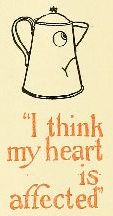
If not used immediately, strain into another warmed pot.
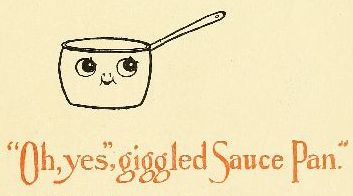
"You might pour out the first cupful to clear the nose—I mean, spout—then pour it back again."
He stopped for breath.
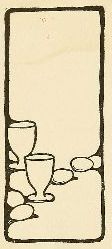
"Thank you, Coffee Pot," smiled Mary Frances, in praise, "how interested and wide awake you are!"
"I never sleep much," confided Coffee Pot. "I believe it's the coffee—just 'cat naps,' you know. I sometimes think my heart is affected—I'm so easily stirred up,—although I always feel well."
"If you always feel well," laughed Mary Frances, "I guess your heart is all right."
"Oh, yes," giggled Sauce Pan, "he's awfully good-hearted."
"Didn't I tell you,—'not another word' until I spoke to you?" said Mary Frances to Sauce Pan, as she lifted Coffee Pot to the table, and measured out the coffee and water.
After she had followed his directions entirely, she made the toast.
Toaster Man was so sleepy, he didn't say a word except, "You'll do it right, I know," and fell asleep again.
Just then, Mary Frances heard her father call.
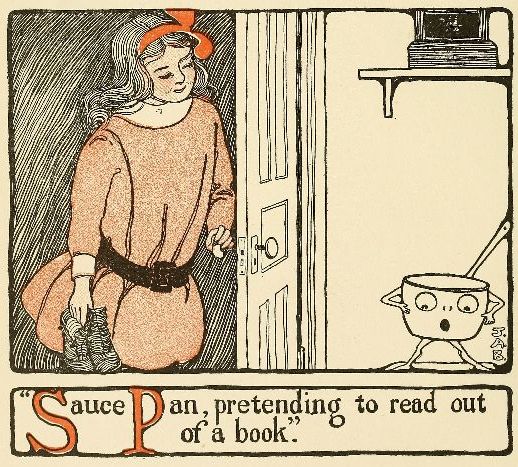
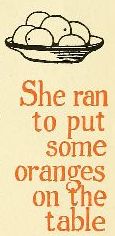
"Why, where is my little girl?"
She knew he was looking in her bedroom.
"All right, Father," she called; "I'm up and dressed—and downstairs—and, Father, wait a minute; breakfast is almost ready. I'll call you in a minute."
She ran to put some oranges on the table.
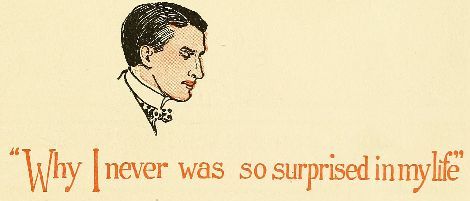
"You can come now, you and Brother," she then called. "You sit right down and eat your oranges, as I bring in the other things."
"All right, dear," said her father; "but first I want my good-morning kiss."
"A kiss and a bear hug," laughed Mary Frances, throwing her arms around him as he lifted her up.
"You stole a march on your old father this morning, all right," laughed her father. "Breakfast, indeed! Why, I never was so surprised in my life."
"Oh, Brother," said Mary Frances, kissing Billy; "you and Father sit down, and I'll bring in the coffee."
She flew into the kitchen.
Such a place! So thick with smoke and steam that all the Kitchen People were coughing.
"Oh, dear! dear!" cried Mary Frances, the tears coming fast. "Everything's burnt up! Why, didn't you call me, Sillies? To sit here and let the toast burn up!"
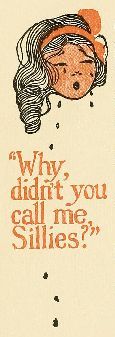
"I—I did call you," cried Coffee Pot, sputtering more coffee over on the stove, "but I couldn't make you hear."
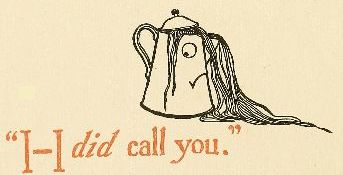
"Why didn't you call?" asked Mary Frances of Sauce Pan with a sob.
"You told me not to speak until you spoke to me——"
"I was asleep," interrupted Toaster.
"Who are you talking to, Mary Frances?" asked her father. "Aren't you nearly ready?"
"Sh—sh!" Warned Mary Frances, with uplifted finger—then aloud:
"Oh, Father, I'm so disappointed! I had everything[67] ready so nice and hot, and now everything's burnt up! Oh, de—ar, oh, oh, oh, de—ar!"
"Never mind, Honey," said her father, kissing away her tears. "Never mind! There's no hurry this morning, I'll fix the fire and you do it all over again."
"But I've wasted all the eggs—they're as hard as bricks—they cooked twenty minutes. I forgot them."
"They'll be fine in our salad to-night," said Brother; "I love hard-boiled eggs that way."
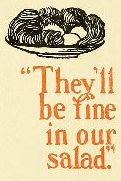
"Brother, you run out in the garden," said her father, "Sister is going to have our breakfast ready in a very few minutes."
"I'll do that," cried Billy, "and I'll have a fine appetite."
When they went into the kitchen Mary Frances saw Sauce Pan whisper something to Coffee Pot, but her father didn't notice. He quickly fixed the fire.
"Now, Father," begged Mary Frances, "please let me do it and I'll have everything on the table in no time."
"Ho-ho! little Miss Housekeeper doesn't need any help. Very well!"
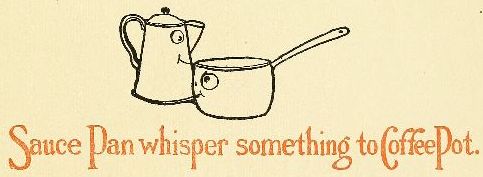

"I did need help with the fire, Father," said Mary Frances; "it was a great help, but——"
"All right, Girlie," said Father, "I'll read my paper; you call us when you're ready."
In a very few minutes she did call them, and a fine breakfast it was, too; for Mary Frances knew how so well that not a minute was wasted.
"Ain't she the loveliest cook," whispered Coffee Pot to Sauce Pan, as Mary Frances disappeared through the dining room door with the eggs.
"Loveliest ever!" said Sauce Pan. "I really was afraid to call her for fear her father would hear. I'm so sorry——"
"Yes," nodded Toaster Man, "I can't seem to get it off my mind. It keeps me so sad—won't you tell us a story?"
"I can't get it off my mind, either," said Sauce Pan, with a sob, "but I'll do my best. Here goes:
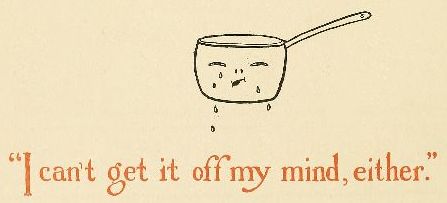
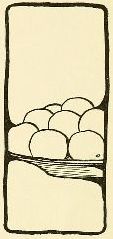
"Oh, silly!" interrupted Toaster Man, "don't make fun,—besides, you know that's not true."
"Well," replied Sauce Pan, "I thought you wanted a story!"
"Pooh!" puffed Tea Kettle, "What a poor pun! I should think you'd all be tired out. Let's take a nap."
"I just want to say I love our little Miss just the same," said Sauce Pan.
"And I!"
"And I!" cried all the Kitchen People.
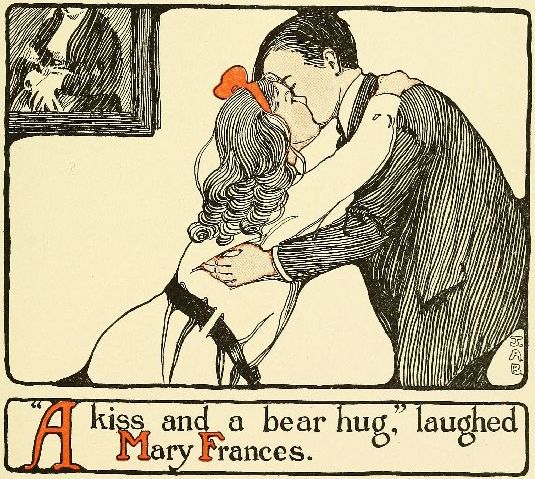
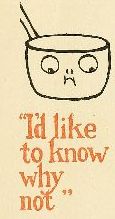
"Nice memory,—yours!" drawled Sauce Pan. "Don't you remember they all went over to Aunt Maria Hush's for dinner Saturday night, and for Sunday?"
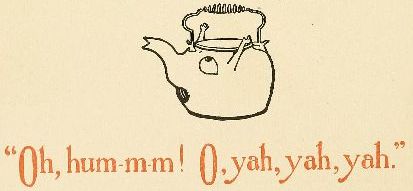
"Aunt Maria Hush!" roared Tea Kettle. "That's not her name!"
"I'd like to know why not," said Sauce Pan. "Every time I go to say anything when she's here, somebody says, 'Keep still—that's Aunt Maria,—Hush!"
"Ho, ho, ho, hee-hee-hee!" laughed all the Kitchen People.
"That meant, 'Be still,' Goosie," Tea Kettle explained.

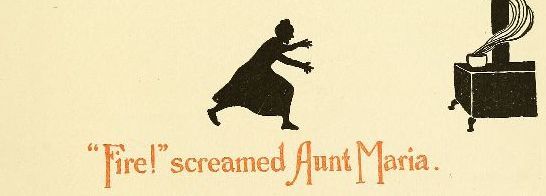
When Aunt Maria and Mary Frances came into the kitchen later, the old lady was talking.
"Very creditable, child," she said, looking at the shelves, all in order, "very creditable indeed. I can't understand it—with no one to show you how to——"
"I have my little book," said Mary Frances.
"Book!" sniffed Aunt Maria, putting the breakfast cereal on to cook. "Book! A book can't tell you exactly when a piece of toast is brown enough, or a potato just done enough to be mealy, nor how to keep a pan from burning. Book! It's talent! That's what it is! Blood will tell. You inherited it from me. I never burnt pans—never in my life—there's no excuse for it."
"Yes, ma'am," said Mary Frances, thinking of the ruined breakfast.
"Go up, and open the beds to air," commanded Aunt Maria.
When Mary Frances got back, she could scarcely see across the kitchen for smoke.
"Fire!" screamed Aunt Maria, making for Boiler Pan on the stove.
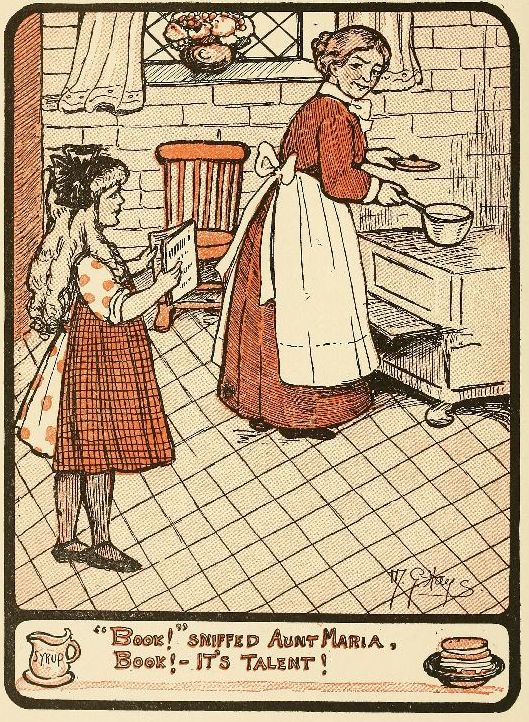
"I thought the house was on fire," she panted,[73] snatching it up. "Oh,—oh, I wish I had my smelling salts! The porridge is all burnt up! What a disgrace!"
Mary Frances felt very sorry for her, but when she saw Sauce Pan and Coffee Pot holding their queer little fists over their mouths to keep from laughing out, and when she remembered how funny the old lady looked making across the kitchen in two steps, she ran back into the dining room to laugh.
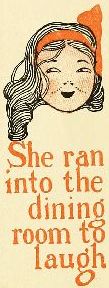
"I must stop," she'd say to herself—and the more she'd say it, the more she'd laugh. "This is dreadful, Mary Frances," she'd scold herself; "but, oh, my, wasn't it funny!"—and away she'd go again.
At length she Went back upstairs until Aunt Maria called,
Even at the table she couldn't look at Aunt Maria without laughing.
"What's the matter?" asked Brother.
"Oh, don't ask me!" Mary Frances begged, hiding her face.
She didn't dare go into the kitchen until after her aunt had gone, for fear of disgracing herself laughing.
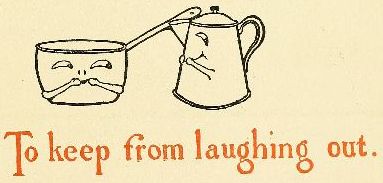

When she did go out to look up her next lesson in her little book, Boiler Pan walked dolefully up to her, holding out a piece of sand-paper.
He looked so funny with a big black spot on one eye!
Bowing, he began to recite:
"Of course, you never burn your pans,
Of course, no more do I;
But, should such sad things happen,
A piece of this just try."
"I will!" exclaimed Mary Frances; and in less than a twinkle had rubbed all the burnt spots off.
"My,—that's better; thank you," brightly beamed Boiler Pan.
Mary Frances sat down on the rocking chair, and opened her book.
"Tea! Omelet!" she exclaimed. "Isn't that nice!"
Just then came a knock at the kitchen door.
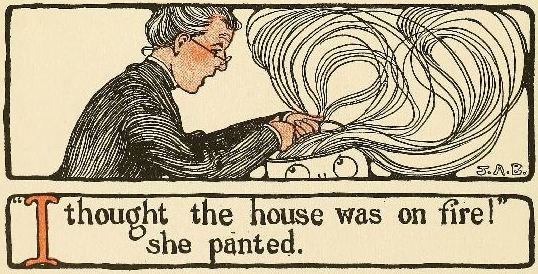

"Oh, dear,—shall I open the door?" thought the frightened little girl.
"Please, Miss,"—the oldest, hungriest-looking tramp she ever saw looked down at her, taking off his worn out cap. "Please, Miss—a cup o' tea—anything? I am that tired and faint."
He caught hold the railing.
"Tea!—my next lesson!" thought Mary Frances.
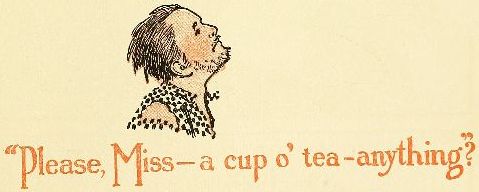
"That's easy and quick! and Tea Kettle is just beginning to boil. How awfully cold and hungry the poor man looks!"
"Wait a minute," she called.
"I almost know how to make tea,—but I'd better look at the recipe. Where'd I put my book? Oh, here it is,—open to the place," she spoke softly.
Then she read the directions for making[76]
1. Half fill the teapot with boiling water. Let stand until thoroughly hot. Pour out.
2. Put into it 1 teaspoon tea for each cup needed.
3. Pour in freshly boiling water, allowing 1 cup to every teaspoon tea.
4. Let stand for 5 minutes in a very warm place, but do not let it boil. Stir, and serve.
If not used immediately, strain into another heated pot.
Very soon she had filled the largest cup she could find in the closet, and handed it to the tramp.
"That's the bonniest cup o' tea I've drank for mony a year, Miss," said he. "It tastes like the auld country, shure."
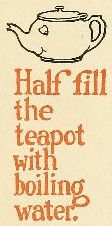
"Like the old country!" thought Mary Frances. "That's the funniest way for anything to taste I ever heard of. Maybe he's so hungry he's a little bit out of his head. Oh, I know what I'll do! I'll make an omelet for him! I don't believe he's eaten omelet since—maybe, since he was as little as I am—maybe a hundred years. He looks a hundred years old, I'm sure. I hope I have eggs to make one—oh, yes, I know there are enough. Where's the recipe? Oh, here it is!"
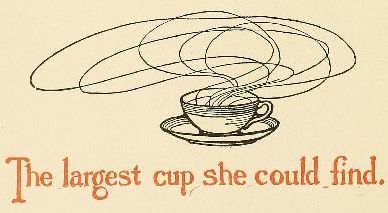
Two eggs to each person.
1. Separate yolks and whites, putting them into different bowls.
2. Add dash of salt to whites, and dash of salt and white pepper to yolks.
3. Add cold water to whites, allowing 1 teaspoon to each.
4. Add cold water to yolks, allowing 1 tablespoon to each.
5. Beat both very light.
6. Melt 1 tablespoon butter in a smooth frying pan.
7. Pour in yolks. Let cook a moment.
8. Spread whites over yolks, making a little hole in the center for steam to escape.
9. Cook slowly for 5 minutes, or until the puffed up whites look dry.
10. Fold one half over the other.
11. Turn out on a warm platter.
12. Trim with parsley and serve at once.
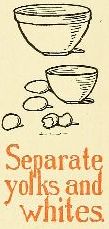
"That's not so easy," thought the little girl, "but I guess I can manage it—he'll not be very par-tic-u-lar."
But she had very little trouble; for she read what her mother had written; and followed each direction exactly, all the way through the recipe.
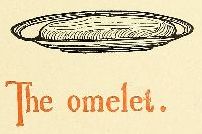
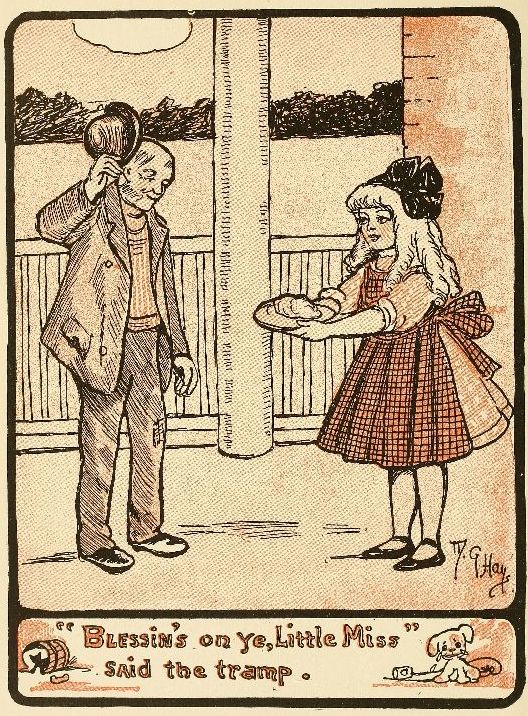
"Blessin's on ye, Miss," said the tramp, as Mary Frances carried the smoking dish out on the porch[79] to him with a slice of bread and butter. "You've got a kind heart, you 'ave, to be shure. Ain't that—whatever it is—a beauty!"
"It is real pretty," said Mary Frances, feeling quite proud. "I just made it for you. I'm learning to cook. My mother's away—and I'm here all alone just now except for Jubey and the Kitchen F—— (she caught herself just in time). Jubey is the kitten, you know. My lessons just came to Omelet, and—why, what's the matter with it?" she cried, dismayed. "It's all fallen flat! I wonder if I got it done. It gets flatter and flatter."
The tears sprang to her eyes. "I'm so sorry," she said.
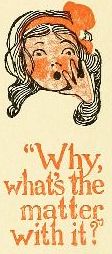
"Oh, never mind, Miss," said the tramp; "I ain't been chooser for mony a day—and this 'ere homelet, or whatever it is, will be all right, all right,"—and he hungrily began to eat.
"It seems to be made out o' nothin'—and yet it is powerful good," said he between bites, as it fast disappeared, much to Mary Frances' delight.
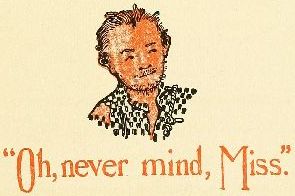
"It's made out of beaten eggs," said she. "First,[80] you take the eggs and break the shells, and put the yolks in one bowl and the——"
"Why, Miss, I know what made it flounder."
"Flounder? Flounder? 'Flat as a flounder,'" thought Mary Frances—"he means flatten."
"What?" she asked eagerly.
"Why, the breeze! The cool air plays the——"
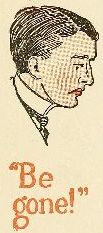
Her father came into the kitchen.
"Who's there? Why, my dear little girl, what are you doing?"
"I'm—I've got company," Mary Frances stammered, not liking to say tramp. "That is—I—oh, Father, this gentleman was so hungry—and I——"
"Go into the house—and I shall see you."
"Be gone!" thundered her father to the tramp, pointing to the gate.
"Begging pardon, sir," said the tramp, touching his cap, "but may I say one word?"
"Make it short."
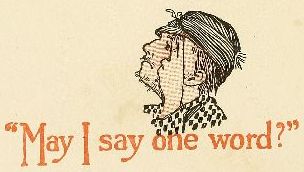
"I'd do anything for the young lady—not let a 'air o' 'er 'ead be 'urt. Please don't be too 'ard on 'er."
"You may go," said Mary Frances' father. "Are you hungry yet?"
"Oh, no, sir,—thank you, sir," said the tramp. "Thanks to 'er."
"Bless 'er little 'eart," her father heard him murmuring, as he went out the gate.
"Bless her dear, loving little heart!" echoed her father.
"The poor dear 'lamb' should not have been left alone! I thought Billy was here. But she must have her lesson!"
Going into the kitchen, he took Mary Frances on his knee.
"Dear," he began gravely, "suppose the old tramp had not had kind thoughts. Suppose, when my little girl opened the door, he had hurt her, and had taken mother's nice things, or had stolen our dear little daughter——"
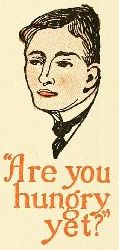
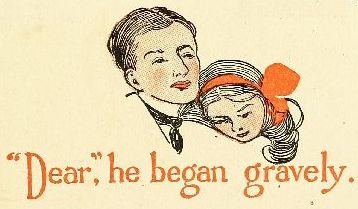
"But, Father," said Mary Frances, "he was a lovely gentleman! I feel quite sure he was going to[82] tell me a beautiful story about when he was little—maybe a hundred years ago——"

"Mary Frances, listen, child! Never, when you are alone, unlock the door to any man or woman you do not know. Understand?"
"Yes, Father," said Mary Frances; "I didn't mean to be bad."
"No, dear; but it would be very naughty indeed for you to do so again. Do you promise?"
"Yes, Father, said Mary Frances, hiding her face" on his shoulder. "I'll never, never do it again, dear Father."
"Humph!" grumbled Aunty Rolling Pin, after they had gone into the library, "I'd have warned her—only I was afraid the tramp gentleman might hear!"
"So would we all of us," cried the rest of the Kitchen People.
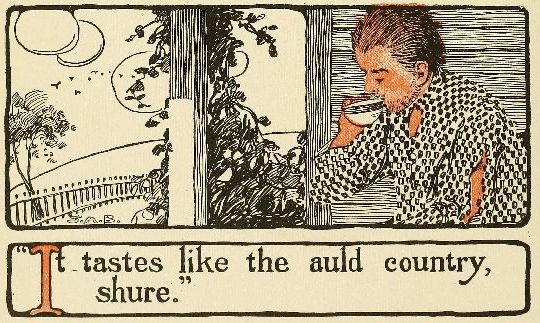
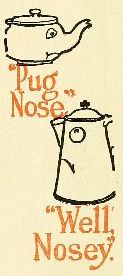
"It isn't exactly eavesdropping," she thought, "although it seems awfully near to it."
"Can't you find it?" somebody was asking.
"Seems to be having trouble," said Tea Pot. "Of course, he can't very well find out—being so short and fat, and having no nose to speak of."
"Well, Nosey," answered Coffee Pot, "suppose you try—your nose is long enough to poke into anything!"
"So much the better for me this time, Pug Nose."
"Oh, say, stop calling names, and find out—if you can," cried Big Iron Pot.
"I'll bet it's my turn again!" interrupted Sauce Pan. "Now, see if I'm not right."
"He's peeped already," declared Coffee Pot.
"'Deed, I haven't," very earnestly.
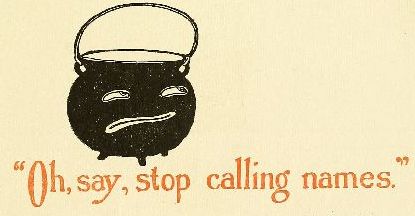
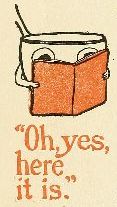
"Oh, say, Tea Pot, if you're any good, get to work! See if he's right. Can you do it?"
"Yes," replied Tea Pot rather breathlessly. (It seemed to Mary Frances as if he were lifting a heavy weight.) "Yes, here is the place. Somebody else read; I'm too tired."
"I'll read," said Sauce Pan. "What was the last? Oh, yes, here it is, just as I said!"
"Oh, go 'way! Don't let him read," said Coffee Pot; "he'll make it up."
"Read yourself, then, Pug Nose!"
Then Coffee Pot's voice:
"I declare! He's right! It is his turn again. Listen!
| 2 tablespoons butter |
| 2 tablespoons flour |
| 1 cup hot milk |
| ¼ teaspoon salt |
| dash of pepper |
1. Melt butter in a sauce pan.
2. Mix pepper and salt with flour.
3. Throw into the butter, stirring thoroughly. Cook until it bubbles a little.
4. Pour 1/3 of the milk very slowly on this, stirring and beating well.
5. Place over fire and stir in the rest of the milk a little at a time.
6. Let boil a minute.
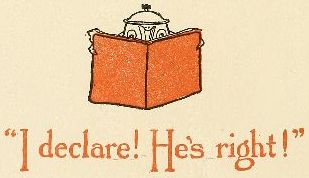
"Pug Nose——"
"Stop calling names," said Iron Pot.
("Good!" thought Mary Frances.)
"Honorable Mr. Coffee Pot, Esquire," said Sauce Pan, mockingly. (Mary Frances could easily imagine him bowing.) "Allow me to call your attention to the un-im-peach-able ver-ac-i-ty of myself."
"Crazier and crazier!" commented Coffee Pot, sadly. "Did you say anything?"
"Sir," said Sauce Pan, "to put it into kindergarten words, I remarked, Sauce Pan, meaning myself, has rightly been likened to George Washington——"
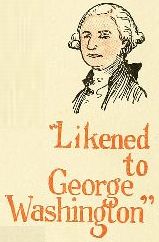
"Aw—!" puffed Tea Kettle, "what I'm more interested in is the book. What do they use White Sauce for?"
"There's a foot-note," Tea Pot ventured.
"Read it!" commanded Tea Kettle.
"'White Sauce is very good to pour over cooked vegetables, like——'"
"Wait a minute," interrupted Tea Kettle, "perhaps Sauce Pan can tell us."
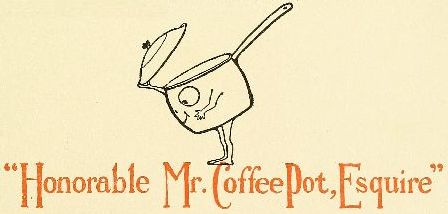
"New boiled potatoes, green cabbage, etc; also nice to use for warming over cooked meats, like cold[86] chicken and canned salmon. Both make a nice luncheon dish."
("Fine!" thought Mary Frances. "There's a can of salmon in the pantry.")
"Is that right?" asked Tea Kettle.
"Right," said Tea Pot. "Next is
1. Wipe large apples.
2. Take out cores with apple corer or sharp knife.
3. Place in earthen or enamel dish.
4. Fill center of each apple with sugar.
5. Pour water into dish, allowing 2 tablespoons to each apple.
6. Bake in a hot oven one half hour, or until soft.
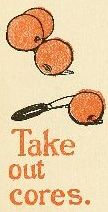
"A joyful surprise!" a deep voice seemed to come from the closet.
"Who's that?" asked Tea Kettle. "Oh, it's Baking Dish!—you startled me!"
"Although I'm not paid proper respect for my years——" went on the deep voice.
"How old are you, now, anyway?" asked Tea Kettle.
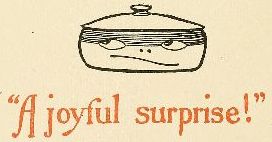
"What an honor!" snickered Sauce Pan.
"How rude!" said Coffee Pot.
"No, child," came the deep voice of Baking Dish, "only modern—without reverence for the old and——"
"One—two—three—four—five—six—seven—eight—nine—ten—eleven!" struck in Mantel Clock, very loudly.
"Oh, my goodness!" exclaimed Mary Frances to herself, "it's time to commence lunch. I do thank Mantel Clock for reminding me.
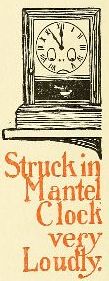
"Let me see," said she, going into the kitchen as if she had just come downstairs, although she felt very guilty. "I must find to-day's lesson."
She read quietly for some time, pretending not to notice that she found the book open with the spout of Tea Pot lying against one of the pages.
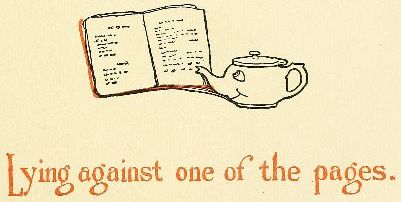
"I can make White Sauce in a jiffy, and I'll heat some canned salmon in it," she exclaimed, picking up[88] Sauce Pan quite carelessly. "He needs a lesson, and I don't need his help," she thought. "I'll treat him quite in-dif-fer-ent-ly."
"The salmon ought to have been opened an hour or two ago," said a sharp little voice.
Mary Frances looked around to see who her new helper could be, but could discover no one.
"How do you know?" she asked, more to find out who was speaking than to gain information.
"Who'd know better?" came the little voice, so sharp it was little more than a squeak. "I'm Can Opener!"
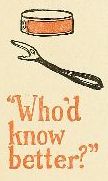
"Oh, so you are!" cried Mary Frances, spying him. "I'm glad to see you. Now, why open the salmon an hour ago?"
"All canned goods ought to be opened an hour or two before needed, and turned out," explained Can Opener, "to get well aired."
"Thank you," said Mary Frances, "I'll open the salmon right away—then see to the apples—then the White Sauce."
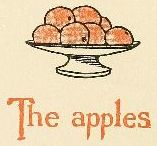

She had only just finished the White Sauce, when the door-bell rang. She stopped to take the Baked[89] Apples out of the oven, before answering. It was Billy with Robert and Eleanor who lived down the street.
"Hello, Sister," said Billy, "I told you I'd bring company home to lunch some day. Anything ready?"
"By good luck, Billy, yes," said Mary Frances, kissing Eleanor, and taking her coat and hat, while Billy did the same for Robert.
"I know now why Mother likes Father to telephone when he's bringing home company to dinner," laughed Mary Frances.
"Oh, don't you worry, folks," said Billy, "everything'll be all right."
"That's the highest compliment a boy can pay, Mary Frances, you know," said Eleanor.
"I wish I could cook," she sighed, when Mary Frances dished the dessert of Baked Apples, and the three praised everything on the table.
"I wish you could, Sis," exclaimed Robert.
"Maybe some day I'll teach you some of the things I can make," said Mary Frances.
"Oh, Mary Frances, will you?" cried Eleanor.
"If your mother says so," nodded Mary Frances.
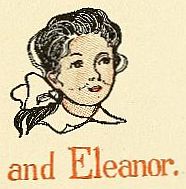
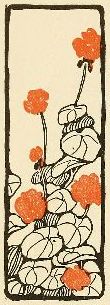
"I know she will," declared Eleanor. "She hates to cook, but she'll let me learn. She never goes into the kitchen if she can help it. And no wonder. Our kitchen is an awful place to go into, Maggie is so cross. She wouldn't let me try."
"Pity the poor Kitchen People," thought Mary Frances.
"Oh, we'll have fun!" she said aloud.
"When will you want me to come?" Eleanor asked.
"Some time, when I get near the end of my book, I'll let you know."
"Won't that be lovely! I'll bring my own bowl and spoon."
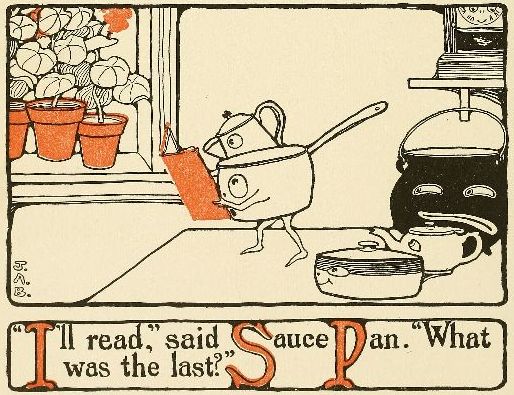

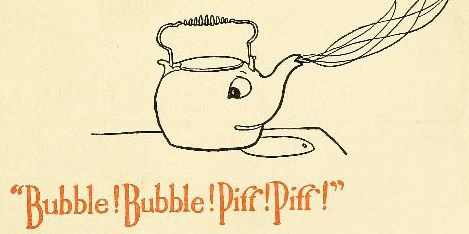
"Bubble! Bubble! Piff! Piff!" puffed Tea Kettle, mys-ter-i-ous-ly smiling as though he knew something was about to happen.
Mary Frances couldn't see anything very pleasing with so much of a task before her.
She put the large dish pan on the table and poured in the water, whirling the soap around in it several times to make it a little sudsy.
Then she sat down to rest.

"Really, I didn't know I was so tired," she thought; "maybe my age is telling on me the way Aunt Maria says!"
Her weary little head began to nod, and she was soon fast asleep. She hadn't been asleep long before she was aroused by a great racket.
"Click, clack! Click-ety-clack! Splash!"
"Come," she said to herself, rather sharply, "I do believe you've been asleep, Mary Frances! You'd better get to work, child."
"Click! Clack!"
Again came the sound.
With her sleepy lids half open she glanced toward the table, and such a sight she never saw! She sat up with mouth and eyes wide open, but nobody paid any attention to her.
There were the dishes jumping higgledy-piggledy, pell-mell into the dish pan.
First a cup, followed by a saucer, then a spoon, followed by a fork.
"Make room for me," cried Platter, diving in head first.
"Look out, or you'll chip me," cried Tea Cup, tumbling out on the other side of the pan.
"I'm next!" a big dinner plate splashed in "kerplunk."

Mary Frances couldn't say a word—she was so afraid they might break their heads.
"Ouw! this is hot!" screamed Little Pitcher.
All the other Kitchen People were looking on and laughing. Aunty Rolling Pin was rocking to and fro, laughing so hard the tears were rolling down her cheeks.
When Yellow Bowl bounced into the water, "Chase yourself!" cried Soup Ladle, making hard after.
In less time than it takes to tell, the dishes were all clean, and had piled themselves up neatly on the table.
Then Mary Frances realized what had happened.
"That was a patent dish-washing," she said. "I don't want you to do that often. I was afraid my mother's china would be broken all to pieces! But I am very much obliged, this time, I'm sure."

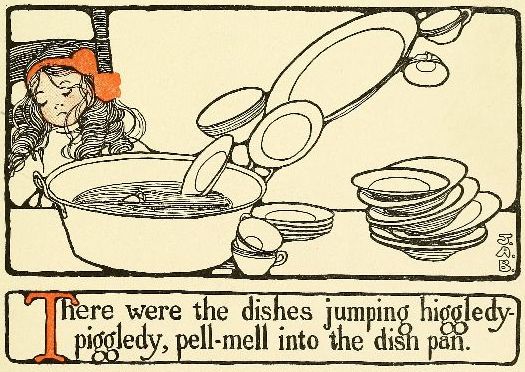
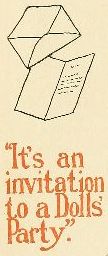
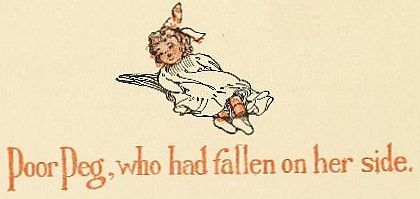
"Misses Angelina, Marie, Cosette, Lady Gay, Peg, Master Alfonso, why, listen! Here's a letter come for you. What can it be? Pay very strict 'tention while I read it. If you'd gone to school every day I've been so busy, perhaps you could read it yourselves; but, of course, when my hands are so full, I can't possibly get you off, and you are so helpless. Aren't you 'shamed? I think—yes, I think you all look ashamed except Peg. If you don't look ashamed in one minute, Peg,—just one minute I'll give you,—you sha'n't hear this! There, that will do! You needn't cry, dear child! Now, I'll read."
Mary Frances cut open the envelope.
Every doll looked deeply interested except poor Peg who had fallen on her side. "Why, it's an invitation to a Dolls' Party! Listen!"
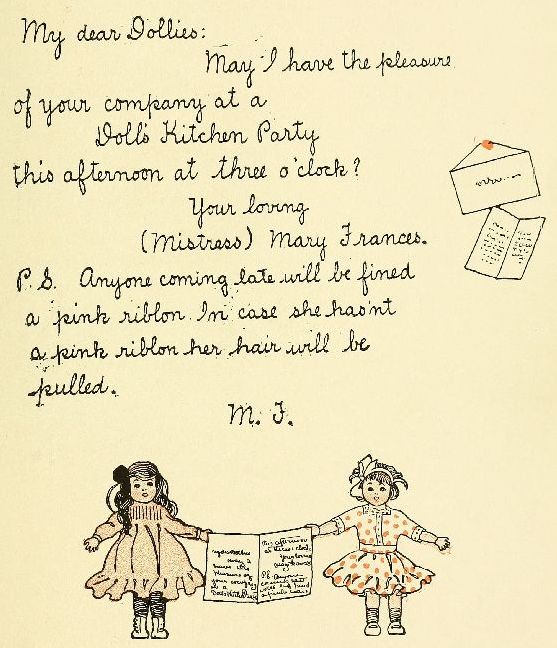
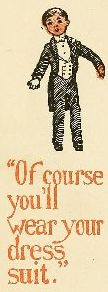
"Now, dears," Mary Frances smiled upon them, "no wonder you look surprised; for that's a grand invitation, all written out on real paper. I had an awful time getting it to sound right. I'm not sure that it is just exactly correct yet. So we'll get dressed right away. Now don't all ask at once what you'll wear. Yes, Fonsey, of course you'll wear your dress suit. What of it if it isn't proper to wear it until after six o'clock? You have only your work clothes and that suit and you'll have to wear your best."
Everybody was quiet and good as gold while Mary Frances finished dressing them.
"There," she said to herself, "the last sash is tied. Goodness, I'm tired—tired-er than if I'd been cooking the whole morning! Aren't dolls stupid compared with Kitchen Folks? I do wonder what the Kitchen Folks will do. Will they talk before them?"
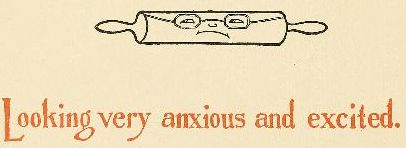
"Now, you dolls, be good, and take a nap," she warned, "so that you won't be sleepy at the party. I must go and get ready."
As she tied on her apron in the kitchen, she noticed Aunty Rolling Pin looked very anxious and excited.[97] She couldn't seem to keep still, but kept rolling to and fro, watching Mary Frances' every motion.
"Well, Aunty Rolling Pin?" said Mary Frances.
"Did you, or did you not, please," asked Aunty Rolling Pin, "mention 'Biscuits' this morning?"
"I guess I did," replied Mary Frances, "when I glanced at my book. Here, I'll read it out:

| 1 cup flour |
| 2 teaspoons baking powder |
| 1 tablespoon butter |
| ½ cup milk (scant) |
| ¼ teaspoon salt |
1. A hot oven and a greased pan.
2. Sift flour, baking powder and salt three times.
3. Rub butter lightly into the flour.
4. Pour the milk on gradually, mixing all the while with a knife, until a soft dough is formed.
5. Turn the dough on a well-floured board.
6. Pat it with the rolling pin until ¼ inch thick.
7. Use a large thimble as a cutter, and cut biscuits as close to each other as possible.
8. Place in pan a little distance apart.
9. Bake about 5 minutes.
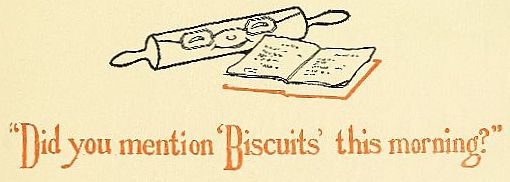
1. Make exactly the same as Thimble Biscuits (No. 16), only pat the dough out about three-quarters of an inch thick. Prick with a fork.
2. Cut with a biscuit cutter, and place in pan, a little distance apart.
3. Bake in a quick oven from 12 to 14 minutes.
"Ever make any biscuits, child?"
"No, Aunty Rolling Pin, but I believe I can with your help, if you'll be so kind."
"'Deed I will, child." Aunty Rolling Pin gave a delighted chuckle. "I've been waiting patiently for the chance."
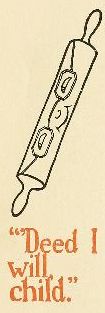
"I'm going to give a Dolls' Kitchen Party, Aunty."
"Ah, I'm glad you told me, child; that makes everything more important than ever. So, as you gather together the things you'll need, you can listen—ahem!—to Aunty Rolling Pin's Wisdom."
"You know about 'most everything!" said Mary Frances. "I'd be much obliged to you for any other hints during the rest of my lessons."
"I'll be glad to help, child," said Aunty.
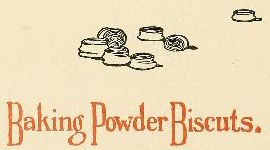
"Mother expected to explain everything to me, you see——"
"Yes, yes, child," smiled Aunty Rolling Pin, seeing Mary Frances looked sad; "but I see you have sifted the flour and baking powder and salt into a bowl and poured it back. Instead of using a bowl, it's a good idea to use a piece of heavy paper. When this is folded funnel-like, the flour can readily be poured into the sifter again and again."
"That certainly is easier," said Mary Frances, putting the hint to practice.

"In order to get the baking powder into every bit of the flour, they should be sifted together three times. Now, I see you are working the butter into the flour. Rub lightly with your finger tips. That's it—pour the milk gradually, mix well—the dough should be almost sticky, but not too soft to handle. Now it's my turn," she chuckled, as Mary Frances turned the dough on a well-floured board. "But if you are going to make Thimble Biscuits, one half of the dough is enough to pat out for them——"
"And I can make the rest into real biscuits! What a splendid idea!" said Mary Frances.
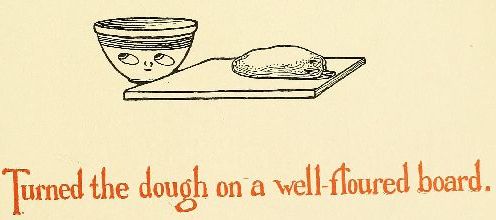
"Wonder if the handles are her ears," she thought, softly patting the dough with Aunty Rolling Pin.
As she bent over, she caught the sound of singing, and this is the song Aunty Rolling Pin sang:
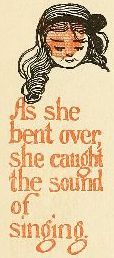
"Where?" she asked suddenly stopping.
Mary Frances jumped. She had been rolling Aunty Rolling Pin to and fro, unconsciously keeping time with her song.
"Where?" she again demanded, her mouth full of flour.
"Dear me," answered Mary Frances, "I don't know."
"School, of course," laughed Aunty Rolling Pin; "I thought you'd surely know."
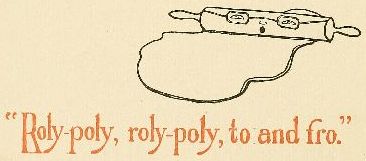
"Oh, yes, of course," laughed Mary Frances; "Cooking School."
"Certainly, child," laughed Aunty Rolling Pin. "To what other school could you go to learn about me?"
"That's beautiful poetry," said Mary Frances.
"I think so," smiled Aunty Rolling Pin; "I made it up myself. It's so floury, you know," blowing the white dust in the air.
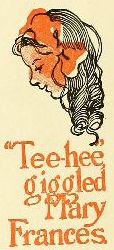
"Tee-hee," giggled Mary Frances.
Aunty Rolling Pin looked offended.
"Excuse me," said Mary Frances, "you mean 'flowery.'"
"I mean what I say," said Aunty Rolling Pin; "isn't that what I said?"
As it certainly was what she said, and Mary Frances didn't like to explain, she hastily turned to her work.
It didn't take long to cut the biscuits, as she had often helped her mother in baking. She knew how to dip the cutter each time into flour, that the dough might not stick. She used the large thimble she had brought down from the sewing room in the same way as she had used the biscuit cutter.
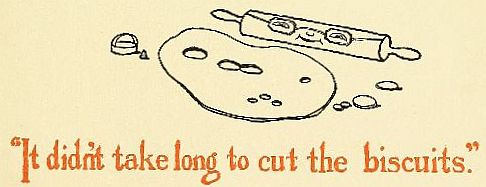
"Aren't they too sweet!" she cried delightedly, as she laid the tiny biscuits side by side, but not touching, in the little baking pan. With the rest of the dough, she had made three larger ones. "One for each of the family," she said, slipping them with the Thimble Biscuits into the oven.
"Let me see what's next. Oh, yes, the cocoa. I do declare, it's little Sauce Pan's turn again. No wonder he's puffed up," she thought. "Strange, he hasn't said a word. I'm 'most sure I have to use Sauce Pan. Perhaps he doesn't understand. I'll read aloud:
For each cup:
| 1 tablespoon cocoa |
| 1 tablespoon sugar |
| ½ cup boiling water |
| ½ cup milk |
1. Heat milk.
2. Mix cocoa and sugar.
3. Pour boiling water on them gradually, making a smooth paste.
4. Add the milk, and cook a half minute.
5. Beat with an egg beater.
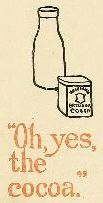
Silence.
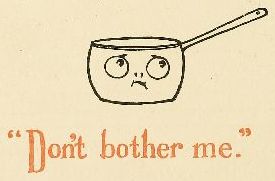
"Sauce Pan!" one of the Kitchen People near him[103] whispered loudly, "Sauce Pan! Why don't you speak?"

"Don't bother me. I'm asleep," muttered Sauce Pan drowsily, "sound asleep!"
Mary Frances gasped.
"What 'n awful story!" exclaimed the one who had first spoken.
"You're not very polite to question my word to my very face," Sauce Pan retorted angrily. "Now, if someone else had told you, that would have been different; then you'd had some excuse."
"Come," thought Mary Frances, "that's too silly! I'll put an end to this. I don't need any help with this simple recipe."
Seizing Sauce Pan quite carelessly, she quickly made the cocoa.
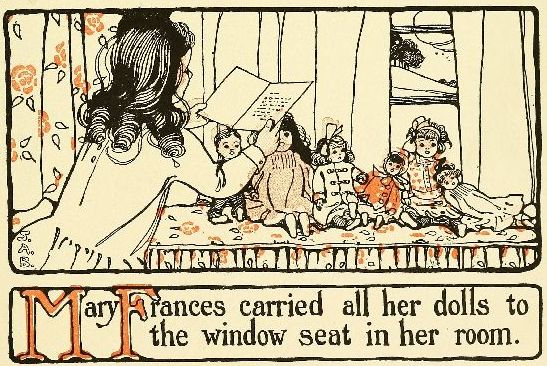

"Better look in the oven!"
"Oh, my, I'm glad you 'thought me,' Aunty Rolling Pin," cried Mary Frances, opening the oven door.
"Oh, dear me! Most of the Thimble Biscuits are burnt up and the big ones are just done, I guess!"
"The thicker things are, the 'slower' the oven, child. The thinner, the hotter the oven——"
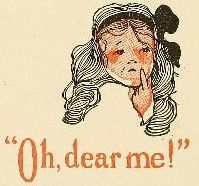
"Aunty Rolling Pin," cried Mary Frances, not realizing she had interrupted, "there are enough Thimble Biscuits not burnt to go 'round. Isn't that[105] good? And the dolls can't make themselves sick with them."
"It's not much of a waste," smiled Aunty Rolling Pin, "and (seeming to be seriously thinking) the dolls can't make themselves sick on them—eating too many, I suppose."
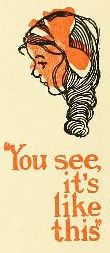
"Well," said Mary Frances, "you see, it's like this:

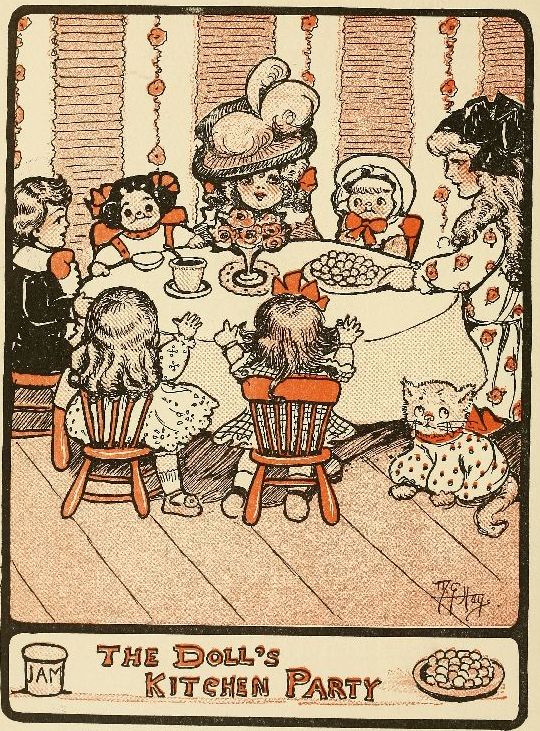
And away ran Mary Frances to bring the dolls.
"It was a lovely Tea Party, wasn't it, Angie?" sighed Mary Frances, putting her family to bed after it was all over.
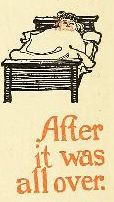
"And you did 'behave a credit' to your mother. I feel sure now you will remember all I've taught you. Not one of you would eat soup from the point of a spoon, nor spread a whole slice of bread at once, nor leave your spoon in your cup, which is a great comfort to a mother. Only Peg, you poor child, you should not have spilled that cocoa down your best dress. But 'Children will be children,' I 'spose—and you're very dear children."
("I wouldn't have them, for the world, jealous of the Kitchen People—and I've neglected them shamefully of late.")
"I'm not much taken with those things called 'dolls,' Aunty Rolling Pin," said Sauce Pan, seating himself on the edge of the top closet-shelf, and crossing one leg over his knee. "They're not much use."
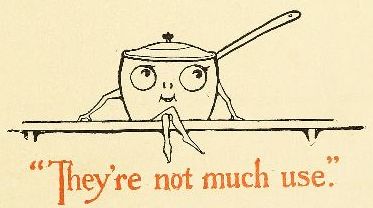
"Ah," sighed Aunty Rolling Pin, looking wise, "a doll's a doll, for all that."
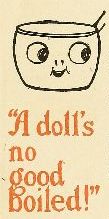
"Of course," said Sauce Pan, "but a doll's no good boiled!"
"Well, no," admitted Aunty Rolling Pin, "the best, of course, are baked of
No. 19.—Gingerbread Cookies.
| ½ cup molasses |
| 2 tablespoons butter |
| 2 tablespoons lard flour |
| ½ tablespoon ginger |
| ½ teaspoon salt |
| ½ teaspoon baking soda |
| 1 tablespoon warm water |
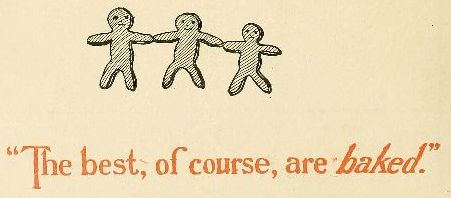
1. Warm the molasses.
2. Put the butter and lard in a bowl. Pour over them the molasses.
3. Dissolve soda in the warm water. Add to the molasses.
4. Sift ginger, salt and ½ cup flour together.
5. Sift into the molasses, beating well. If necessary, add more flour to make a soft dough.
6. Grease a shallow pan.
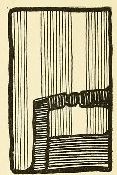
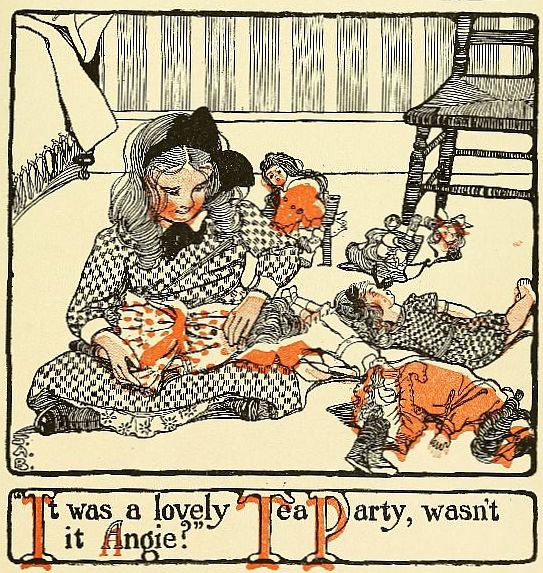
7. Roll the dough out 1/3 inch thick.
8. Cut out with a little round cutter, dipping it into flour each time.
Place cookies some distance apart on the pan. Bake about 10 minutes.
Note.—Instead of rolling out, little spoonfuls may be dropped far apart on the pan and flattened with the bottom of a round tin cup.
"Then you——
"Oh, Aunty Rolling Pin, nobody's doing a lesson. Besides, after it's baked it's done!" cried Sauce Pan impatiently.
"So'm I!" smiled Aunty Rolling Pin.
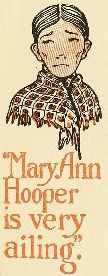
"If only," thought Mary Frances, "if only I could cook something for her! Wait until I look in my book. I wonder if she could eat to-day's lesson."
She laughed aloud—that seemed so funny.
"Well," snapped Aunt Maria, "of all things; to laugh at a poor sick neighbor in such a pre-dic-a-ment."
Mary Frances blushed, but she didn't say anything.
After lunch, she started home as soon as possible.
Once in the house, she ran to the kitchen for her book.
"Of all things! As Aunt Maria would say," she cried, "it comes next!"
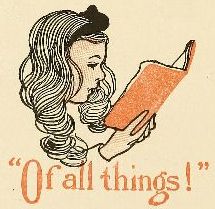
| 1 cup milk |
| 1 egg |
| 2 tablespoons sugar |
| dash of salt |
| nutmeg |
1. Heat the milk smoking hot.
2. Beat egg. Add sugar and salt.
3. Pour the hot milk on, beating well.
4. Pour into upper part of double boiler, or set pan in boiling water.
5. Cook until it thickens, or until a coating will be formed on a clean spoon when dipped into the custard.
6. Sprinkle with a few gratings of nutmeg.
7. Serve cold.
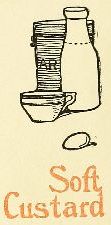
"How perfectly lovely!" exclaimed Mary Frances; "I'll make soft custard for Mary Ann Hooper. But that isn't very much. Oh, isn't this too good? I can serve it on the next recipe. It's
| ½ cup rice |
| 2 cups boiling water |
| ½ teaspoon salt |
1. Wash rice. This may be easily done by putting in a strainer and shaking in a pan of cold water.
2. Put with the salt and boiling water, into the upper part of a double boiler.
3. Pour boiling water into lower part, and cook 1 hour.
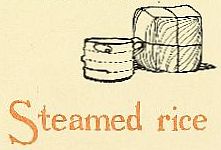
4. To test whether it is done, press several grains between the fingers. If not perfectly soft, cook longer.
5. If it becomes hard and dry, add a little boiling water from time to time.
6. A few raisins are sometimes cooked with the rice. Add these during the last fifteen minutes of cooking to prevent discoloring.
7. Serve with soft custard or cream and sugar. Plain cooked rice may be served as a vegetable.
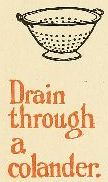
Use a plain boiler and a large quantity of salted boiling water.
| ½ cup rice |
| 5 cups boiling water |
| ½ teaspoon salt |
1. Wash rice by putting it in a strainer and shaking in a pan of water.
2. Drop a few grains at a time into boiling water, stirring well to prevent sticking.
3. Boil rapidly 25 minutes, or until soft when pressed between the fingers.
4. Drain through a colander. Pour over it 2 cups boiling water.
5. Set in a warm place to dry off, until ready to serve.
"Yes," said Mary Frances, putting the rice on to boil, "I'll make both. Oh, won't Mary Ann Hooper be pleased!"
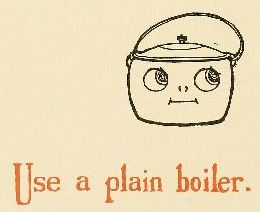
"Who's that?" asked Aunty Rolling Pin. "A new kind of cooking pan?"
"No, no, Aunty Rolling Pin," laughed Mary Frances; "she's an old lady who is sick. Aunt Maria told me about her at lunch. She's such a funny old lady."
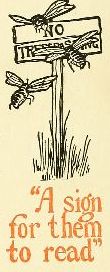
"It isn't funny to be ill," said Aunty Rolling Pin.
"No," answered Mary Frances, seriously, "but I meant she does such funny things: Last summer, she told Elvin Phelps if he didn't keep his bees from stealing honey out of her flowers, she'd shoot them—she (oh, dear!)—wanted—him—to tie each one—by his hind leg—to keep—them—home—oh, dear," laughed Mary Frances.
"What did he do?" asked Aunty Rolling Pin, anxiously.
"He told her (excuse my laughing—but it's so funny!) he would rather—put a 'No Trespassing' sign up in her garden for them to read! Ho-ho! Tee-hee." Mary Frances shook with laughter.
Silence in the kitchen until Mary Frances felt a tug at her tug at her dress.
Looking down, she spied Toaster Man.
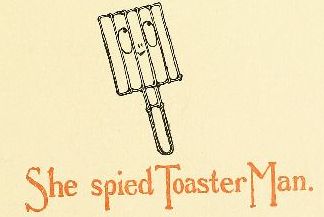
"Yes, you may speak," she smiled.
"Thank you,—I don't like to suggest, but a Dropped Egg on Toast would——"
"Be grand!" finished Mary Frances. "I'm sure I saw that recipe; yes, this is it!"
1. Put a pint (2 cups) boiling water into a shallow pan. Add ½ teaspoon salt.
2. Break egg in a saucer.
3. Whirl the water 'round and 'round with a spoon, and draw pan back on stove where it will simmer, but not boil hard.
4. Slip the egg into the whirling water.
5. Cook until the white is coated over the top.
6. Serve on toast.
Note.—It is best to cook only one egg at a time.
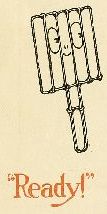
"Ready!" hummed Tea Kettle.
"Ready!" exclaimed Sauce Pan, and Mary Frances poured the hot water.
"Ready!" cried Toaster Man, and Mary Frances made the toast.
"Oh!" cried the little girl suddenly, her fingers crushing through the eggshell, "what a shame!"
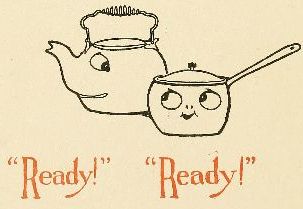
"A sharp rap with a knife and a quick pull with the thumbs," somebody said.
"Thank you," smiled Mary Frances, too busy to discover who was her helper.
Very soon she had lifted the poached egg with Per-for-at-ed Skimmer on the piece of toast.

When she had arranged the tray, she brought it out for the Kitchen People to see.
She had used her mother's daintiest china plates, and had scattered violets here and there over the cloth.
"Beau-ti-ful!" they exclaimed in one voice, as though that was all that could be said; but this is what Mary Frances heard as she closed the door:
"Wish I could eat," sighed Toaster Man.
"I know Jube'll want some of that," he added after a moment. "That cat can eat any time of day! I envy her appetite."
"Humph!" exclaimed Sauce Pan, "Jube won't get any of that. This time Jube'll get
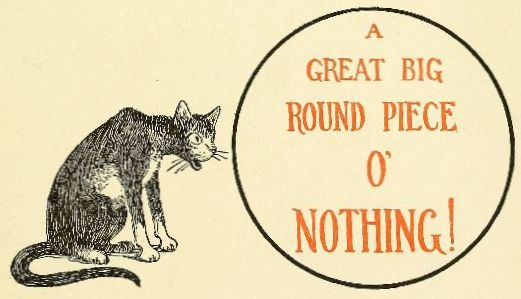
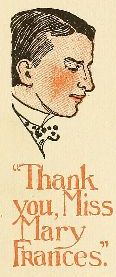
"Oh, Father," Mary Frances begged, "won't you come to-morrow? I didn't think you could get away from the store,—and I don't know so very much to cook."
"Thank you, Miss Mary Frances, I'll be most happy to lunch with you to-morrow," said Father, in a real so-ci-e-ty tone.
When Mary Frances went into the kitchen next morning, she said:
"I guess I'll make the dessert first; rice pudding is good cold."
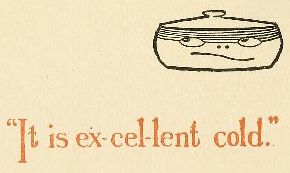
"It is ex-cel-lent cold," spoke the deep voice of Baking Dish, "es-pec-i-ally if made by[117]
| 3 tablespoons rice |
| ¼ cup sugar |
| 1/8 teaspoon salt |
| sprinkling nutmeg |
| 4 cups milk, or 3 cups milk and 1 cup water |
1. Pick over the rice, and wash by putting in a strainer and shaking in a pan of water.
2. Butter the baking dish.
3. Stir rice, sugar and salt into the milk.
4. Pour into the baking dish.
5. Sprinkle with nutmeg.
6. Cover with a lid, and bake slowly 2 hours.
7. Uncover and brown ½ hour.
Note.—Seeded raisins may be added before browning. If desired, a thin narrow shaving of the outside rind of a lemon may be used as flavoring. Put this in the milk with the rice.
"Why, thank you, Baking Dish," exclaimed Mary Frances. "Will you kindly say it over slowly? I'll do it then, keeping time with your directions."
This he did, and as Mary Frances slipped him into the oven, "I'm sure this will be good," he said; "I can always tell."
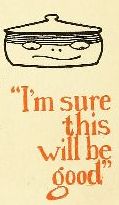
"I'm very glad," said Mary Frances, gratefully.
"Now for the Boiled Mutton," she said. "I guess, Iron Pot, you can tell me about that."
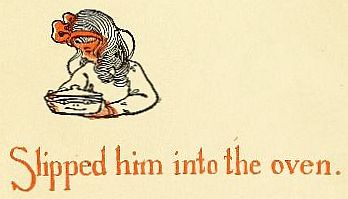
"Yes, ma'am," said Iron Pot, importantly climbing from the shelf, and eying critically the piece of meat Mary Frances had placed on the table.
"That's a pretty nice cut of meat—pretty nice. It will be all right to cook it as I will tell you. But, really, mutton is less greasy if it is boiled long enough before needed to let the gravy cool. Take off the cake of fat which will form on the top when cold. Of course, take the meat out as soon as it is tender, and after 'skimming' the gravy, put it in again to re-heat."
"I haven't time!" said Mary Frances, anxiously.
"You can put yours in a bowl, and stand the bowl in ice water to cool the liquor quickly, and do the same thing that way, now——"
"You give the recipe?" asked Mary Frances.
Iron Pot looked pleased, and began:
About 3 pounds rack of mutton or "yearling."
1. Wipe with a damp cloth.
2. Pour 3 cups boiling water into a large pot.
3. Throw in 2 peeled onions.
4. Put in the meat. Cover.
5. Boil 10 minutes.
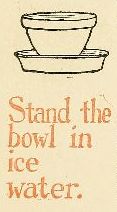
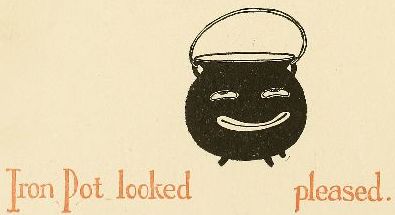
6. Draw pot to back of stove where it will simmer, or just bubble, until meat is tender when tried with a fork, which will be in about 1½ hours.
7. Take out the meat.
8. Skim off the fat from the surface of the liquor; or if there is time, cool, and remove the hardened fat.
"Correct!" exclaimed Sauce Pan, bending over Mary Frances' book. "And the gravy is made——"
"Saucy!" began Iron Pot, in a boiling rage; but he suddenly stopped, as Mary Frances shook her finger at him.
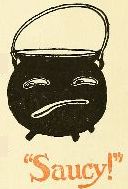
"It's all right this time," she said.
"It is your place, Sauce Pan——"
"It is my place," said Sauce Pan, trying not to let Iron Pot see how pleased he was to tell about
No. 26.—Sauce or Gravy for Boiled Mutton.
1. After cooling and skimming off the fat, measure the water in which the meat was boiled.
2. To each cupful, allow
1 tablespoon flour, ¼ teaspoon salt, ½ teaspoon vinegar.
3. Moisten these with a little cold water.
4. Stir them into the boiling gravy.
5. Add 1 tablespoon finely minced parsley.
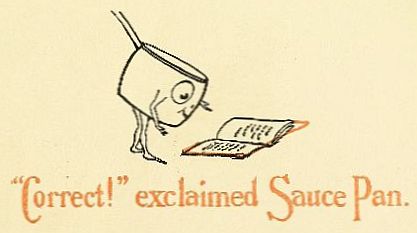
"Thank you both, my friends," said Mary Frances, lifting Iron Pot.
"My, but you're heavy!"
"'Tis true," said Iron Pot, sadly, "all my old-fashioned friends, like Iron Tea Kettle—glancing toward the new Tea Kettle—and Caldron, are gone. But," he added, brightening up, "it has been proved that for boiling meats, no modern 'light-weights' could 'do them up so brown!'"
"We'll prove it again," laughed Mary Frances. "I do believe I'll have a splendid lunch for Father—a regular big man's lunch. Listen!
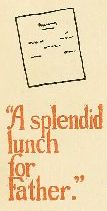
"And now I'll set the table! I think I'll use the very best silver, and the prettiest dishes—it will please father, I know."
This is the way Mary Frances set the table for her father and Billy's lunch. Mary Frances sat in her mother's place.
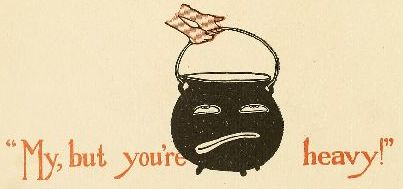
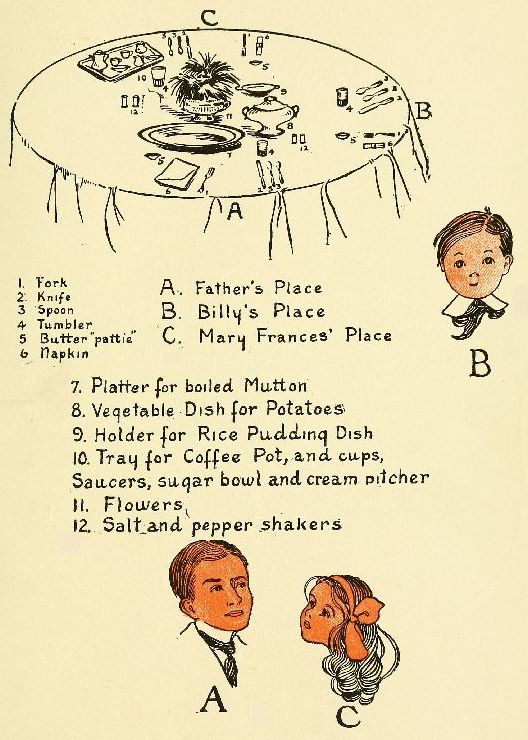
Just as Mary Frances was finishing getting the lunch, the 'phone bell rang and Billy answered.

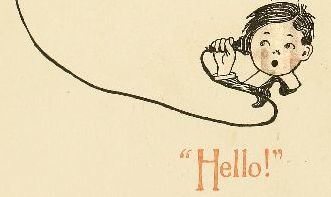
This is what Mary Frances heard:
"Hello!"
—————
"Yes!"
—————
"Too bad, Father, can't you?"
—————
"Well, I'll tell her, but I hate to, awfully. She's been hard at work all the morning."
—————
"I?—Oh, I attended to the fire for her, then went upstairs to make those drawings."
—————
"Oh, yes; I'll look after her, all right."
—————
"Yes, she is—a regular 'brick!'"
—————
"All right. Good-bye!"
—————
"Sis!"
"I know, Billy," Mary Frances sobbed. "I know!—Father[123] can't come, and everything is ready. Oh, dear! Oh, oh,—de—ar!"
"Oh, I say, Sister," said Billy; "I'll pretend I'm Father—won't that do? And—oh, yes! I'll show you how to fold a napkin into 'Cinderella's slipper!'"
"Where did you learn how?" Mary Frances began to dry her tears.
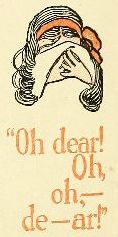
"Silly Billy!" exclaimed Mary Frances. "Please show me the trick now, will you?"
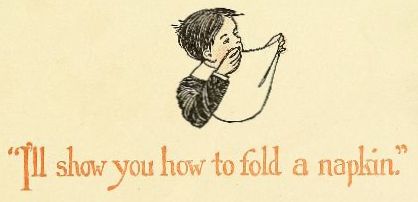
"Yes," said Billy, "and then I'll eat Father's share, as well as mine, of a very 'grand' lunch—if my nose isn't deceiving me."
"Well," said Mary Frances, "that will help some; but please fold the napkin."
And Billy showed her this:
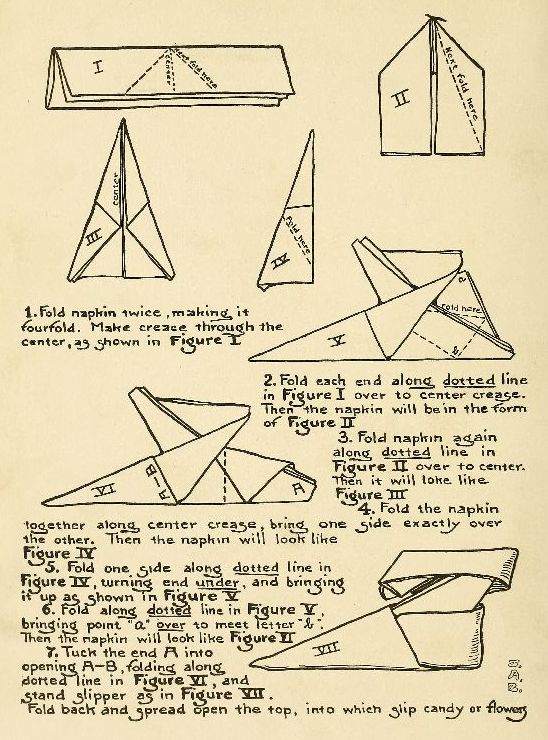
Mary Frances was so pleased with the Cinderella's slipper that she folded all the napkins on the lunch table.
"Looks like a hotel table," said Billy.
"Well, Billy," said Mary Frances, "I know fancy folded napkins aren't so nice for home—but you don't mind."
"Indeed, no," said Billy; "I feel proud."
While they were at lunch there came a knock and a boy from the store handed in a box of candy and a little note addressed to
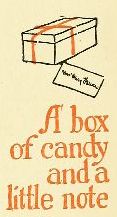
"Ahem," said Billy, as Mary Frances opened the box, and offered him some candy "since Father couldn't come, he sent a sweet guest in his place."
"It isn't very nice to eat up your guest," laughed Mary Frances.
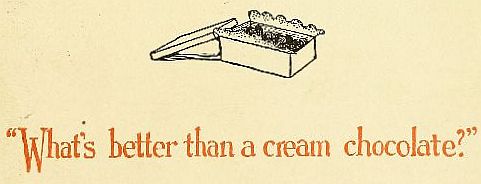
"Mary Frances," asked Billy, "what's better than a cream chocolate?"
"Two cream chocolates, I guess," said Mary Frances, passing the box—"but, Billy, listen:
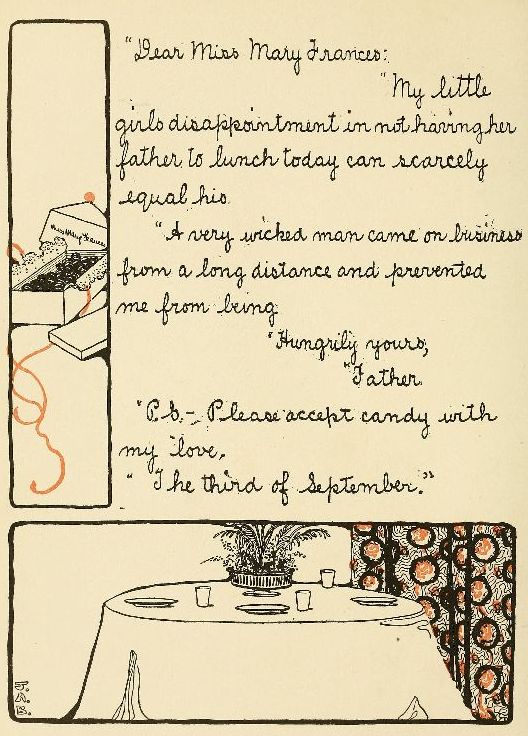

"I do wonder whether the Kitchen People will talk and help us—or whether they can help but one person. It would be pretty hard without their help; but let me read the recipe again:
1. Pare and slice apples, dropping into cold water.
2. Cook slowly until soft.
3. Mash well and measure.
4. To every cupful, allow
| ¼ cup powdered sugar, |
| white of 1 egg, well beaten. |
5. Add a spoonful of each to apples until used, stirring in lightly each time.
6. Add 1 drop vanilla for each cup of apples.
7. Serve with cream.
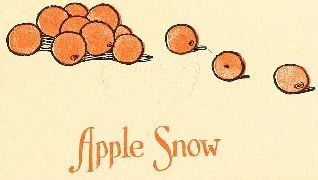
"I guess I'll go ask the Kitchen People about it right away!"
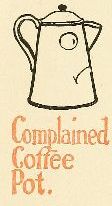
But some one was talking.
"Wonder what little Mistress will cook to-day."
"I'll see if they know," said Mary Frances to herself.
"It's hard to remember so far ahead," complained Coffee Pot. "I wish it was my turn all the time."
"Oh, you have more chance than most of us, except Tea Kettle," exclaimed Sauce Pan. "I expect, though, most of us will be used a lot now,"—airily.
"Why?"
"Oh, I read a poem about it, which proves——"
"Say it!" interrupted several Kitchen People. ("What fun!" thought Mary Frances. "I'll try to remember it.")
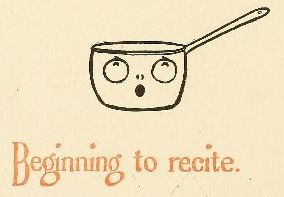
"All right!" said Sauce Pan, proudly, beginning to recite:
"Beautiful!" exclaimed the Kitchen People.
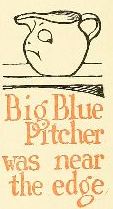
"If that isn't too silly for anything in the world!"
It was a new voice. Mary Frances peeped out. Big Blue Pitcher was near the edge of the shelf.
"It's perfectly true, though," re-tort-ed Sauce Pan, angrily.
"There! There!" said Aunty Rolling Pin, soothingly; "don't get so excited! Of course it's true."
"You bet it's true and I can prove——"
"Oh, my ear!" cried Blue Pitcher, toppling dangerously near the edge of the shelf. "Prove it! Prove it! You can't!—you conceited id-i-o-ti-cal old Sauce Pan! I dare you!"
Over he went—Crash!!!—broken into pieces.
"He's dead," exclaimed the excited Kitchen People, and began to wring their funny little hands, and to cry
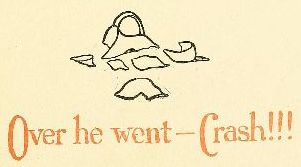
"Oh, why did-de-die?
"Oh, why did-de-die?
"Oh, why did-de-die? did-de-die-die-die?"

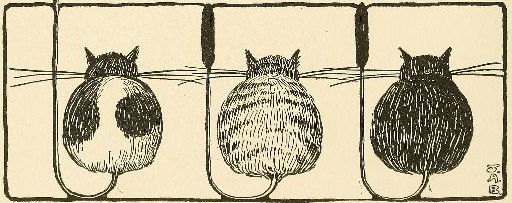
They kept up this chant until Mary Frances stepped out into the kitchen.
"Why did-de-die?" demanded Mary Frances, but not a word was answered.
"What will Mother say?" she said, sweeping up the broken pieces of poor Blue Pitcher. "Won't she be sorry!"
"Yes, she will!" said Sauce Pan; "but it was his own fault! I think Jubey'll be sorrier! She thought Blue Pitcher one of her best friends. They were very con-fi-dent-ial. Only yesterday I heard her telling him that always after eating a hearty meal for which she had no appetite, she felt hungry."
"What did Blue Pitcher say?" asked Aunty Rolling Pin.
"Never paid any 'tention—just said: 'Humph, Jubey, I know where a lot of cat-tails grow!'
"'You do, do you?' said Jubey. 'I'd like to know.'
"'On little kittens!' said Blue Pitcher."
The Kitchen People laughed.
"Bet Sauce Pan made that all up," whispered Coffee Pot.
"No," said Sauce Pan, overhearing, "I—I don't tell tails!"
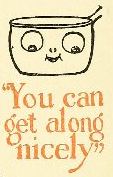
"Now, Kitchen People, I promised to give a friend of mine a cooking lesson. If I bring her now, can you help us,—as you generally do me?"
"No, child," said Aunty Rolling Pin, smiling; "but perhaps you have learned by this time pretty nearly well enough to do an easy lesson without our help. We can't talk before other people, you know. Perhaps the little girl's own Kitchen People will help her some time."
"Well, it's a very easy lesson, I think.—'Apple Snow,' she added. And 'a promise 's a promise!'"
"Yes," interrupted Sauce Pan, "you can get along nicely with that recipe."
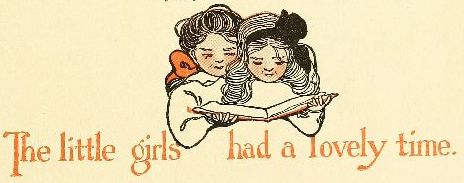
"Perhaps I can," said Mary Frances, happily. "I'll go over for Eleanor now."
The little girls had a lovely time doing just as Mary[132] Frances' mother had written in the recipe. The Kitchen People watched out of the corners of their eyes, but never said a word.
"Oh, isn't this good," sighed Eleanor, eating the light, delicious dessert. Then, "Mary Frances, I know; I'm going to ask my mother for a cook book! I wonder if you'll let me borrow yours some time to show her."
"Of course!" laughed Mary Frances.
Just then there was a ring at the door-bell.
In came Aunt Maria with a mysterious looking bundle.
"Why, my dear, you have company, I see," said the old lady with a smile.
"Yes, ma'am," said Eleanor, "Mary Frances has been giving me a cooking lesson."
Mary Frances shook her head and put her finger to her mouth, but Eleanor didn't understand.
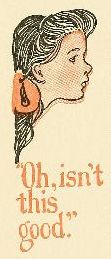
"A cooking lesson!" exclaimed Aunt Maria. "A cooking lesson! Mary Frances! A cooking lesson!"
Then she began to laugh.
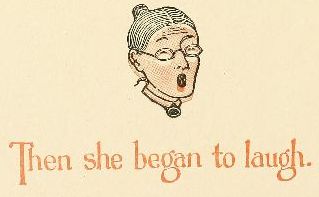
"Oh, my dear!" she said. "I'm so happy I'm[133] crying. Silly old me!" and she wiped the tears from her spectacles.
"Mary Frances, dear," she said, at length, "I heard about the lovely things you made Mary Ann Hooper; and I found out, too, by wheedlin' it out of her, about the cooking lessons—and here's a surprise for you," and she handed the bundle to the little girl.
"Oh, Aunt Maria!" cried Mary Frances unwrapping it. "Look, Eleanor!—a little cap and apron!"
"To wear at your cooking lessons," fluttered Aunt Maria.
"How dear and lovely!" (Trying them on.) "Look, Eleanor, they just fit!"
"You're the happiest girl in the world!" sighed Eleanor.
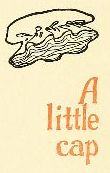
"I should be, if Mother were really well," said Mary Frances; "but she's much better, and is coming home soon. Aunt Maria," she added,—"oh, I want you to share the secret! I'm doing all the lessons she had written out for me in my cook book—to surprise her when she comes home!"
"Good!" said Aunt Maria. "I'll tell you!—you can get dinner ready the day she comes!"
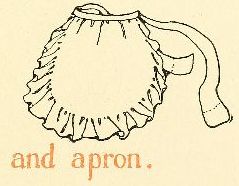
"Wouldn't that be perfectly lovely!" said Mary Frances.
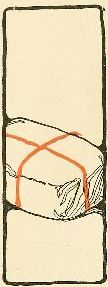
Then, suddenly thinking,—
"Oh, Aunt Maria, excuse me, please! Won't you have some of our lesson?—Some of the Apple Snow we made for our lesson, I mean?"
"I'd ap-pre-ci-ate the kindness," said the old lady a little stiffly, as though a bit ashamed of her softness a moment ago. But after tasting the treat, she said:
"It's the most beautiful snow I ever saw, little girls,—even more beautiful than that on which I, so many years ago, used to pull a sled."
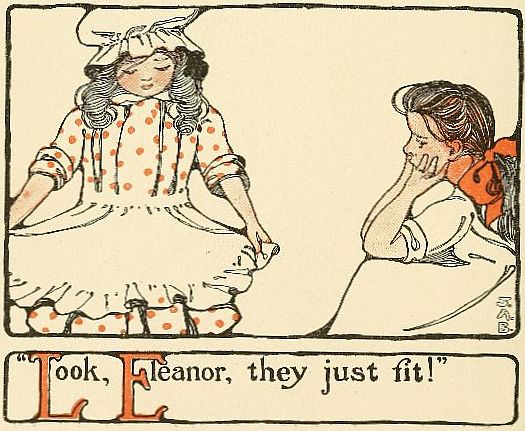
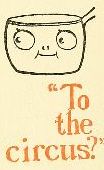
"To the circus?" guessed Sauce Pan.
Mary Frances shook her head.
"Not to-day."
"To the fair?" guessed Coffee Pot.
"No!"
"To the Zo-ol-og-ic-al Garden," guessed Sauce Pan, again, beginning to recite:
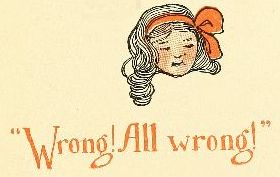
"Wrong!" laughed Mary Frances. "All wrong!—Perhaps this will help you guess"—opening the cook book.
1. Hard-boil eggs.
2. Drop into cold water. Remove shells.
3. Cut each in half lengthwise.
4. Turn out yolks into a bowl.
5. Carefully place whites together in pairs.
6. Mash yolks with back of a spoon.
7. For every 6 yolks, put into the bowl
| 1 tablespoon olive oil or melted butter |
| ½ teaspoon mustard (the kind prepared for table) |
| ½ teaspoon salt |
| dash cayenne pepper |
8. Rub these together thoroughly with the yolks.
9. Make little balls of this paste, the size of the yolks.
10. Fit one ball into each pair whites.
Note.—If used for table, serve with White Sauce poured around them. If used for picnic, wrap waxed paper around each until needed.
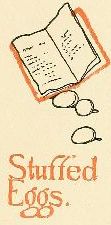
"It's a picnic! It's a picnic!" cried the Kitchen People.
"Yes!" explained Mary Frances, "that's it! Aunt Maria is giving me a picnic to 'celebrate my ambition,' she says—whatever that means. Anyhow, Father's coming. He's going to make up for the lunch he couldn't come to. I'm so happy!"
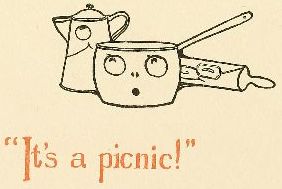
"So'm I! Goody! Goody! I'm all ready!"
Mary Frances turned.
"If it isn't Basket!" she cried. "I had no idea you——"
"That I wanted to go?" asked Basket proudly. "My family are the most important 'picnickers' at any picnic! We always go!"
"Well, to be sure!" exclaimed Mary Frances. "Here, wait—these eggs will be ready in a minute!"
"Tuck the napkin in carefully, please," said Basket. "I won't spill them out. Anything else?"
"No," said Mary Frances. "Aunt Maria said I could bring just one thing—and to surprise everybody; so I have not told anyone what I am going to bring. I wonder if——"
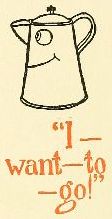
But her thought was cut short by Coffee Pot's crying excitedly: "I want to go! I want to go! I—want—to—go! go! go! go! I want to go—go—go—go!—go—go!"
"Oh, you can't go!" said Sauce Pan. "Why—you!—you'd—you—you'd——"
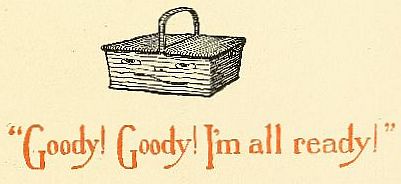
"That will do," said Mary Frances. "I'll take you, Coffee Pot. Maybe Aunt Maria's little coffee[138] pot won't be large enough for all of the picnic. Eleanor and Bob are going with us!"

Coffee Pot looked tri-umph-ant-ly at Sauce Pan, but seemed too happy to say anything.
"Good-bye, Kitchen People," said Mary Frances, "I wish I could take you all."
"Good-bye," cried the Kitchen People; "hope you'll have a lovely time!"
"I'd be scared," said Sauce Pan, glancing at Coffee Pot. "Who knows what's in the woods?" And as Mary Frances closed the door, he was singing:
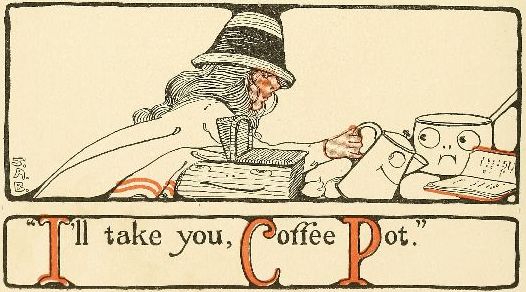
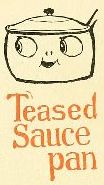
"Nope," said Coffee Pot, "the 'airing' did me good. I feel lots clearer."
"Tell us about it?"
"Oh, I'm not good at story telling! The Aunt told about the funniest recipe she knew,—called 'Merry Land Biscuits,' I think. Anyhow, she said to 'beat 'em twenty minutes with an axe!'"
"That's a kitchen person I never heard of," said Tea Kettle.
"Did the Aunt like the little Miss' cooking?" asked Aunty Rolling Pin, anxiously.
"Yes, and she talked about Mary Frances' de-vel-op-ment of char-ac-ter—whatever that is. It seemed to have something to do with cooking, for at the same time, she told about the things our little Miss had made, and seemed so proud.

"'May I see your book, my dear?' she asked Mary[140] Frances (for our little mistress had the book tucked under her arm). 'How far are you?' And when Mary Frances showed her:
"'Candy!' she exclaimed, 'Why, to-morrow, my dear (she never used to call her my dear), you can have a Candy Pull—only,' she laughed, 'it isn't the kind that is pulled.'
"'Oh, Aunt Maria,' said Mary Frances, 'that's the loveliest thought—the Candy Pull, I mean.'"
"Humph," said Sauce Pan, "I don't think so! That means we can't help her."
"Oh, no, it doesn't," said Aunty Rolling Pin. "We can help her a great deal by just doing our part. Don't you see? She doesn't need us as she used to."
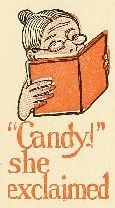
"I 'spose we ought to be glad," said Sauce Pan.
"Now, Eleanor," said Mary Frances that evening, "Father and the boys aren't invited until after the candy is made."
"Where are they now—do you know?" asked Eleanor.
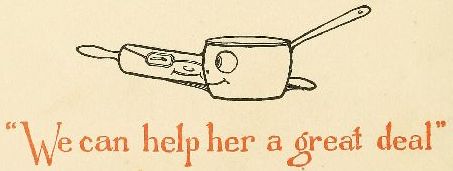
"Father and Aunt Maria are in the library, and[141] the boys are up in Billy's den! So we'll read the recipes over first thing, and get started soon as possible."
"Do read them, Mary Frances," said Eleanor. "I'm so anxious—I'm just 'crazy' to learn how to make them."
"Well," said Mary Frances, "the first is 'Pickaninny Fudge!' Isn't that just like Mother!—to call Chocolate Fudge that cute name!"
"Hurry, Mary Frances; do read it," cried Eleanor, delighted.
Mary Frances read:
No. 29.—Pickaninny Fudge.
2 cups sugar
1 cup milk
2 tablespoons butter
4 squares chocolate (4 ounces)
5 drops vanilla
1. Put sugar, milk, chocolate and butter together in a pan.
2. Boil until a few drops harden when dropped into cold water.
3. Butter a platter.
4. Add Vanilla to candy and stir while it cools.
5. Cut into squares with a buttered knife while still soft.
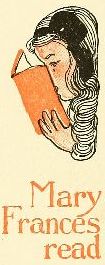
"That just makes my 'mouth water,' Mary Frances," said Eleanor. "If the next is as good as that——!"
"It is!" declared Mary Frances. "Listen!
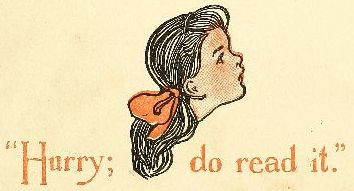
| 1 cup brown sugar |
| ½ cup granulated sugar |
| ¼ cup cold water |
| white 1 egg |
1. Boil sugars and water together until a few drops harden when dropped into cold water.
2. Beat white of egg stiff.
3. Pour the sugar syrup very slowly upon the white of egg, beating all the time.
4. Butter a platter.
5. Drop by tablespoonfuls on the platter.
6. Put a half walnut on each little mound or "kiss."
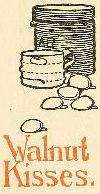
"These are 'grand,'" said Mary Frances. "Mother made some just before she was ill."
"But have you the walnuts?" asked Eleanor, anxiously.
"Yes," explained Mary Frances. "Aunt Maria saw these recipes yesterday at the picnic, and she brought over a lot of walnuts ready for us. If she hadn't, I'd never have thought of them, I guess."
"Now—to work! You can make the Walnut Kisses—if you like."
"If you'll explain it all to me," said Eleanor.
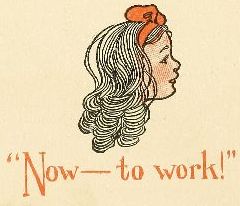
"Of course I will," said Mary Frances; "but you[143] see, Mother has written out every single action just as you do it,—that makes it so easy. See if you can do it alone—try."

"I'd love to," said Eleanor.
The little girls worked pretty quietly until they were ready to pour out the candy.
"How are you getting along, children?" inquired Aunt Maria at the door.
"Oh, Aunty, I'm so glad you came" said Mary Frances; "we were just a little afraid—without help."
"Yes, I see," said Aunt Maria; "you might easily be burned. This is perfect so far. Now——" and she showed the children how to pour out the candy.
("Almost as well as the Kitchen People could," thought Mary Frances.)
"Walnut Kisses," said her father, kissing Mary Frances good-night, "are next best to real kisses, which, although they are made of nothing——"
"Oh, Fudge!" exclaimed Billy, and everybody laughed.
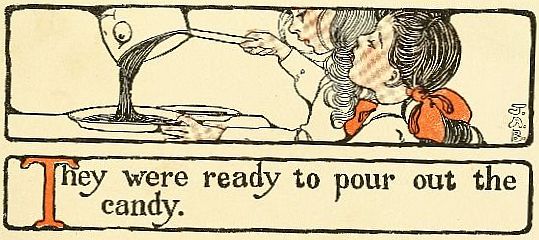
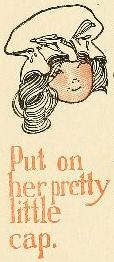
Mary Frances tied on her new apron and put on her pretty little cap.
"Fly time is nearly gone," said Sauce Pan, "and—school time is almost here," he added, seeing Mary Frances didn't seem to notice.
"Yes," she said, "but before school time, there's a grand good time—Mother comes home to-morrow!"
"Whew!" whistled Tea Kettle. "So soon?"
"Well," said Mary Frances, "it doesn't seem soon when I think of it without my cooking lessons—but when I think I'm nearly through the book——"
"What's to-day's lesson?" asked Aunty Rolling Pin. "I'm so anxious you do get through!"
"Thank you, Aunty Rolling Pin, I must tell you. I'm going to give a Tea Party!"
"A Tea Party!" exclaimed Tea Pot, clapping his lid up and down. "Oh, lovely!"
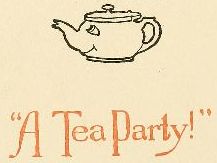
"Oh, this is a Tea Party without tea," said Mary[145] Frances. "We're going to have two kinds of cake,—and cocoa!"
Then, seeing how disappointed Tea Pot looked:
"Oh, I will have tea, too. Aunt Maria without tea! That will never do!"
"Now for the next recipe:
| 2 eggs |
| 1 cup sugar |
| 1/3 cup boiling water |
| ½ teaspoon vanilla (or lemon extract) |
| 1 cup flour |
| 1½ teaspoon baking powder |
| dash of salt |
1. Separate yolks of eggs and beat in a large bowl.
2. Add gradually half the sugar, stirring well.
3. Add the boiling water slowly.
4. Add remaining sugar, and the flavoring.
5. Sift together twice flour, baking powder and salt.
6. Sift by small quantities into the mixture, beating well each time.
7. Beat whites of eggs and fold them into the cake.
8. Grease pan. Toss around in it ¼ cup flour. Throw out. This prevents sticking.
9. Pour in the cake.
10. Bake in a moderate oven about 35 minutes.
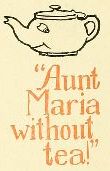
"Humph!" said Aunty Rolling Pin, "that's all[146] right, but it doesn't give you much idea how the oven should be."
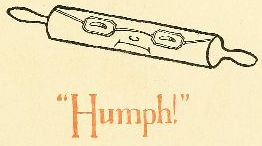
"No," explained Mary Frances, "I 'spose Mother intended to show me about that."
"Of course, child," said Aunty Rolling Pin, "that was it. Now, I'll tell you all about cake——"

"What's that!" a queer, muffled voice.
Mary Frances started in surprise.
A great com-mo-tion inside the pantry, and the sound of many little voices! Then she made out the words:
"Get out of my way! Here, you, step aside!" (Then a little shriek or two followed by the sound of falling tins.) "Oh, you knocked my nose. There! that makes the fiftieth dent! No wonder I look old and worn out. Can't you wait a minute?"
At length there came a pounding on the door, and a high little voice—or was it two voices?
"Let me out! Oh, I say, please let us out!"
"Mercy!" thought Mary Frances, "I hope there isn't going to be any trouble." And she cautiously opened the pantry door a little way. The two Cake Tins pushed their way out.
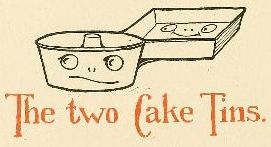
"Oh, thank you!" they said, breathlessly, in chorus (looking at each other all the while as though they'd learned and rehearsed every word). "I thought I'd never get out to help! I've listened through the door to every lesson, just hoping my turn would come. There I was back of the other pots and pans, and when I heard 'Cake' I just jumped!"
"As I had just started to say"—Aunty Rolling Pin began.
"What do you know about cakes!" cried the Cake Tins, angrily. "If everybody'd just mind his own cooking—who ever rolls cakes?"
"Well, I know about cookies," said Aunty Rolling Pin; "and besides, I know about most things,—I belonged to a real cooking teacher!"
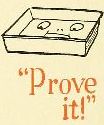
"Prove it!" cried the Cake Tins.
"I will," said Aunty Rolling Pin; "here's part of a lecture the teacher used to give:

"Now, ladies, you can see the ex-ceed-ing-ly good texture of this cake, as I drop it from the spoon. The nu-tri-tive value of the ut-il-ized com-po-si-tion is unequaled, except in rare cases of cul-in-ary e-con-om-y. For instance, the proteids, the car-bon-a-ce-ous contrib-u-tions[149] plus the con-di-ments, afford an instance of un-u-su-al strength-giving power. The in-ex-cus-a-ble prod-i-gal-i-ty of the A-mer-i-can house-wife——'"
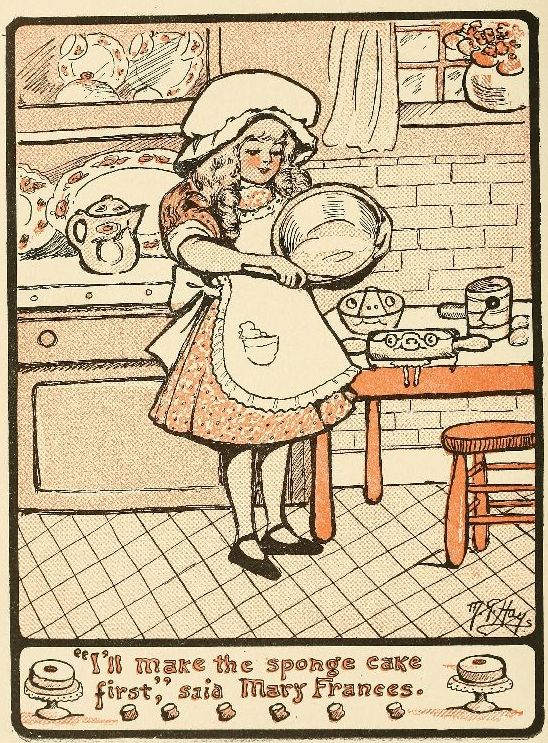
"Whew!" whistled Tea Kettle, "for pity's sake, stop it!"
"Humph!" said Square Cake Tin, "I don't see that that proves you know anything about cake. Now I'll explain:
"There are really only two kinds of cake in general:
"1. Cakes without butter, or some form of sponge cakes.
"2. Cakes with butter, or plain cakes.
"More important than the mixing of the cake is the baking.
"Have a rather low fire, which will grad-u-al-ly increase in heat without adding more fuel.
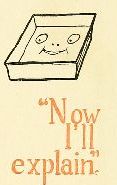
"Rules:
"Thin cakes require a hotter oven than larger ones.
"Molasses cakes will burn easily, so require a cooler oven than others.
"Sponge cakes require a 'slower' oven than butter cakes.
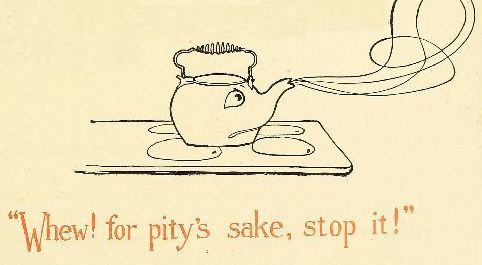
"Cake is done when it shrinks from the sides of a[150] pan, or when a straw comes out dry. You know the way, don't you?"
"Yes," said Mary Frances. "My, what a lot you do know!"
"Now, read the next recipe, please. The butter kind," said Mary Frances; whereat the Cake Tins looked pleased.
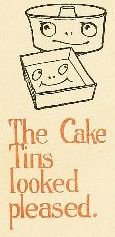
| 4 tablespoons butter |
| 1 cup sugar |
| 2 eggs |
| ½ cup milk |
| 1¼ cups flour |
| 2 teaspoons baking powder |
| 1/8 teaspoon ground mace |
| dash of salt |
| 1 teaspoon vanilla |
1. Put butter in a bowl; add sugar. "Cream" or rub thoroughly together.
2. Beat yolks of eggs. Add to butter and sugar, stirring well.
3. Mix and sift twice flour, baking powder, mace and salt.
4. Add one-third of the milk to the yolks, butter and sugar.
5. Sift in one-third of the flour. Do this until all the milk and flour are used, beating well each time.
6. Add vanilla. Beat well.
7. Beat white of eggs light. Fold them into the cake.
8. Grease shallow pan as in No. 31. Pour in the cake.
9. Bake in moderate oven about 35 minutes, or until it shrinks from the pan.
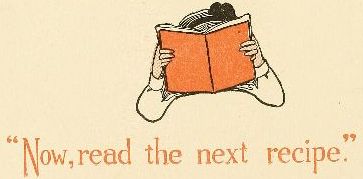
"We'll both be used!" exclaimed the Cake Pans, joyously. "I told you so! I told you!" they cried at each other as though having an argument.
"Come," said Mary Frances, "less talking. We must get to work."
"Look at the oven first," said the Cake Pans, as Mary Frances started to break the eggs.
"Is it right?" asked the little girl, lifting them up to see.
"Yes," they said, "it will be just right when we are ready."
"All the ma-ter-i-als you'll need ready?" asked Round Cake Tin after a minute.
"Yes," looking over the table, "I see—everything. Good!"
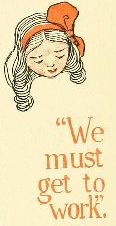
"I brought the butter into the warm room an hour ago," said Mary Frances, "so that it would be softened by the time I needed it. I'll make the sponge cake first, as the oven will be cooler then."
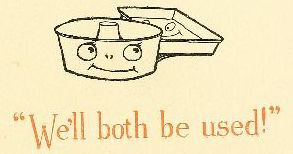
"Right!" cried the Cake Tins; "but when you open the oven door, be careful to do so gently, as any jarring will break the 'gas bubbles' very easily, doing much more harm toward making the cake heavy than[152] the air; in fact, if the door is opened carefully, and not too soon, it does no harm."
With the Cake Tins' help, a warm and tired, but very happy little girl brought two golden brown fragrant cakes to the table one-half hour before lunch time.
"Turn us on our sides," panted the Cake Tins, "to let us cool off quickly and evenly. My, but it was warm in there!"
"How beautiful the cakes look!" said Mary Frances, doing as she was told.
"Why not take a taste?" Square Cake Tin asked.
"Oh, it's just before lunch time," said Mary Frances, "and would spoil my ap-pe-tite. Mother doesn't allow me——"
"Just one sweet mouthful?" tempted Cake Tin.
"It seems so good. I guess I will—just this once," and cutting a piece, she ate it.
"Oh," she cried, "my beautiful cake! Look, it's sinking down in the middle!" The tears came to her eyes.
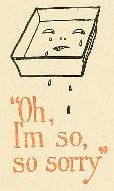
"Oh, I'm so, so sorry," said Cake Tin, "I was too excited and proud!"
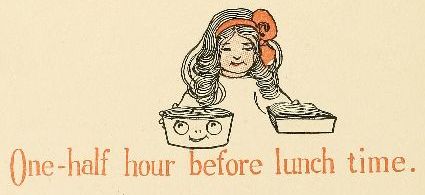
"Why didn't you tell me," Mary Frances asked, "that a fresh cake, if cut, would 'fall?'"
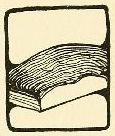
"Oh," said Cake Tin, "I meant to be so helpful. I'll try never to be too proud again."
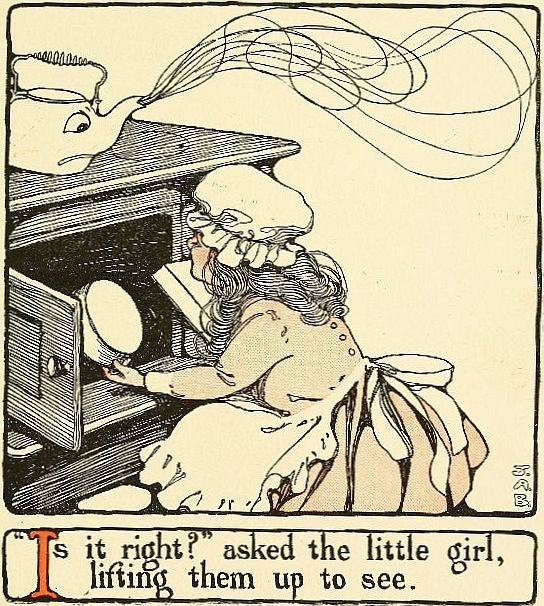
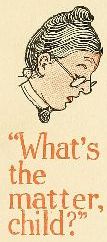
"What's the matter, child?" asked Aunt Maria, anxiously. "'Homesick' for Mother?—or was to-day's lesson too hard?"
Then Mary Frances told of cutting and eating the fresh cake. "And, Aunt Maria," she said, the tears flowing down her cheeks, "it went
"Never mind, dear child," Aunt Maria comforted her. "I did the same thing to my first cake. I remember it well!"
"You did, Aunt Maria?"
"Yes," said the old lady. "I'll tell you what we'll do! I'll bake a cake in place of yours for to-night's party. Don't tell any one."
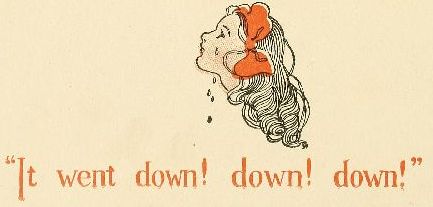
"Oh, thank you, Aunt Maria," cried Mary Frances; "that's so kind!"
"Not a word to any one!" cau-tion-ed Aunt Maria. "What else do you have?"
"Cocoa," said Mary Frances; "I can make that."
"My," smiled Aunt Maria, "I'm so proud."
After the games and riddles, Mary Frances excused herself from her guests, and made the cocoa and the pot of tea for her aunt. Then Billy carried in the tray, on which she had placed the cake, and the cups and saucers, plates, napkins, and Chocolate Pot, and, oh, yes, Tea Pot, for Aunt Maria; and she poured the cocoa like a real grown lady, while the boys passed the plates and the cake, and served the guests to the cups of cocoa.
"Did Mary Frances make this cake?" asked one of the guests. ("I'm awfully glad she didn't ask about the other," thought the little girl.)
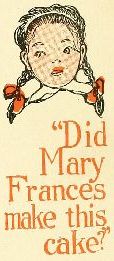
"Yes," said Eleanor's brother Bob. "Yes; knowing the greatness of the present oc-ca-sion, I have written a poem, en-ti-tled, 'Ode to the Cook' (bowing to Mary Frances), which, with your kind indulgence, I will now read:"
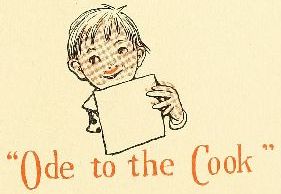
"Begin!" laughed Mary Frances.
Bob cleared his throat and began:
"Time to weep?" asked Billy, pa-thet-i-cal-ly.
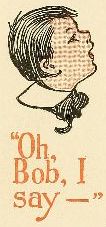
"Now, Billy," cried Mary Frances, "what have you been telling?"
"Oh, Bob, I say—" said Billy.
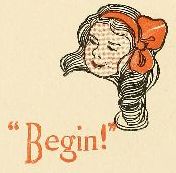
"Mary Frances, don't mind Bob," interrupted[157] Eleanor. "You see what I have to stand all the time." And Mary Frances laughed heartily.
"Did you think I minded Bob?" she asked.
"Show you forgive me, Mary Frances," begged Bob, "by letting me have another cup of cake, and another piece of cocoa."
"Not another," laughingly corrected Mary Frances. "To be polite, I believe I must pretend I didn't notice you'd had any."
"You certainly are kind, Mary Frances," said Bob, "when I don't know how many pieces——"
"I know," cried Eleanor,—"this makes the fifth!"
"Well, Nell," begged Bob, "don't tell Mother."
"You deserve it," said Eleanor.
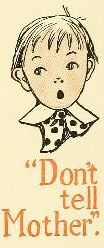
"Come," said Billy, "all ready! another game! 'Blind feeds Blind!'" And they blindfolded the boys' eyes, and sat them opposite each other, each with a plate of little pieces of cake, and a spoon. They were to try to feed each other. The one who dropped the least number of pieces, and whose cake was first gone, won. It was very funny! Sometimes the spoon was poked into the other boy's ear; sometimes it hit his nose.
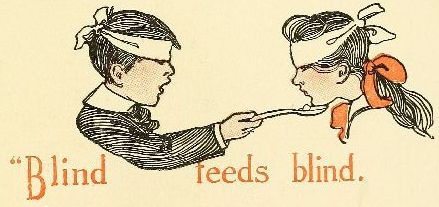

"Everything was grand, Mary Frances," said Eleanor, "and it was the loveliest party!"
"I think so, too," smiled Aunt Maria.
"One last riddle," said Mary Frances' father, bidding the young people good-night:
"'Why is Mary Frances the happiest girl in the world?'"
Then they all guessed——
"Because 'Mother' is coming home to-morrow!"
"Oh, Mary Frances," laughed Eleanor, "I've had more fun! Good-night, dear." And "So have we all of us," and "Thank you," cried the others.
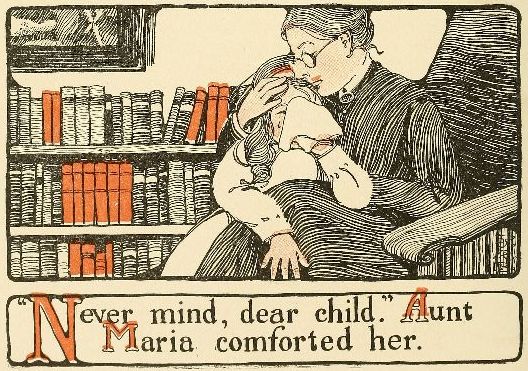
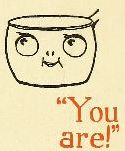
"You are!" solemnly declared Sauce Pan,—"I mean you are our little 'Miss'—Miss Mary Frances."
"My, I feel so relieved!" said Mary Frances. "Since that is so, I'll tell you why I'm so excited! Mother is coming home to-day—and—I'm going to get dinner. Isn't it lovely?"
"Everybody," shouted Tea Kettle, "ready!"
With that, every utensil in the kitchen sprang to its queer little feet.
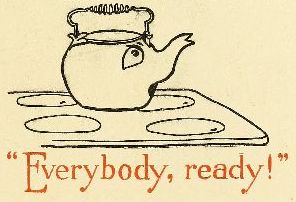
"We're all quite ready, Mistress," said Tea Kettle, trying to make a bow, but looking very clumsy and ri-dic-u-lous, trying at the same time to keep water from spilling out of his nose.
"Thank you, everybody," said Mary Frances, very gravely, however. "I'll not need anyone just now but Aunty Rolling Pin. Where is she?"
"She's out picking cherries to make a pumpkin pie," said Sauce Pan in a loud whisper to Pie Plate.
"Here I am, child," Aunty Rolling Pin's voice answered. "I can't seem to roll out. Get out of my way—you!"
With that, Knife, Fork and Spoon slid to the side of the table, and she rolled to the edge.
"What is it, child?" she smiled.
"It's the grandest thing!" said Mary Frances.
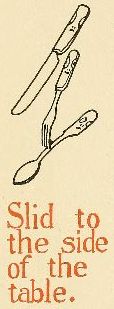
Spread cooked heart-shaped pastry shells with preserved cherries. See No. 34.
"Tarts!" chuckled Aunty Rolling Pin. "Oh, my handles! I'm so happy! Are the cherries ready, child?" she asked, anxiously.
"Yes," said Mary Frances, "I am to use
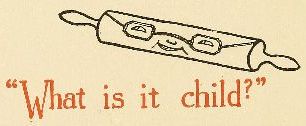
| 1 cup flour |
| ¼ teaspoon salt |
| 1/3 cup lard |
| 1/3 cup cold water |
(Use as little water as possible.)
1. Sift salt and flour into a bowl.
2. Rub lard into flour with finger tips until like coarse powder.[161]
3. Add half the cold water, stirring with a knife to form a stiff ball. Keep this on one side of the bowl.
4. Stir in more water until the remaining flour forms a ball. Press these balls together.
5. Roll out. Fit to pie plate. Trim off overhanging edges.
6. Bake in a hot oven.

"That's it!" exclaimed Aunty Rolling Pin, joyously. "I was afraid there might not be 'shortening' or lard enough in the recipe. The whole art of making good pastry is in having one-third as much lard as flour, and using as little water as possible.
"I was afraid, too, that your mother would not put 'pastry' in the book, for when flour or starch grains are coated in fat they are too dry to 'swell' well in cooking, and cannot burst open. They are not, I'm sorry to say, a very di-ges-ti-ble food."
"I'm glad she did, though," said Mary Frances; "she will not often let us eat 'pastry,' but I 'spect she im-ag-ined how pleased I'd be. I wonder why pie tastes so good, if it isn't good for us? My, how much I have to do! Now I'm ready!"
At these words, Middle-sized Bowl sprang upon the table.
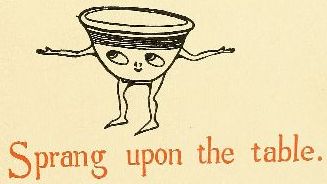
Measuring Cup dumped a cup of flour into it, and ran toward the lard kettle, which was standing near.
"Is the salt in the flour?" asked Aunty Rolling Pin, crit-i-cal-ly.
"Yes, ma'am," said Tea Spoon, "I put it in."
"Who'll measure the lard?" asked Mary Frances.
"I will!" and Measuring Cup threw it into Bowl.
"Well," laughed Mary Frances, "and what do I do?"
"You'll do enough, child," said Aunty Rolling Pin, "before you get ready a whole big dinner, even with our help."
"Well, really," said Mary Frances, "I 'spose I ought to explain: These tarts are more 'specially for Billy than for dinner. I promised him——"
"Oh, that's all right," said Aunty Rolling Pin; "that only makes it nicer than ever!"
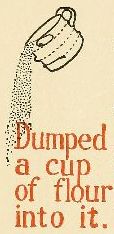
"Now," she went on, "rub the flour and lard together. Cover the lard with the flour. Yes, that's it! Now, rub them together until it seems like coarse powder. You could use a knife instead, chopping the lard all through."
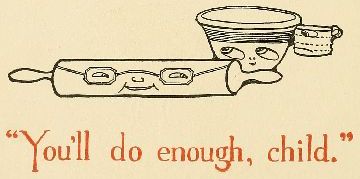
"That right?" asked Mary Frances, holding some[163] down for Aunty Rolling Pin to look at, since she couldn't see over the edge of Bowl.
"Yes, that is right," she answered. "Now, you may use a knife for stirring and pour just a little water in—oh, mercy! child! (as Mary Frances was about to throw in a quarter of a glass) not that way! Make a little 'well' in the flour. Pour in about one tablespoon of water. Mix well. Let that rest at one side and do the same thing in another place, and then another, finally stirring all together into one big ball.
"That's just right!" as Mary Frances lifted up the paste.
"Now, sift a little flour on the board and—oh, how many tarts are you going to make?"
"Six."
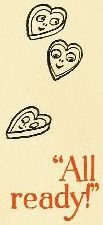
"All right. Cut the paste into five even pieces, and with me (Mary Frances laughed, Aunty Rolling Pin seemed so pleased) roll out each piece about one-eighth of an inch thick. After cutting out, save all the left-over trimmings to use for the last one. Plates ready?"
"All ready!" answered the little heart-shaped Tart Plates.
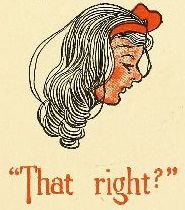
"How do I make a pretty border?" asked Mary[164] Frances, cutting the trimmings from the edge of Tart Plate with a knife held upright along the edge.
Fork came dancing from the edge of the table.
"Oh, I remember!" said Mary Frances, pressing the prongs into the outer edge of the crust.
"They're grand!" chuckled Aunty Rolling Pin. "Can you bake them? You need a very hot oven to bake them."
"But the cherries!" said Mary Frances, glad to think she had caught Aunty Rolling Pin in an oversight.
"Not until the pastry's cooked, child," said Aunty Rolling Pin, with a smile.
Mary Frances slipped the little plates into the oven, and made room on the table to place the dinner as she prepared it.
In a short fifteen minutes the tarts were ready.
"Aren't they sweet!" the little girl exclaimed. "My! I wish they were thought to be very good for children!"
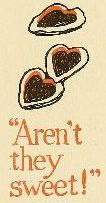
"What's for dinner?" asked Tea Kettle, anxiously.
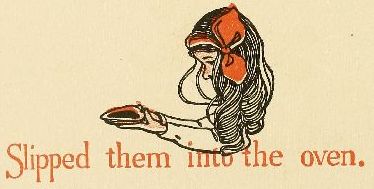
"I'll tell you," said Mary Frances, "I've written out the[165]
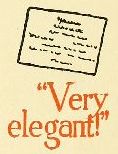
"Very elegant!—but that's a lot to do, isn't it?" said Tea Kettle. "Perhaps, if you read over all the new recipes, and we talk them over when its each one's turn to commence, we can work better."
"Oh, thank you, Tea Kettle," said Mary Frances, "that is a very bright idea." Tea Kettle glistened.
"I'll read them," continued Mary Frances, "as they come in the book."

"I have the lettuce well washed, and the tomatoes sliced. All I have to do is to dry the lettuce at dinner time, and soon I can make the[166]
| 1 teaspoon salt |
| ¾ teaspoon mustard |
| 1½ tablespoons sugar |
| 2 teaspoons flour |
| ¾ cup sour cream (or milk) |
| 1 egg |
| 1 tablespoon vinegar |
| 1 teaspoon butter |
| A few grains of red pepper. |
1. Beat egg.
2. Mix mustard, sugar, flour, salt and pepper.
3. Add egg slowly, beating well at the same time.
4. Add milk. Beat.
5. Cook in a sauce pan placed in boiling water.
6. Stir until it thickens like cream. Remove from heat at once.
7. Add vinegar very slowly, beating all the while.
8. Stir in the butter.
Serve cold on lettuce or sliced tomatoes.
"If this is cooked too long, it will 'curdle' or the be egg will become hard and separate," said Sauce Pan; "but I'll be careful. Now I'm ready for work."
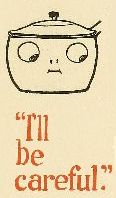
Mary Frances laughed. "Thank you, Sauce Pan," she said, as he began to move around, going hither and thither.
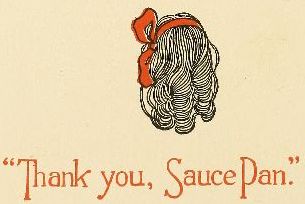
"The next recipes are[167]
1. Cut in half and wash well a young green cabbage.
2. Cut out and throw away the hard stem part.
3. Make ready a kettle of boiling water. Put in cabbage. Leave uncovered.
4. When the water boils, throw in 1 teaspoon salt and ¼ teaspoon baking soda (or bicarbonate of soda).
5. Boil gently about half hour, or until it begins to lose its bright green color. Lift out with skimmer.
6. Pour over it White Sauce just before serving.
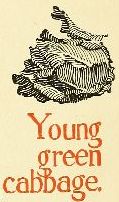
1. Cut slices of stale bread into squares of about one half inch.
2. For 2 cups bread, allow
| 1 pint milk (2 cups) |
| 2 tablespoons sugar |
| 2 eggs |
| ¼ teaspoon vanilla |
3. Moisten bread with hot water.
4. Butter pudding dish.
5. Put into it the moistened bread.
6. Beat yolks of eggs; add sugar; add milk.
7. Pour this over the bread.
8. Beat whites of eggs. Add 2 tablespoons powdered sugar. Beat well.
9. Spread this over top of pudding.
10. Bake in moderate oven one half hour.
11. Serve with Hard Sauce or cream.
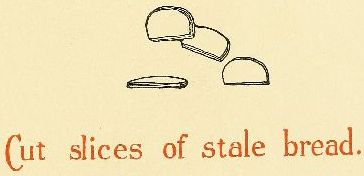
Slice bananas over top of Bread Pudding before spreading on whites of eggs (No. 37).
Serve with cream or Hard Sauce.
| 4 tablespoons soft butter |
| ¾ cup powdered sugar |
| ½ teaspoon vanilla |
| beaten white of 1 egg |
1. Make bowl and spoon hot with boiling water.
2. "Cream" or rub butter and sugar together, adding sugar by spoonfuls.
3. Add vanilla.
4. Beat in the white of egg.
5. Put in a cool place until needed.

"Yes," said Baking Dish, "that is very nice; but if you use the yolk of the egg in the pudding, it will save it, and make the pudding better."
"To save a yolk, all you have to do (it was little Egg Beater) is to drop it into a cup and pour a little cold water over the top, to prevent its drying. You can use it next day, if you keep it cool."
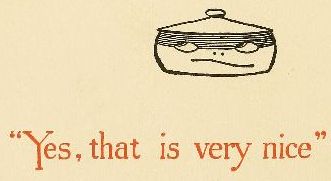
"It is wonderful," said Mary Frances, "what you Kitchen People know. If it weren't for your help, I'd[169] be afraid to try to get this dinner. I'd have to make only one thing a day, as Mother meant me to do."
All the Kitchen People smiled happily.
"Is that the last recipe?" asked Frying Pan.
"No," said Mary Frances. "Why, who are you?"
"I'm Frying Pan, of the great Pan family, if you please, Miss," answered he.
"Well! Well! Good friend," smiled Mary Frances, looking at her book, "your turn has come!"
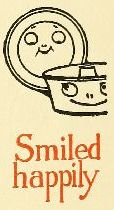
1. Heat an empty frying pan to blue heat, or until it smokes. No greasing is necessary.
2. Put in the steak.
3. Cook half minute.
4. Turn on other side.
5. Cook about 4 minutes.
6. Turn, and cook about 5 minutes longer.
7. Place on a hot platter, and spread with butter.
8. Sprinkle with a little pepper and salt, and 1 tablespoon finely chopped parsley.
9. Squeeze over it a little lemon juice.
10. Cover with another platter.
11. Remove top platter just before serving.
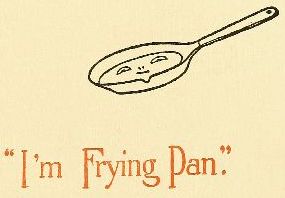
"That's it!" cried Frying Pan, delighted. "That's as good as broiling, though it took people a long time to find it out."
"It is not!" cried Gridiron Broiler angrily clicking his wires. "It is not, Spider!"
"For shame!" said Mary Frances. "Don't call names!"
"He isn't calling names," answered Frying Pan, "that's my other name, Frying Pan Spider."
Then to Gridiron he added, "Come, don't let's quarrel, you'll admit pan-broiling is very nearly as good for chops as broiling over the coals in a broiler, and quite as good for steaks—nearly."
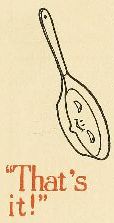
"I was just getting ready to say," said Gridiron, "you didn't mean 'quite.'"
"It's time to commence!" loudly struck in Mantel Clock.
And then Mary Frances looked on in amazement.
In walked Basket with the potatoes for the potato soup; up sprang Knife ready to pare them; over ran Boiler Pan with some water.
"Why! Why!" exclaimed Mary Frances. "Why!"
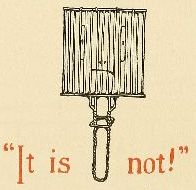
"Yes!" said Tea Kettle, "we'll do everything in[171] the recipes you've already made. All you need to do is to make the new recipes—with our help," which Mary Frances did.
Whenever she'd make a mistake, some one of the Kitchen People would correct and help her.
At six o'clock all the dinner was ready to serve, and the table was set.
"Oh, thank you, dear Kitchen People," said the beaming little girl; "this is the happiest time of my life."
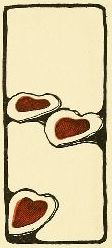
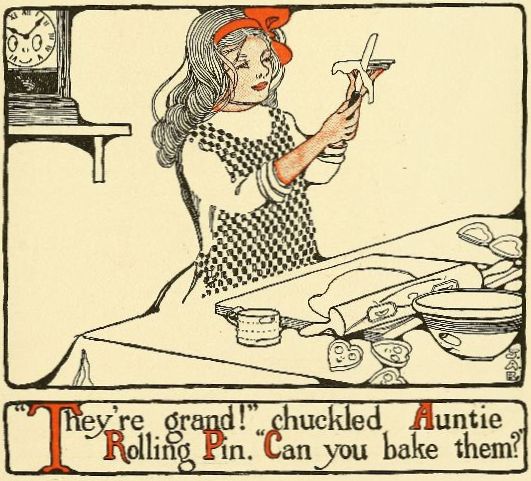
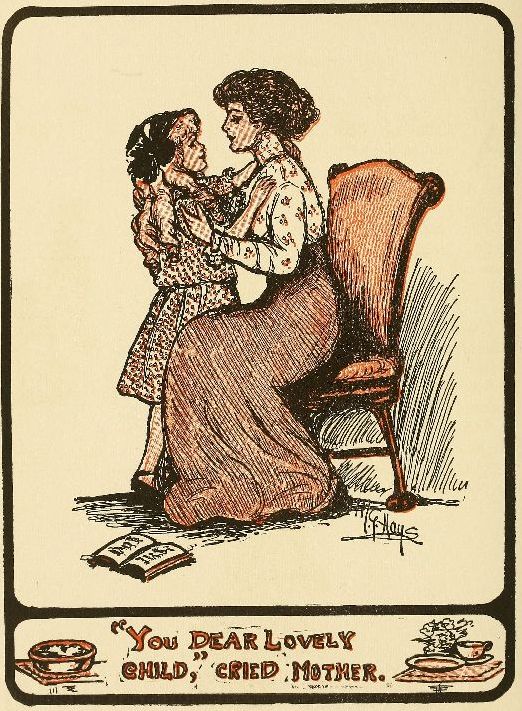
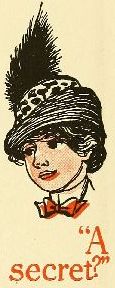
"Oh, Mother!" cried Mary Frances; "you dear, darling Mother! What a 'cry-baby' I am!" (as the tears rolled down her cheeks, and Mother kissed her and Billy and Father again and again) "What a 'cry-baby!'"
"Which she is not!" declared Billy. "Tell Mother,—Mary Frances, I can't wait for you to tell your secret!"
"A secret?" smiled Mother. "A secret, Mary Frances?"
"Oh, how good something smells!" said Mother. "It makes me hungry."
"Come right out, then," said Mary Frances, bowing, "Dinner is Served."
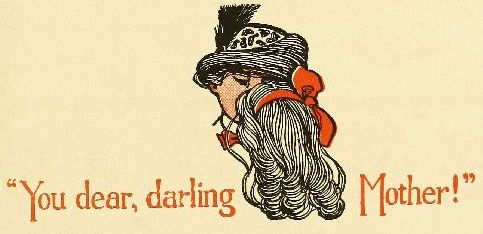
"Here?" asked her mother. "I im-ag-ined we'd go over to Aunt Maria's."
"No, Mother, dear," laughed Mary Frances, happily; "it's the 'surprise' for you." And they went into the dining-room.
"Wh—wh—why! how did this happen?" asked Mother. "Where did this feast come from?"
Everybody laughed and talked at the same time.
"Mary Frances is guilty," laughed Billy; and Mary Frances "owned up."
"Mother," said she, bringing her worn and somewhat soiled little cook book and putting it in her Mother's lap, "I've made everything! I've gone 'all through' my book! I got dinner to-night!—that's your surprise."
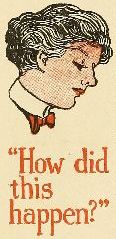
"My own dear, lovely child!" said Mother. "You dear, precious baby-woman!" And taking Mary Frances in her lap, she hugged and kissed her again and again.
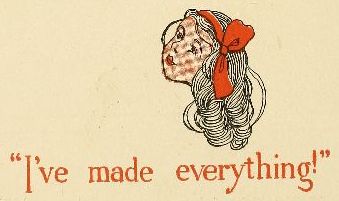
"I'm awfully sorry I couldn't exactly explain about you—you dear Kitchen People," whispered Mary Frances, going out to bid them good-night. "If it[175] hadn't been for you, I never, never could have done it,—my dear, dear, friends."
"You'll not need us soon again," said Tea Kettle, sadly. "We're sorry—yet we're glad that your mother will take our place as teacher now."
"Will you help me when I do need you?" asked Mary Frances.
"When you do," they promised, and she threw them a kiss.
"Good-night, little Miss," they cried; and when she turned round again, they looked just like any or-din-ary kitchen utensils.
For a minute she felt very lonely; then, remembering, she said gladly, "But they promised!"
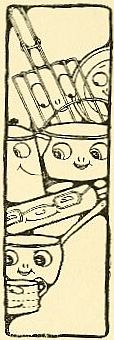
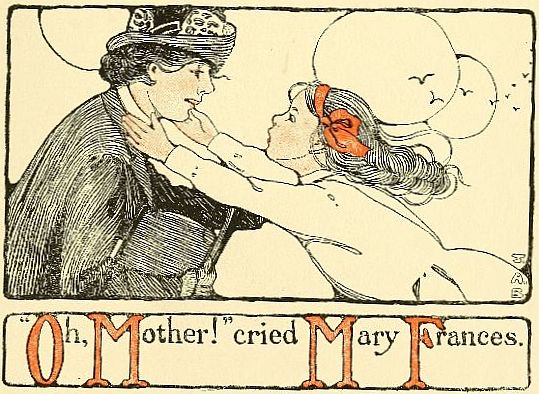
Obvious punctuation errors repaired.
Page vii, "Buscuits" changed to "Biscuits" (Baking Powder Biscuits)
End of Project Gutenberg's The Mary Frances Cook Book, by Jane Earye Fryer
*** END OF THIS PROJECT GUTENBERG EBOOK THE MARY FRANCES COOK BOOK ***
***** This file should be named 38215-h.htm or 38215-h.zip *****
This and all associated files of various formats will be found in:
https://www.gutenberg.org/3/8/2/1/38215/
Produced by Jason Isbell, Emmy and the Online Distributed
Proofreading Team at https://www.pgdp.net
Updated editions will replace the previous one--the old editions
will be renamed.
Creating the works from public domain print editions means that no
one owns a United States copyright in these works, so the Foundation
(and you!) can copy and distribute it in the United States without
permission and without paying copyright royalties. Special rules,
set forth in the General Terms of Use part of this license, apply to
copying and distributing Project Gutenberg-tm electronic works to
protect the PROJECT GUTENBERG-tm concept and trademark. Project
Gutenberg is a registered trademark, and may not be used if you
charge for the eBooks, unless you receive specific permission. If you
do not charge anything for copies of this eBook, complying with the
rules is very easy. You may use this eBook for nearly any purpose
such as creation of derivative works, reports, performances and
research. They may be modified and printed and given away--you may do
practically ANYTHING with public domain eBooks. Redistribution is
subject to the trademark license, especially commercial
redistribution.
*** START: FULL LICENSE ***
THE FULL PROJECT GUTENBERG LICENSE
PLEASE READ THIS BEFORE YOU DISTRIBUTE OR USE THIS WORK
To protect the Project Gutenberg-tm mission of promoting the free
distribution of electronic works, by using or distributing this work
(or any other work associated in any way with the phrase "Project
Gutenberg"), you agree to comply with all the terms of the Full Project
Gutenberg-tm License (available with this file or online at
https://gutenberg.org/license).
Section 1. General Terms of Use and Redistributing Project Gutenberg-tm
electronic works
1.A. By reading or using any part of this Project Gutenberg-tm
electronic work, you indicate that you have read, understand, agree to
and accept all the terms of this license and intellectual property
(trademark/copyright) agreement. If you do not agree to abide by all
the terms of this agreement, you must cease using and return or destroy
all copies of Project Gutenberg-tm electronic works in your possession.
If you paid a fee for obtaining a copy of or access to a Project
Gutenberg-tm electronic work and you do not agree to be bound by the
terms of this agreement, you may obtain a refund from the person or
entity to whom you paid the fee as set forth in paragraph 1.E.8.
1.B. "Project Gutenberg" is a registered trademark. It may only be
used on or associated in any way with an electronic work by people who
agree to be bound by the terms of this agreement. There are a few
things that you can do with most Project Gutenberg-tm electronic works
even without complying with the full terms of this agreement. See
paragraph 1.C below. There are a lot of things you can do with Project
Gutenberg-tm electronic works if you follow the terms of this agreement
and help preserve free future access to Project Gutenberg-tm electronic
works. See paragraph 1.E below.
1.C. The Project Gutenberg Literary Archive Foundation ("the Foundation"
or PGLAF), owns a compilation copyright in the collection of Project
Gutenberg-tm electronic works. Nearly all the individual works in the
collection are in the public domain in the United States. If an
individual work is in the public domain in the United States and you are
located in the United States, we do not claim a right to prevent you from
copying, distributing, performing, displaying or creating derivative
works based on the work as long as all references to Project Gutenberg
are removed. Of course, we hope that you will support the Project
Gutenberg-tm mission of promoting free access to electronic works by
freely sharing Project Gutenberg-tm works in compliance with the terms of
this agreement for keeping the Project Gutenberg-tm name associated with
the work. You can easily comply with the terms of this agreement by
keeping this work in the same format with its attached full Project
Gutenberg-tm License when you share it without charge with others.
1.D. The copyright laws of the place where you are located also govern
what you can do with this work. Copyright laws in most countries are in
a constant state of change. If you are outside the United States, check
the laws of your country in addition to the terms of this agreement
before downloading, copying, displaying, performing, distributing or
creating derivative works based on this work or any other Project
Gutenberg-tm work. The Foundation makes no representations concerning
the copyright status of any work in any country outside the United
States.
1.E. Unless you have removed all references to Project Gutenberg:
1.E.1. The following sentence, with active links to, or other immediate
access to, the full Project Gutenberg-tm License must appear prominently
whenever any copy of a Project Gutenberg-tm work (any work on which the
phrase "Project Gutenberg" appears, or with which the phrase "Project
Gutenberg" is associated) is accessed, displayed, performed, viewed,
copied or distributed:
This eBook is for the use of anyone anywhere at no cost and with
almost no restrictions whatsoever. You may copy it, give it away or
re-use it under the terms of the Project Gutenberg License included
with this eBook or online at www.gutenberg.org
1.E.2. If an individual Project Gutenberg-tm electronic work is derived
from the public domain (does not contain a notice indicating that it is
posted with permission of the copyright holder), the work can be copied
and distributed to anyone in the United States without paying any fees
or charges. If you are redistributing or providing access to a work
with the phrase "Project Gutenberg" associated with or appearing on the
work, you must comply either with the requirements of paragraphs 1.E.1
through 1.E.7 or obtain permission for the use of the work and the
Project Gutenberg-tm trademark as set forth in paragraphs 1.E.8 or
1.E.9.
1.E.3. If an individual Project Gutenberg-tm electronic work is posted
with the permission of the copyright holder, your use and distribution
must comply with both paragraphs 1.E.1 through 1.E.7 and any additional
terms imposed by the copyright holder. Additional terms will be linked
to the Project Gutenberg-tm License for all works posted with the
permission of the copyright holder found at the beginning of this work.
1.E.4. Do not unlink or detach or remove the full Project Gutenberg-tm
License terms from this work, or any files containing a part of this
work or any other work associated with Project Gutenberg-tm.
1.E.5. Do not copy, display, perform, distribute or redistribute this
electronic work, or any part of this electronic work, without
prominently displaying the sentence set forth in paragraph 1.E.1 with
active links or immediate access to the full terms of the Project
Gutenberg-tm License.
1.E.6. You may convert to and distribute this work in any binary,
compressed, marked up, nonproprietary or proprietary form, including any
word processing or hypertext form. However, if you provide access to or
distribute copies of a Project Gutenberg-tm work in a format other than
"Plain Vanilla ASCII" or other format used in the official version
posted on the official Project Gutenberg-tm web site (www.gutenberg.org),
you must, at no additional cost, fee or expense to the user, provide a
copy, a means of exporting a copy, or a means of obtaining a copy upon
request, of the work in its original "Plain Vanilla ASCII" or other
form. Any alternate format must include the full Project Gutenberg-tm
License as specified in paragraph 1.E.1.
1.E.7. Do not charge a fee for access to, viewing, displaying,
performing, copying or distributing any Project Gutenberg-tm works
unless you comply with paragraph 1.E.8 or 1.E.9.
1.E.8. You may charge a reasonable fee for copies of or providing
access to or distributing Project Gutenberg-tm electronic works provided
that
- You pay a royalty fee of 20% of the gross profits you derive from
the use of Project Gutenberg-tm works calculated using the method
you already use to calculate your applicable taxes. The fee is
owed to the owner of the Project Gutenberg-tm trademark, but he
has agreed to donate royalties under this paragraph to the
Project Gutenberg Literary Archive Foundation. Royalty payments
must be paid within 60 days following each date on which you
prepare (or are legally required to prepare) your periodic tax
returns. Royalty payments should be clearly marked as such and
sent to the Project Gutenberg Literary Archive Foundation at the
address specified in Section 4, "Information about donations to
the Project Gutenberg Literary Archive Foundation."
- You provide a full refund of any money paid by a user who notifies
you in writing (or by e-mail) within 30 days of receipt that s/he
does not agree to the terms of the full Project Gutenberg-tm
License. You must require such a user to return or
destroy all copies of the works possessed in a physical medium
and discontinue all use of and all access to other copies of
Project Gutenberg-tm works.
- You provide, in accordance with paragraph 1.F.3, a full refund of any
money paid for a work or a replacement copy, if a defect in the
electronic work is discovered and reported to you within 90 days
of receipt of the work.
- You comply with all other terms of this agreement for free
distribution of Project Gutenberg-tm works.
1.E.9. If you wish to charge a fee or distribute a Project Gutenberg-tm
electronic work or group of works on different terms than are set
forth in this agreement, you must obtain permission in writing from
both the Project Gutenberg Literary Archive Foundation and Michael
Hart, the owner of the Project Gutenberg-tm trademark. Contact the
Foundation as set forth in Section 3 below.
1.F.
1.F.1. Project Gutenberg volunteers and employees expend considerable
effort to identify, do copyright research on, transcribe and proofread
public domain works in creating the Project Gutenberg-tm
collection. Despite these efforts, Project Gutenberg-tm electronic
works, and the medium on which they may be stored, may contain
"Defects," such as, but not limited to, incomplete, inaccurate or
corrupt data, transcription errors, a copyright or other intellectual
property infringement, a defective or damaged disk or other medium, a
computer virus, or computer codes that damage or cannot be read by
your equipment.
1.F.2. LIMITED WARRANTY, DISCLAIMER OF DAMAGES - Except for the "Right
of Replacement or Refund" described in paragraph 1.F.3, the Project
Gutenberg Literary Archive Foundation, the owner of the Project
Gutenberg-tm trademark, and any other party distributing a Project
Gutenberg-tm electronic work under this agreement, disclaim all
liability to you for damages, costs and expenses, including legal
fees. YOU AGREE THAT YOU HAVE NO REMEDIES FOR NEGLIGENCE, STRICT
LIABILITY, BREACH OF WARRANTY OR BREACH OF CONTRACT EXCEPT THOSE
PROVIDED IN PARAGRAPH 1.F.3. YOU AGREE THAT THE FOUNDATION, THE
TRADEMARK OWNER, AND ANY DISTRIBUTOR UNDER THIS AGREEMENT WILL NOT BE
LIABLE TO YOU FOR ACTUAL, DIRECT, INDIRECT, CONSEQUENTIAL, PUNITIVE OR
INCIDENTAL DAMAGES EVEN IF YOU GIVE NOTICE OF THE POSSIBILITY OF SUCH
DAMAGE.
1.F.3. LIMITED RIGHT OF REPLACEMENT OR REFUND - If you discover a
defect in this electronic work within 90 days of receiving it, you can
receive a refund of the money (if any) you paid for it by sending a
written explanation to the person you received the work from. If you
received the work on a physical medium, you must return the medium with
your written explanation. The person or entity that provided you with
the defective work may elect to provide a replacement copy in lieu of a
refund. If you received the work electronically, the person or entity
providing it to you may choose to give you a second opportunity to
receive the work electronically in lieu of a refund. If the second copy
is also defective, you may demand a refund in writing without further
opportunities to fix the problem.
1.F.4. Except for the limited right of replacement or refund set forth
in paragraph 1.F.3, this work is provided to you 'AS-IS' WITH NO OTHER
WARRANTIES OF ANY KIND, EXPRESS OR IMPLIED, INCLUDING BUT NOT LIMITED TO
WARRANTIES OF MERCHANTIBILITY OR FITNESS FOR ANY PURPOSE.
1.F.5. Some states do not allow disclaimers of certain implied
warranties or the exclusion or limitation of certain types of damages.
If any disclaimer or limitation set forth in this agreement violates the
law of the state applicable to this agreement, the agreement shall be
interpreted to make the maximum disclaimer or limitation permitted by
the applicable state law. The invalidity or unenforceability of any
provision of this agreement shall not void the remaining provisions.
1.F.6. INDEMNITY - You agree to indemnify and hold the Foundation, the
trademark owner, any agent or employee of the Foundation, anyone
providing copies of Project Gutenberg-tm electronic works in accordance
with this agreement, and any volunteers associated with the production,
promotion and distribution of Project Gutenberg-tm electronic works,
harmless from all liability, costs and expenses, including legal fees,
that arise directly or indirectly from any of the following which you do
or cause to occur: (a) distribution of this or any Project Gutenberg-tm
work, (b) alteration, modification, or additions or deletions to any
Project Gutenberg-tm work, and (c) any Defect you cause.
Section 2. Information about the Mission of Project Gutenberg-tm
Project Gutenberg-tm is synonymous with the free distribution of
electronic works in formats readable by the widest variety of computers
including obsolete, old, middle-aged and new computers. It exists
because of the efforts of hundreds of volunteers and donations from
people in all walks of life.
Volunteers and financial support to provide volunteers with the
assistance they need are critical to reaching Project Gutenberg-tm's
goals and ensuring that the Project Gutenberg-tm collection will
remain freely available for generations to come. In 2001, the Project
Gutenberg Literary Archive Foundation was created to provide a secure
and permanent future for Project Gutenberg-tm and future generations.
To learn more about the Project Gutenberg Literary Archive Foundation
and how your efforts and donations can help, see Sections 3 and 4
and the Foundation web page at https://www.pglaf.org.
Section 3. Information about the Project Gutenberg Literary Archive
Foundation
The Project Gutenberg Literary Archive Foundation is a non profit
501(c)(3) educational corporation organized under the laws of the
state of Mississippi and granted tax exempt status by the Internal
Revenue Service. The Foundation's EIN or federal tax identification
number is 64-6221541. Its 501(c)(3) letter is posted at
https://pglaf.org/fundraising. Contributions to the Project Gutenberg
Literary Archive Foundation are tax deductible to the full extent
permitted by U.S. federal laws and your state's laws.
The Foundation's principal office is located at 4557 Melan Dr. S.
Fairbanks, AK, 99712., but its volunteers and employees are scattered
throughout numerous locations. Its business office is located at
809 North 1500 West, Salt Lake City, UT 84116, (801) 596-1887, email
business@pglaf.org. Email contact links and up to date contact
information can be found at the Foundation's web site and official
page at https://pglaf.org
For additional contact information:
Dr. Gregory B. Newby
Chief Executive and Director
gbnewby@pglaf.org
Section 4. Information about Donations to the Project Gutenberg
Literary Archive Foundation
Project Gutenberg-tm depends upon and cannot survive without wide
spread public support and donations to carry out its mission of
increasing the number of public domain and licensed works that can be
freely distributed in machine readable form accessible by the widest
array of equipment including outdated equipment. Many small donations
($1 to $5,000) are particularly important to maintaining tax exempt
status with the IRS.
The Foundation is committed to complying with the laws regulating
charities and charitable donations in all 50 states of the United
States. Compliance requirements are not uniform and it takes a
considerable effort, much paperwork and many fees to meet and keep up
with these requirements. We do not solicit donations in locations
where we have not received written confirmation of compliance. To
SEND DONATIONS or determine the status of compliance for any
particular state visit https://pglaf.org
While we cannot and do not solicit contributions from states where we
have not met the solicitation requirements, we know of no prohibition
against accepting unsolicited donations from donors in such states who
approach us with offers to donate.
International donations are gratefully accepted, but we cannot make
any statements concerning tax treatment of donations received from
outside the United States. U.S. laws alone swamp our small staff.
Please check the Project Gutenberg Web pages for current donation
methods and addresses. Donations are accepted in a number of other
ways including including checks, online payments and credit card
donations. To donate, please visit: https://pglaf.org/donate
Section 5. General Information About Project Gutenberg-tm electronic
works.
Professor Michael S. Hart was the originator of the Project Gutenberg-tm
concept of a library of electronic works that could be freely shared
with anyone. For thirty years, he produced and distributed Project
Gutenberg-tm eBooks with only a loose network of volunteer support.
Project Gutenberg-tm eBooks are often created from several printed
editions, all of which are confirmed as Public Domain in the U.S.
unless a copyright notice is included. Thus, we do not necessarily
keep eBooks in compliance with any particular paper edition.
Most people start at our Web site which has the main PG search facility:
https://www.gutenberg.org
This Web site includes information about Project Gutenberg-tm,
including how to make donations to the Project Gutenberg Literary
Archive Foundation, how to help produce our new eBooks, and how to
subscribe to our email newsletter to hear about new eBooks.